Sophisticated and stylish, poetic and timeless. Ostuni rises up from the rolling olive groves that surround it, a gleaming white oasis, framed by Puglia’s endless blue sky. With a vibrant bar and restaurant scene Ostuni is one of the most popular stops for visitors to our region. Loose yourself in its nooks and crannies as you explore the tangle of narrow streets and stairways of the centro storico. Its central location makes Ostuni the perfect home base for venturing into the Valle d’Itria and beyond.
On top of that, Ostuni is where we are based and meet up as a team over the summer months. We know it well!
In this Guide:
- 1. Where to eat | recommended bars and restaurants
- Ostuni Bistrot | restaurant
- Al Solito Posto – Ristorante Pizzeria
- Casa San Giacomo | restaurant
- Gabó | restaurant, lounge bar
- Osteria Monacelle | restaurant
- Caffè Fanelli Bistrot | bar
- Borgo Antico Bistrot | bar
- Les cre’ fantastique | panzerotti eat in
- Asso di Spade | panzerotti to go
- Gelaterie | for gelato artigianale
- Ostuni outskirts
- Where we avoid
- 2. Life’s a beach | the best beaches nearby Ostuni and beyond
- 3. La città bianca, Puglia's White City | what to see and do
- 4. The best time to visit Ostuni
- 5. Aperitivo time | the best value Aperol Spritz on Ostuni’s main piazza
- 6. Day trip planning and road trips from Ostuni
- 7. Adding value to your Ostuni vacation
- 8. Eating in | food and wine shopping
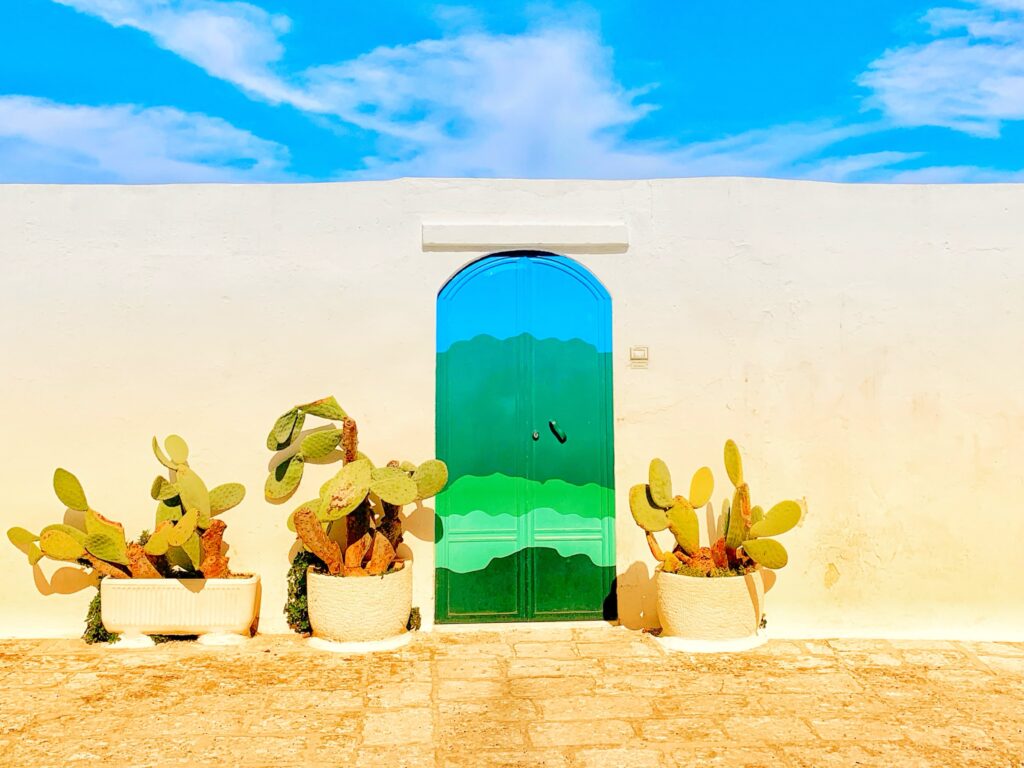
1. Where to eat | recommended bars and restaurants
The choice of dining experiences in Ostuni during the summer season seems endless. Excellent restaurants and chic bars are tucked away in the maze of medieval alleys, arches and stairwells of the old town that shoot out from via Cattedrale and wind around the duomo and the old town walls.
While bad food is hard to find some restaurants offer better value than others. Many restaurants regularly recommended on travel forums are recommended by tourists and visited by more tourists, even though locals would not eat there. The food and dining experience may be good, but if it is comparatively overpriced without any added value, we haven’t included it.
We eat where locals eat and we pay for all our meals and review anonymously.
Ostuni Bistrot | restaurant
Family run restaurant serving traditional local dishes, offering good food and great value. Osteria Ostuni Bistrot is our favourite Ostuni lunch spot. We are regular visitors and always take visiting friends.
The restaurant is located adjacent to the main piazza (📍Piazza della Libertà, 5) with a larger seating area on the main piazza. There is also a comfortable, air-conditioned inside seating area. We usually walk-in, without booking. But in summer, we will ask them to hold a table for us when we are passing by.
The seating area on the piazza is next to the seating area of another restaurant called ‘Petit Bistrot’ (Codice a Barre). Do not confuse one with the other. Ostuni Bistrot is where we want to eat (📍Ostuni Bistrot seating area). Their menu looks like this:
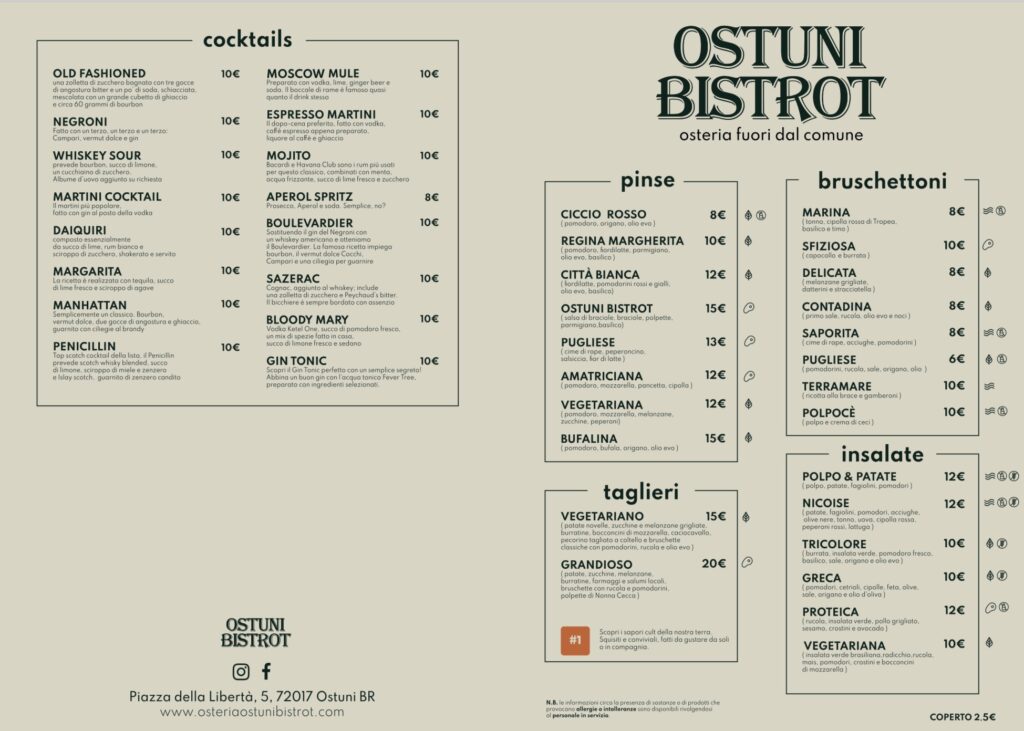
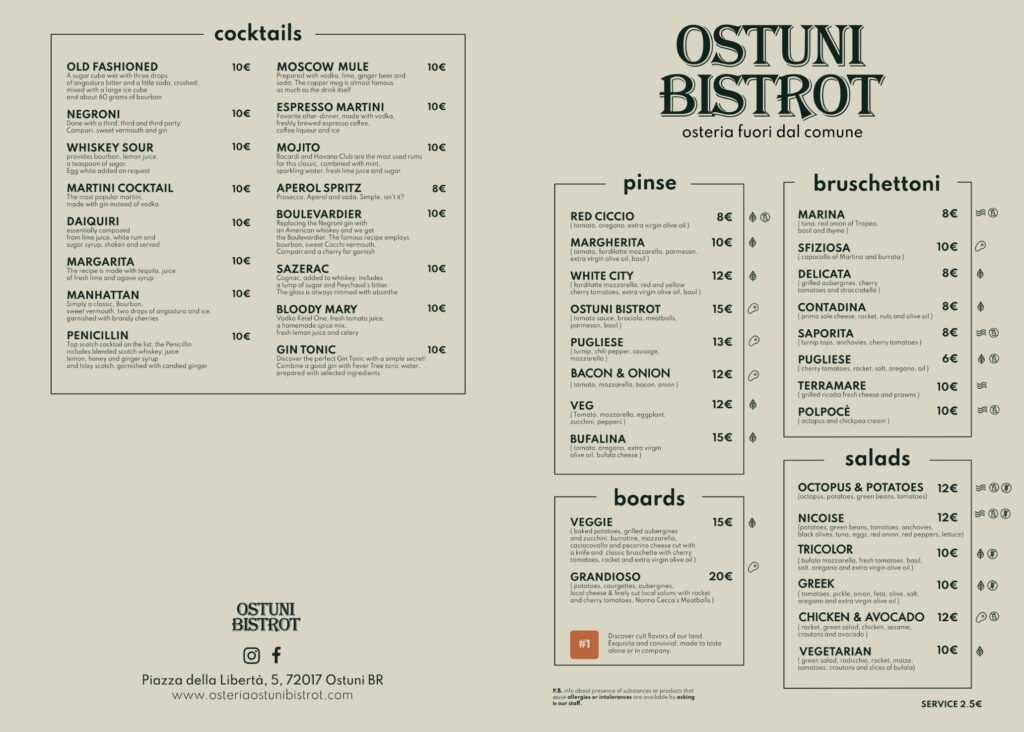
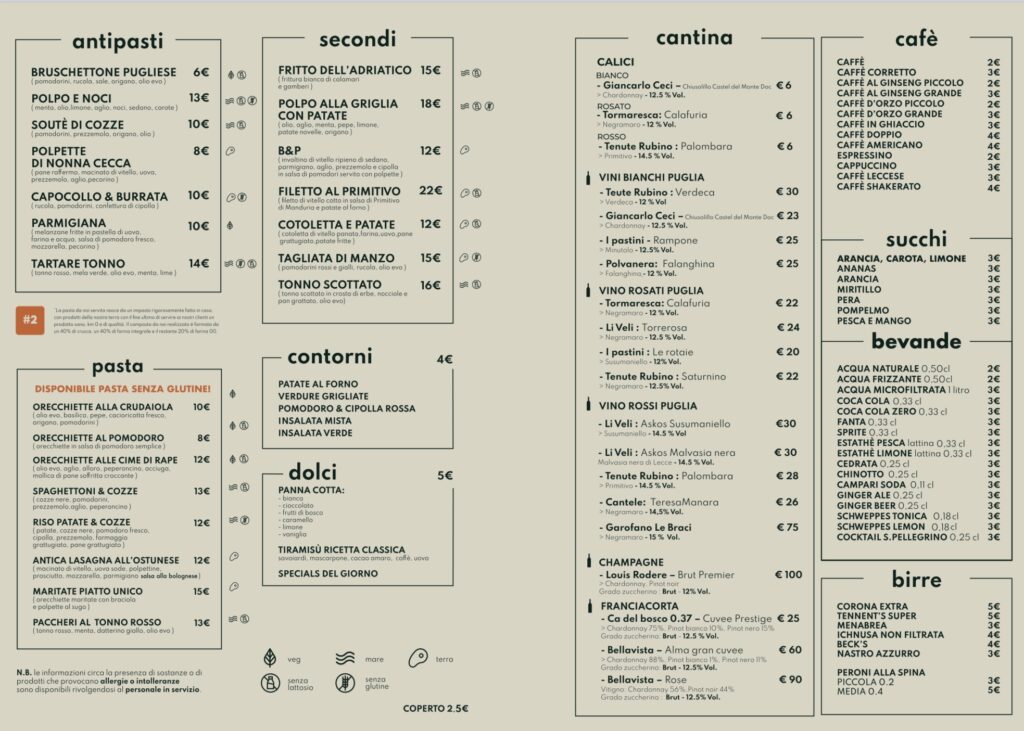
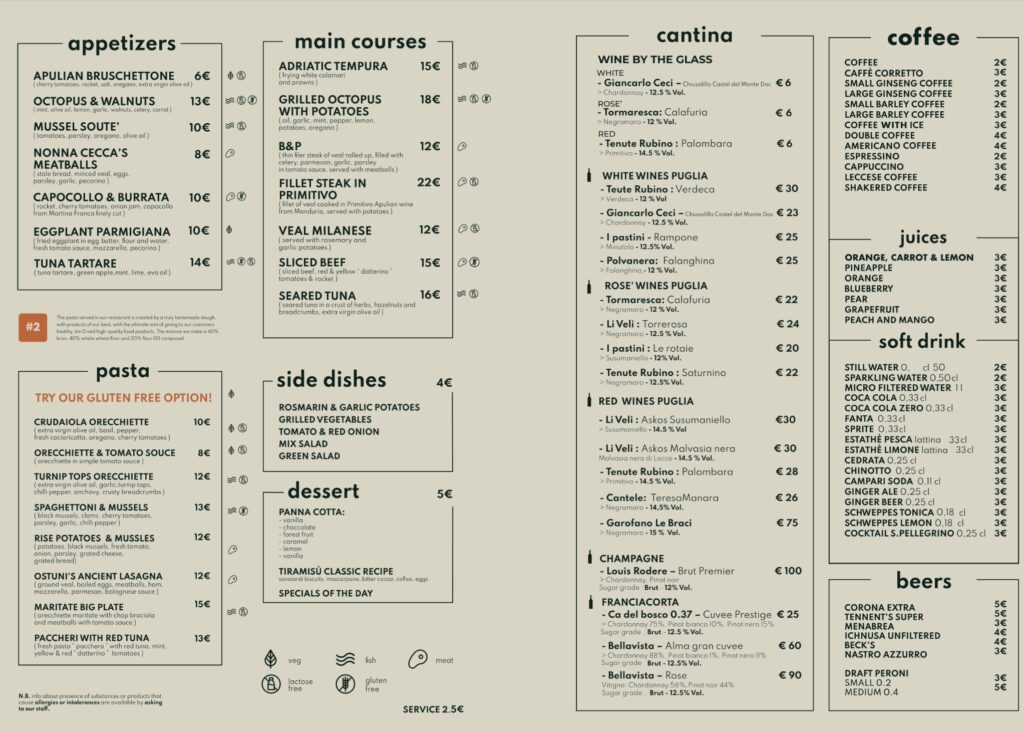
Pinsa | Unlike traditional pizza, which can be heavy and greasy, a pinsa is a lighter version perfect for lunch.
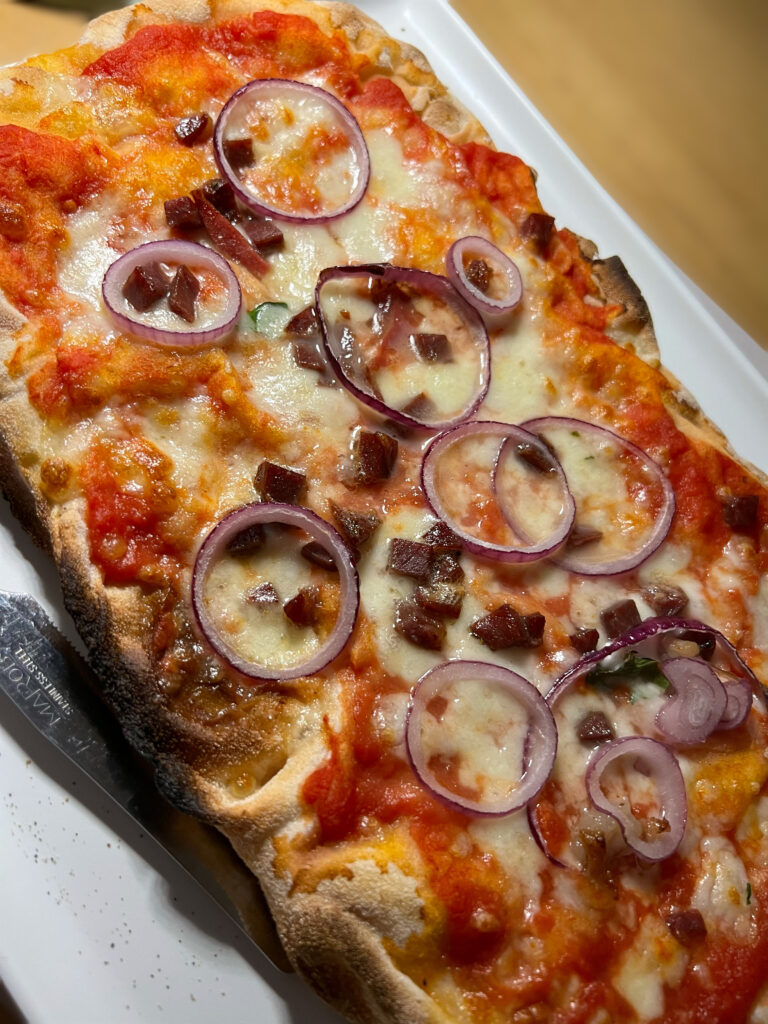
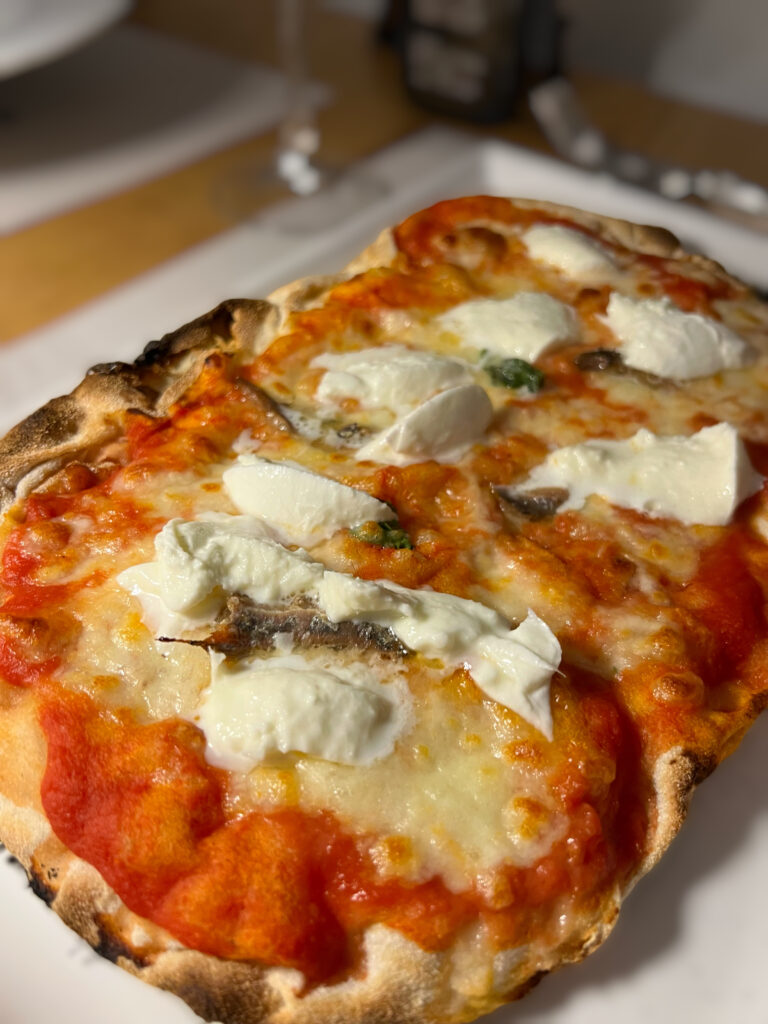
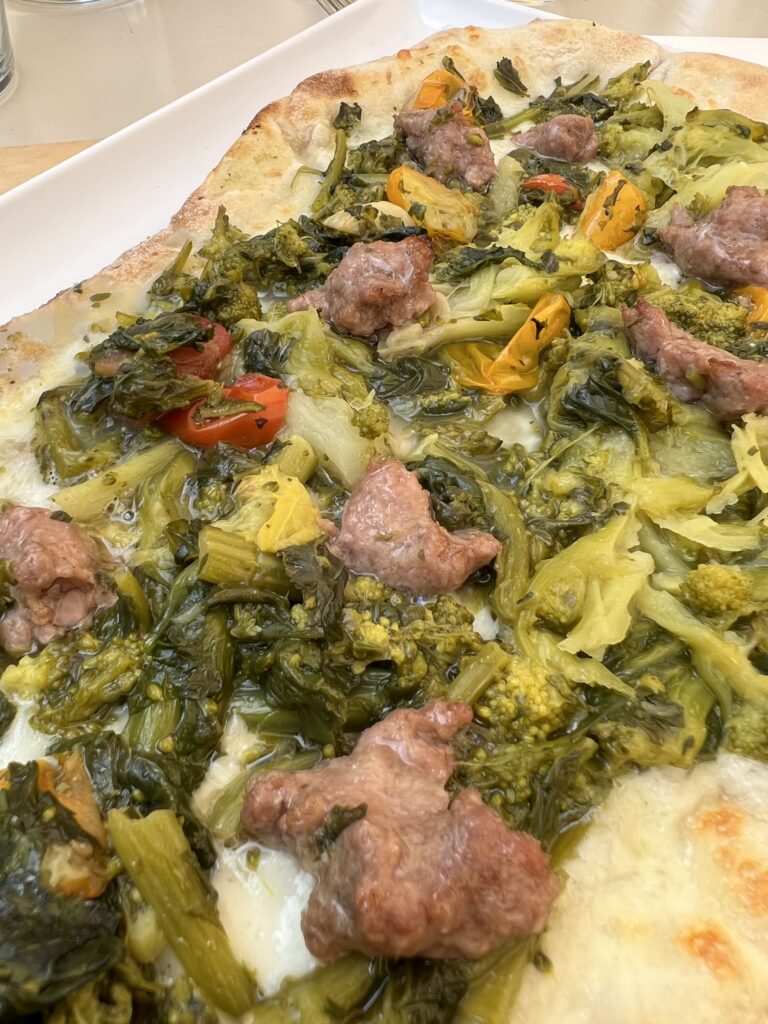
Taglieri | A charcuterie style sharing board. Generous and perfect as a shared appetiser for 3-4 people. If you want to change the balance of one of the boards for more vegetarian or meat choices, consider ordering one or the other with a side of polpette or bruschettoni.
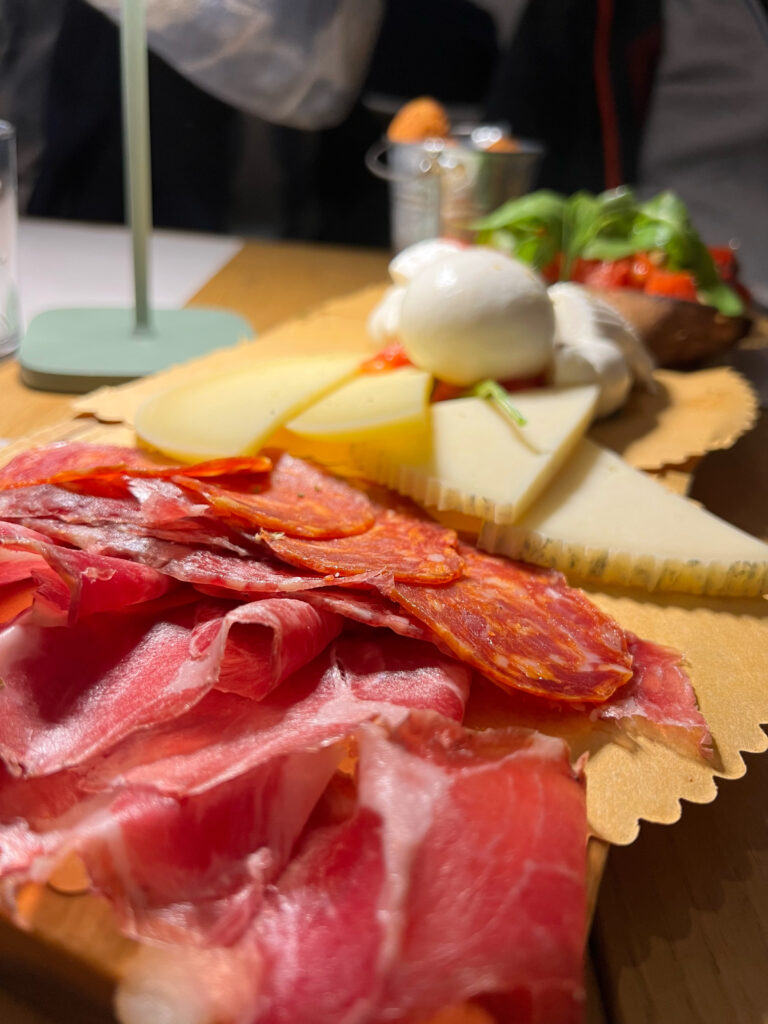
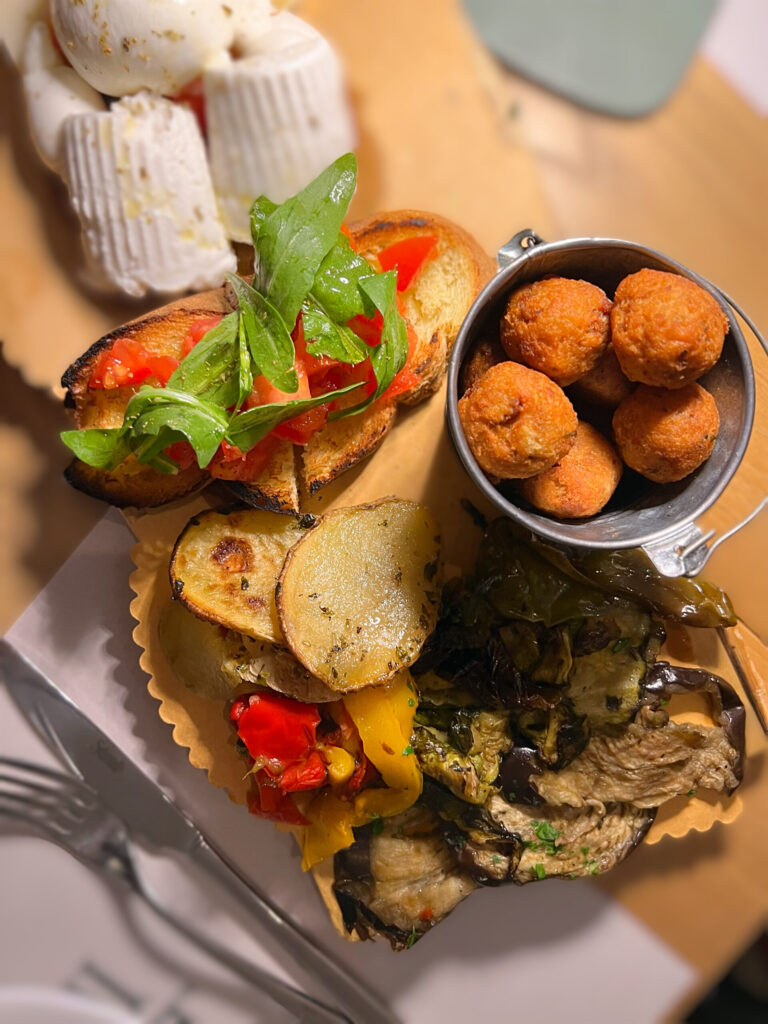
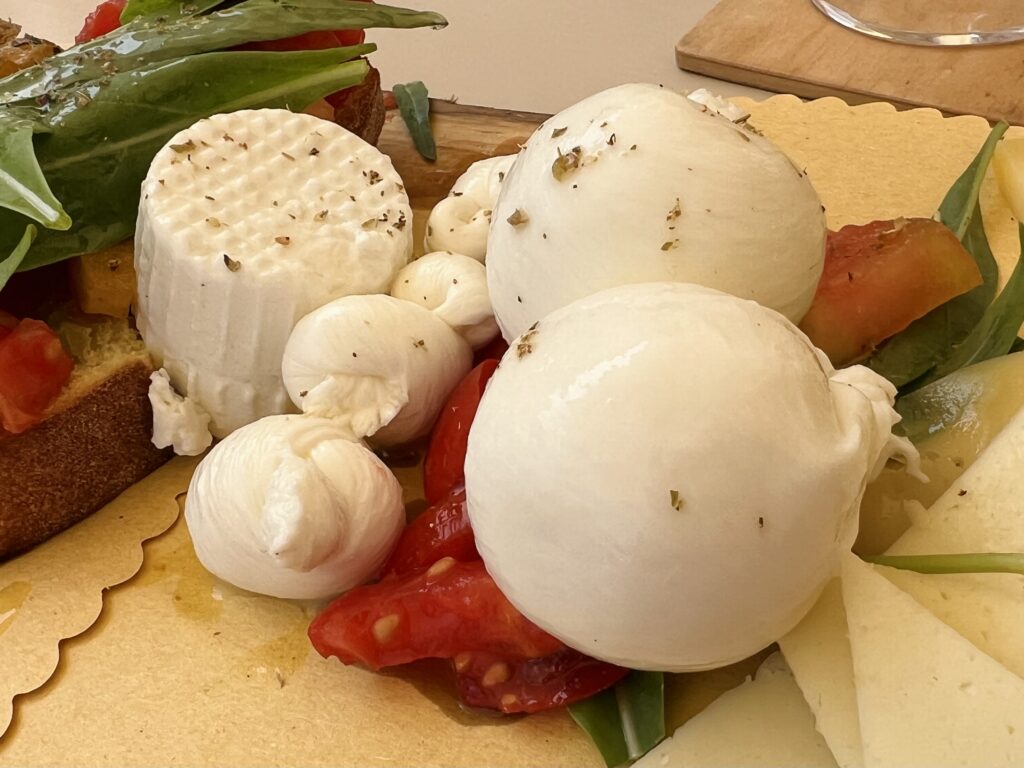
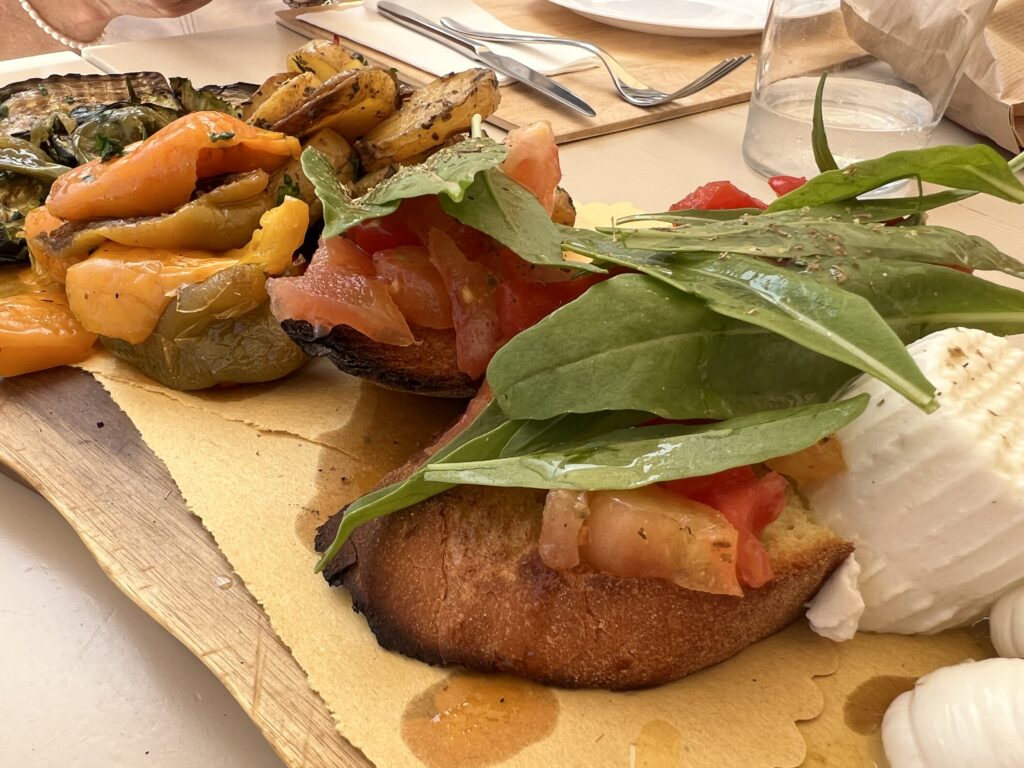
Bruschettoni | Smaller than bruschette, a crisp and light starter.
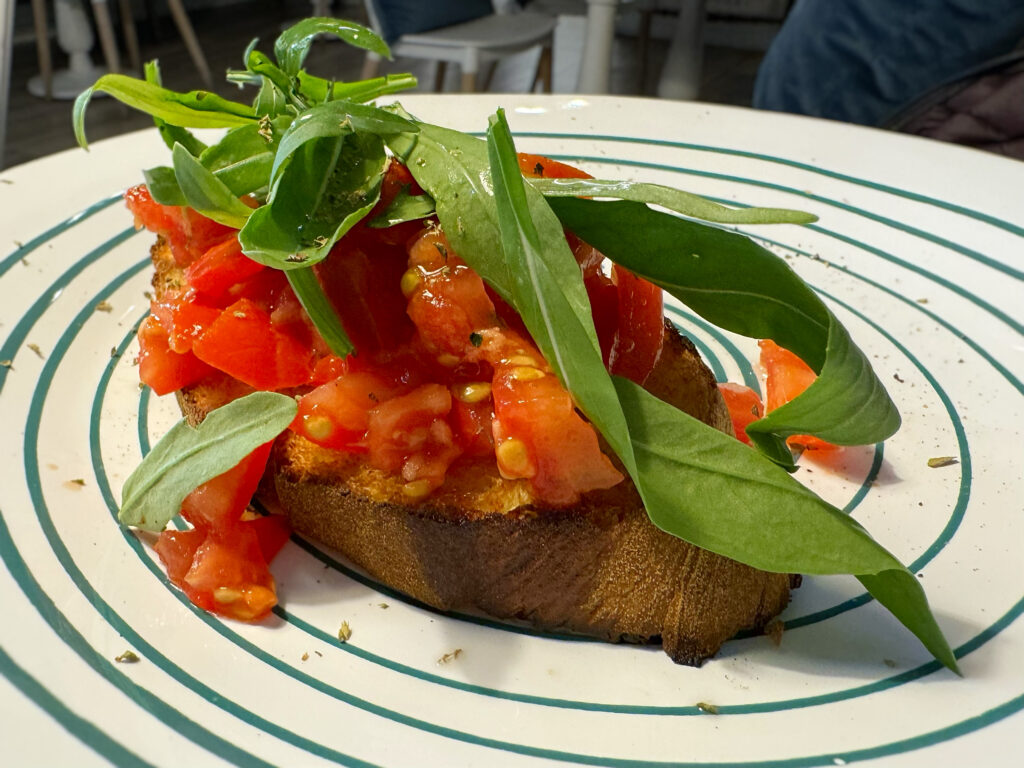
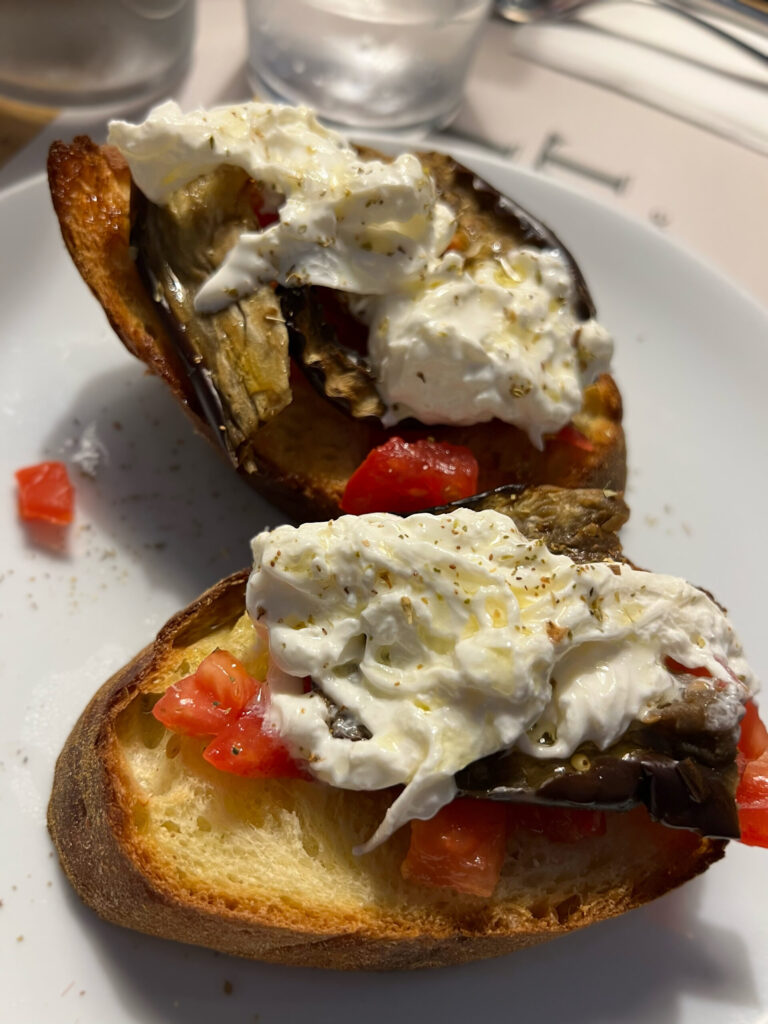
Insalata | Polpo and patate (potato and octopus) salad.
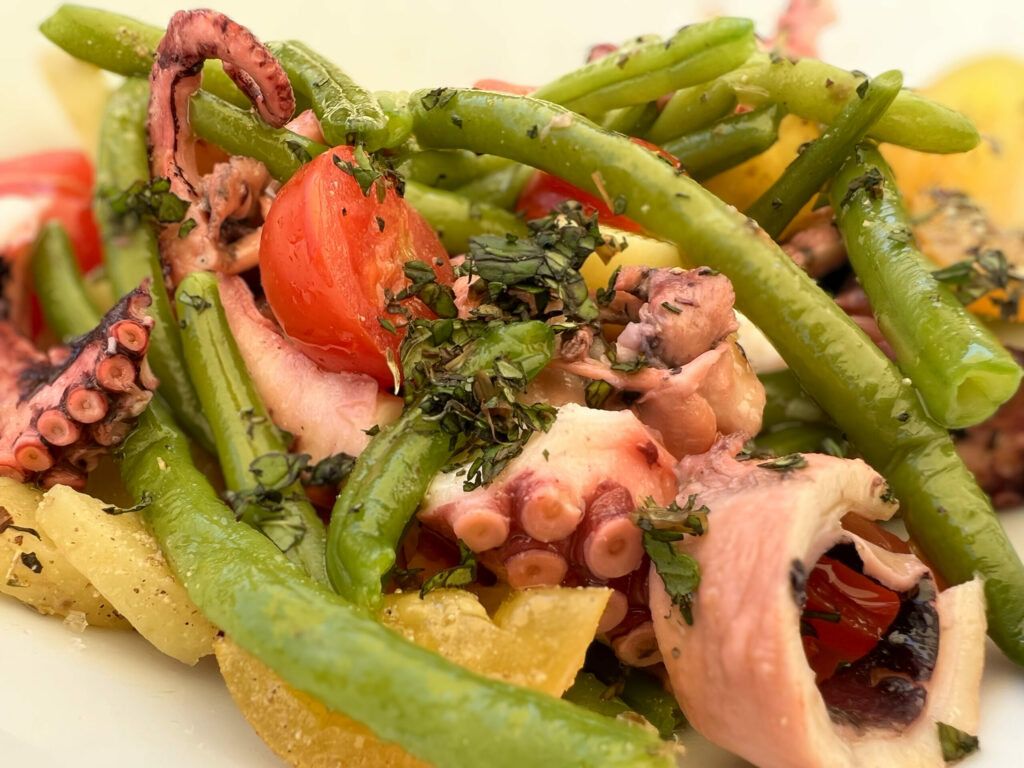
Antipasti | To nibble on we sometimes order polpette (traditional deep-fried bread and veal meatballs, light and crispy). The parmigiana is also delicious. Fave e cicoria (a fava bean puree) is not always on the menu, due to its seasonality. But you could always ask, as it is a great vegetarian option.
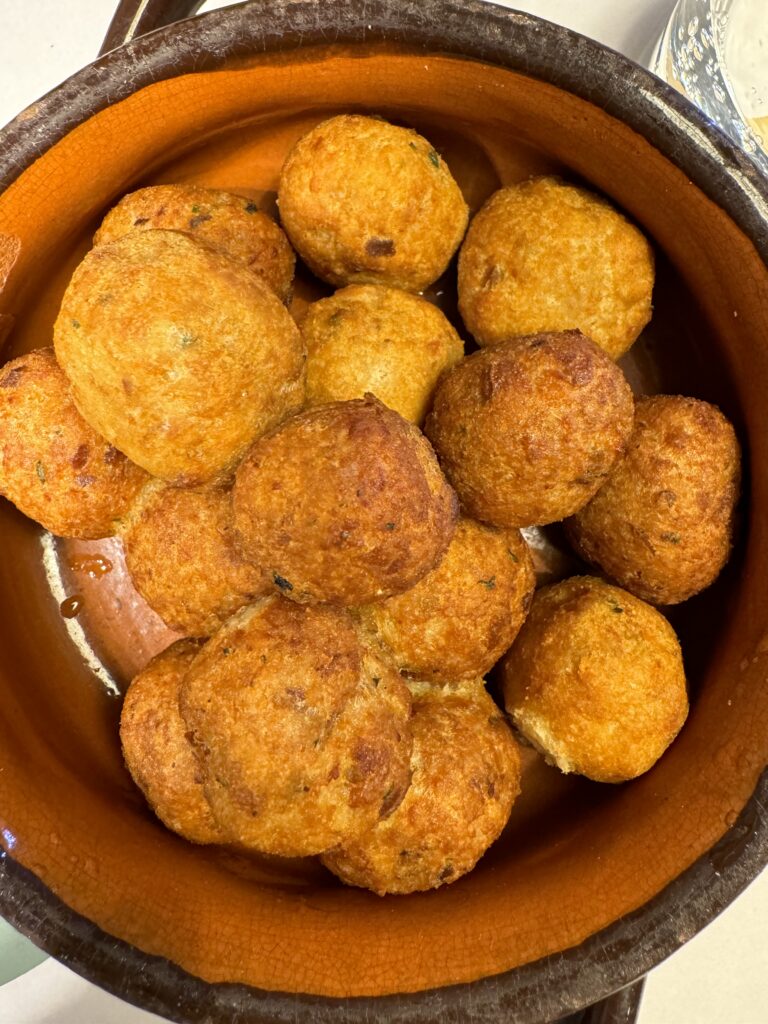
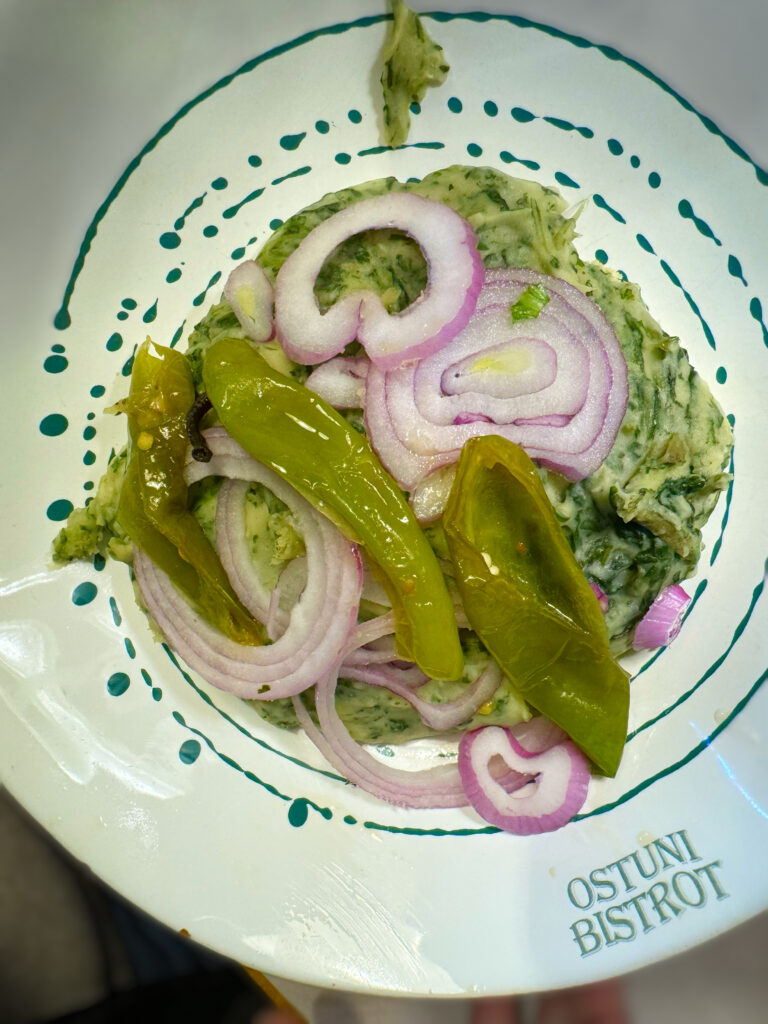
Pasta | In summer we often have the orecchiette alla crudaiola, a lighter pasta dish with fresh tomato and topped with cacioricotta cheese. Eat it inside, or outside.
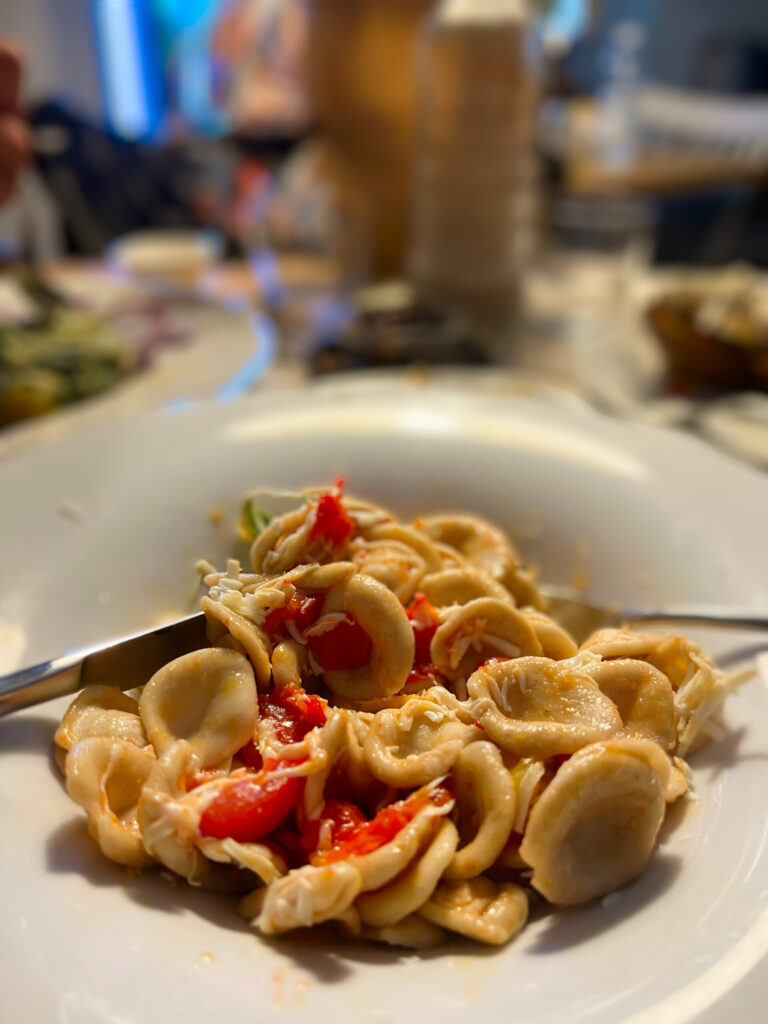
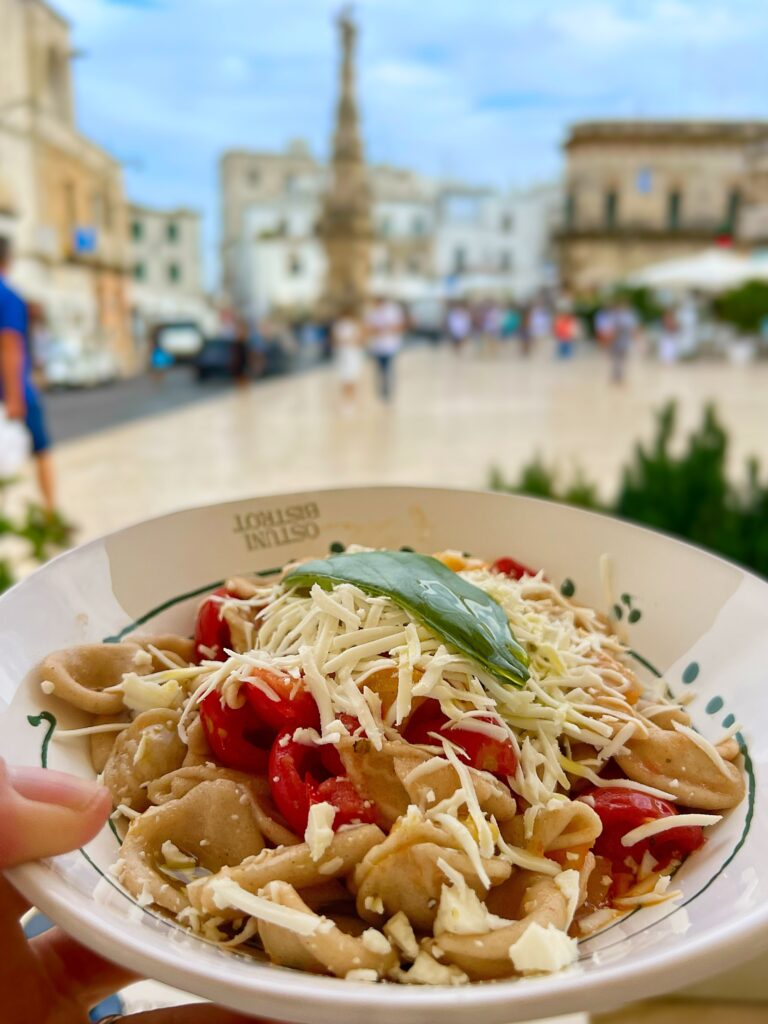
Orecchiette al pomodoro is served in a traditional tomato sauce. The orecchiette alle cime di rape is perhaps Puglia’s most traditional dish. Cime di rape (often translated as turnip tops, though in fact they more closely resemble tenderstem broccoli albeit bitter and with a softer texture) is a bitter green. The Ostuni Bistrot version is not as bitter as some we have tasted.
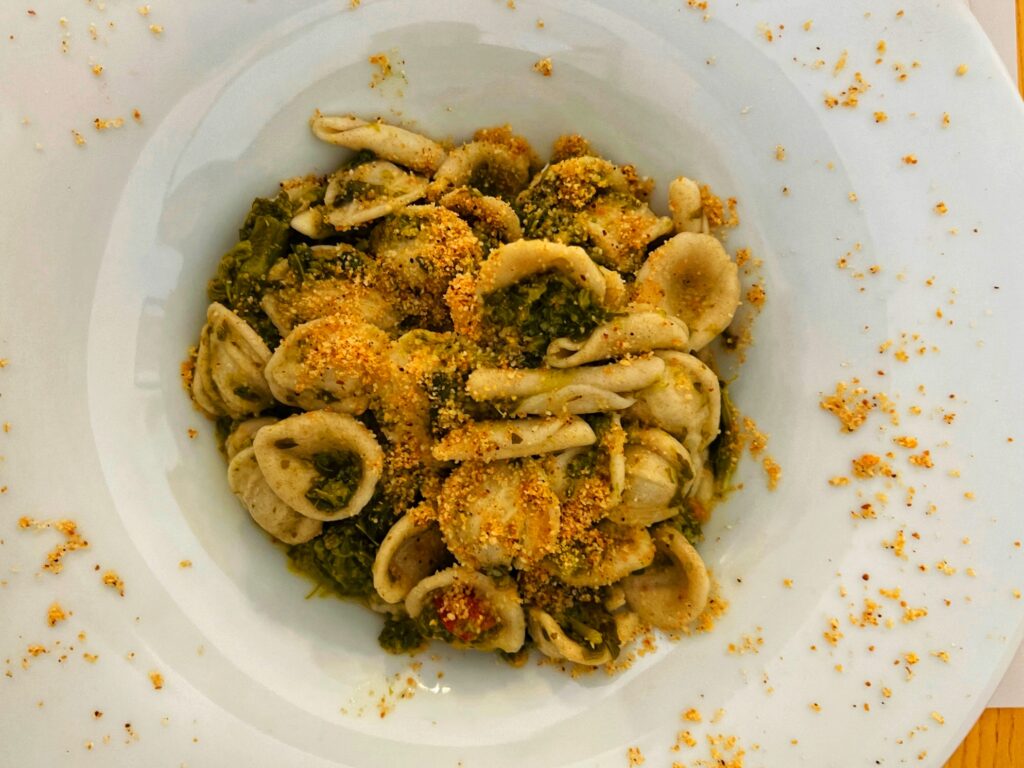
Spaghettoni and cozze (mussels) is another dish we visit often. Don’t ask for Parmesan with it – you will be politely told that the cheese overpowers the delicate seafood! Riso, patate e cozze is a traditional Bari dish with a comforting double carb hit of layered potato and rice, with mussels.
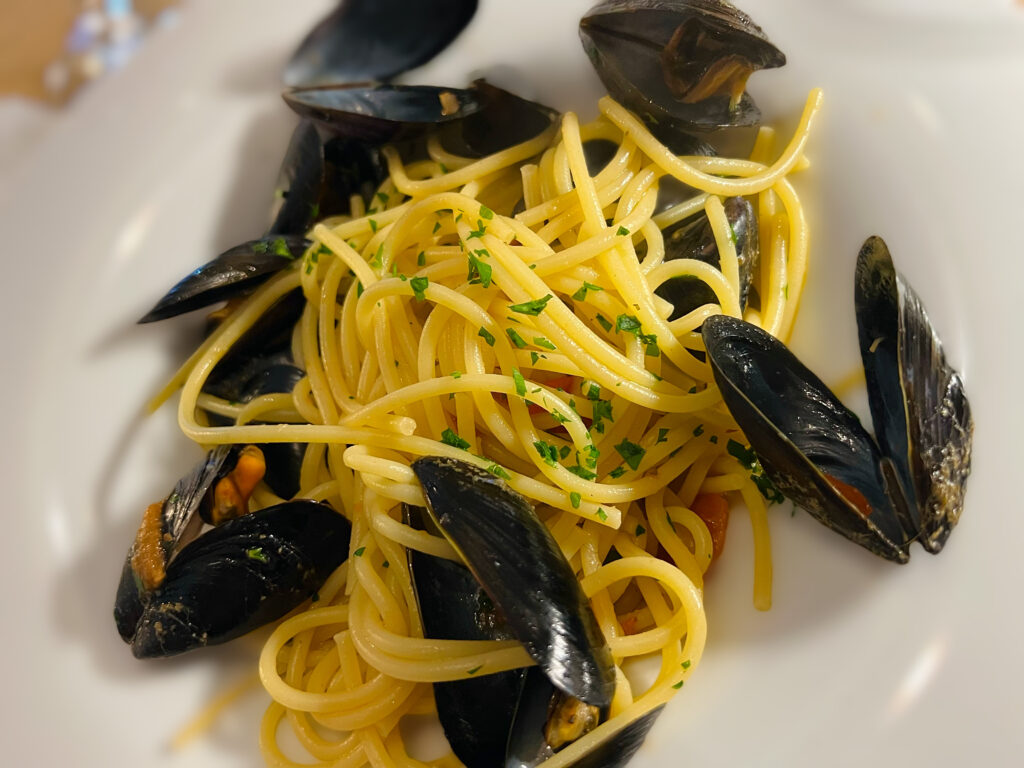
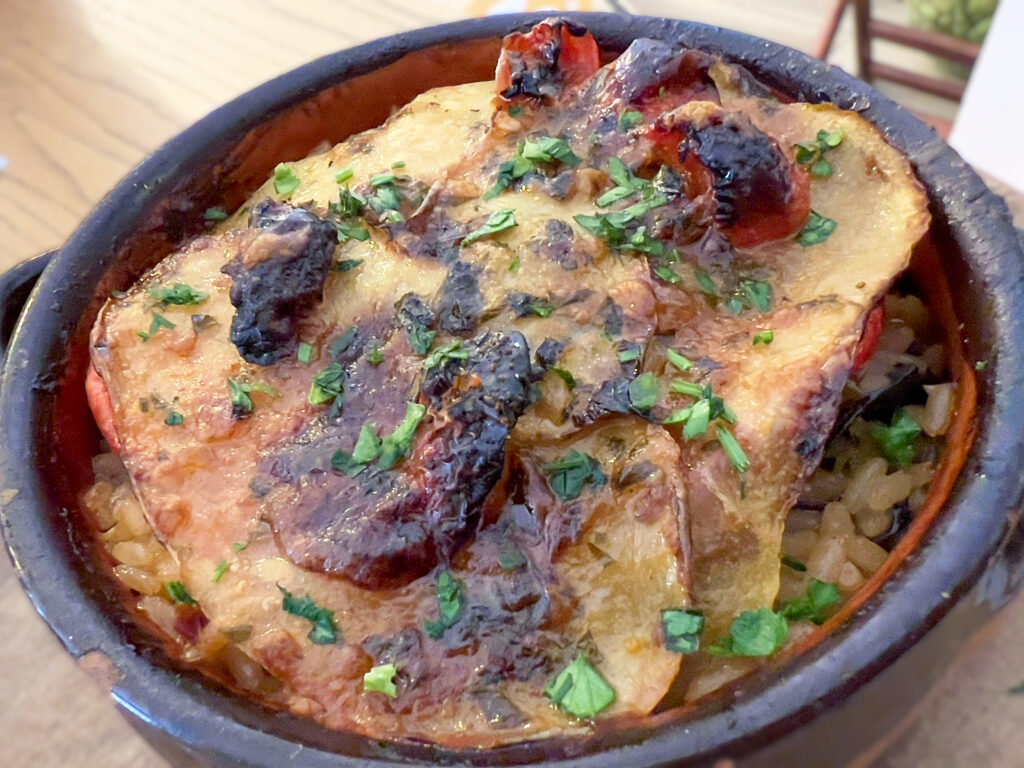
The lasagne is firm. ‘Maritato piatto unico’ is orecchiette pasta with polpette (meatballs) and braciole (thin slices of beef stuffed with prosciutto, pecorino, garlic, and herbs) slow cooked in a tomato sauce. It always blows us away.
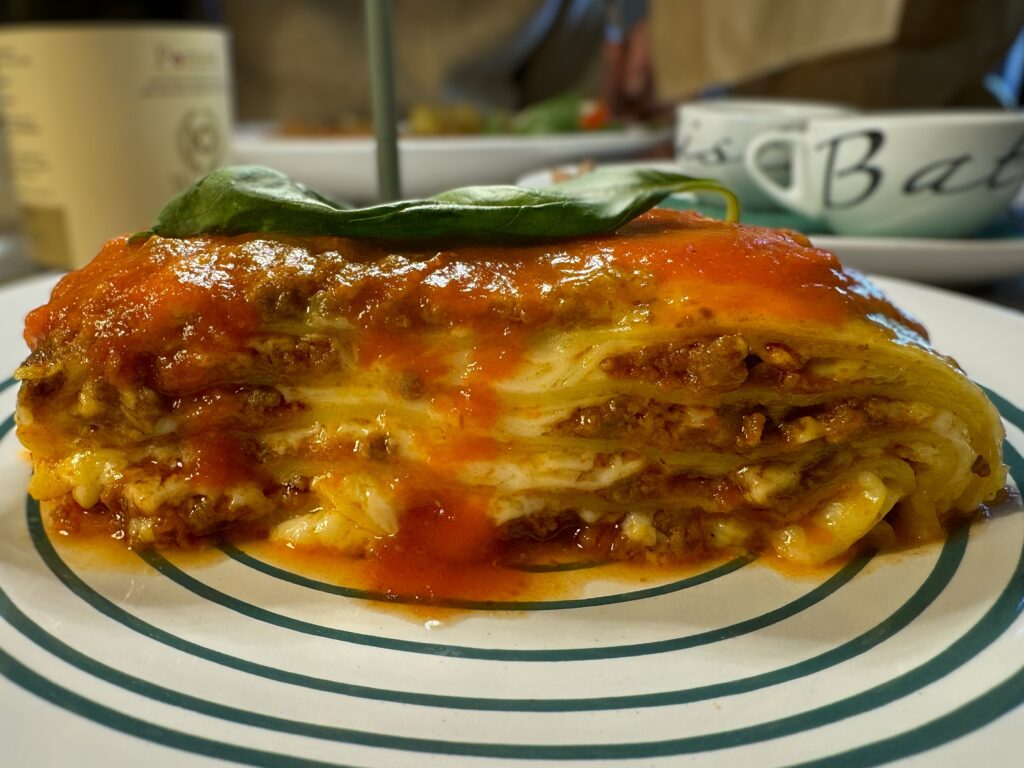
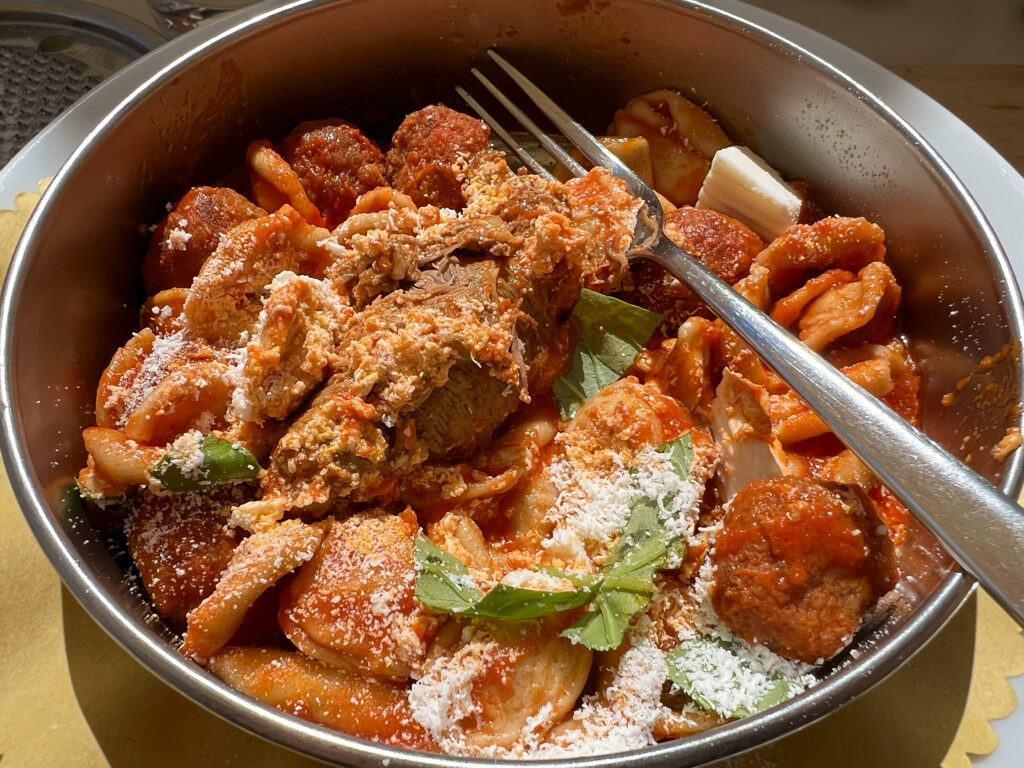
Paccheri al tonno rosso is a lighter pasta dish especially good in the summer.
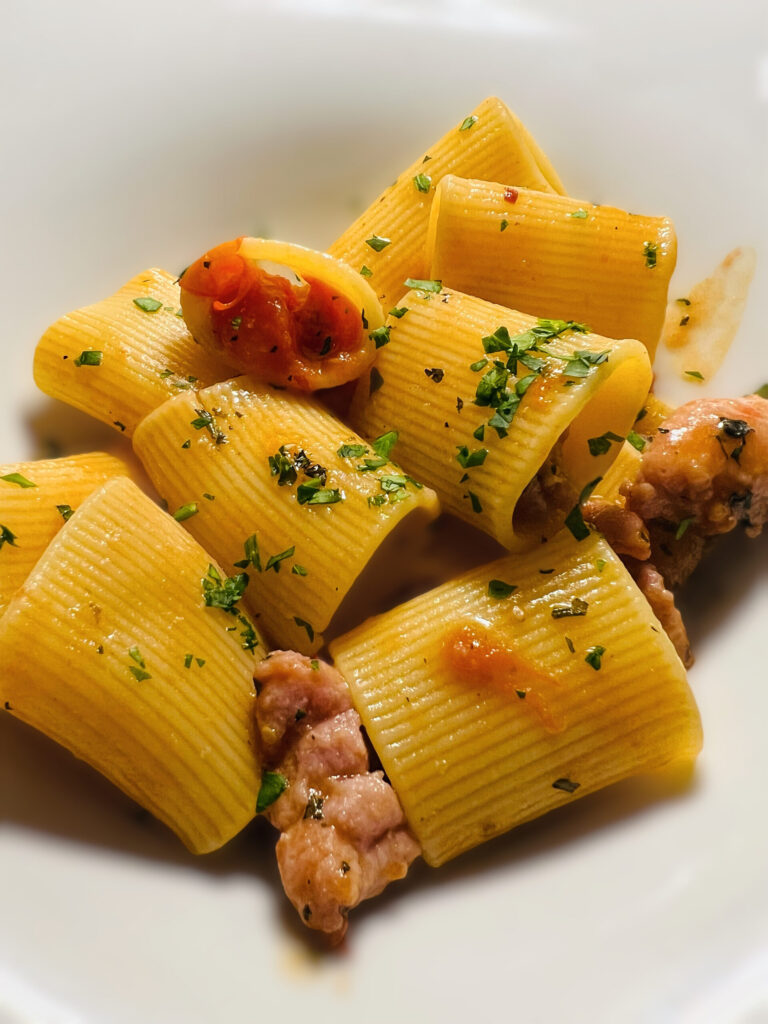
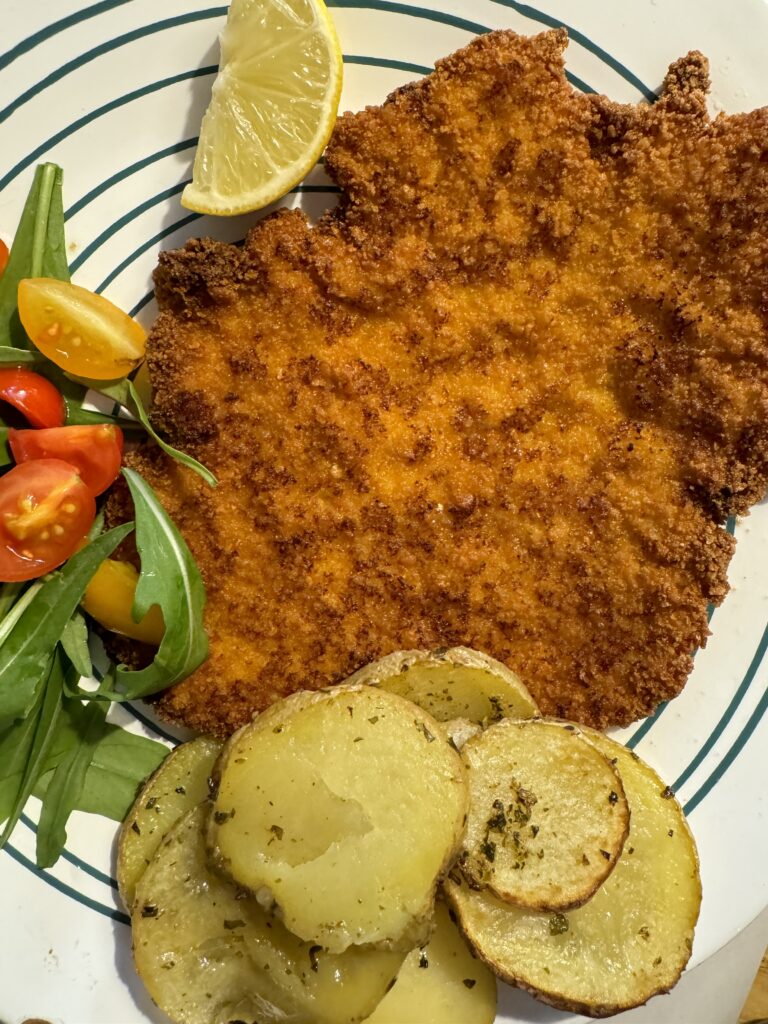
Secondi | The cotoletta al patate beats any cotoletta we have had in Milan. Fritto dell’Adriatico has prawn and calamari from the Adriatic, fried light and crisp.
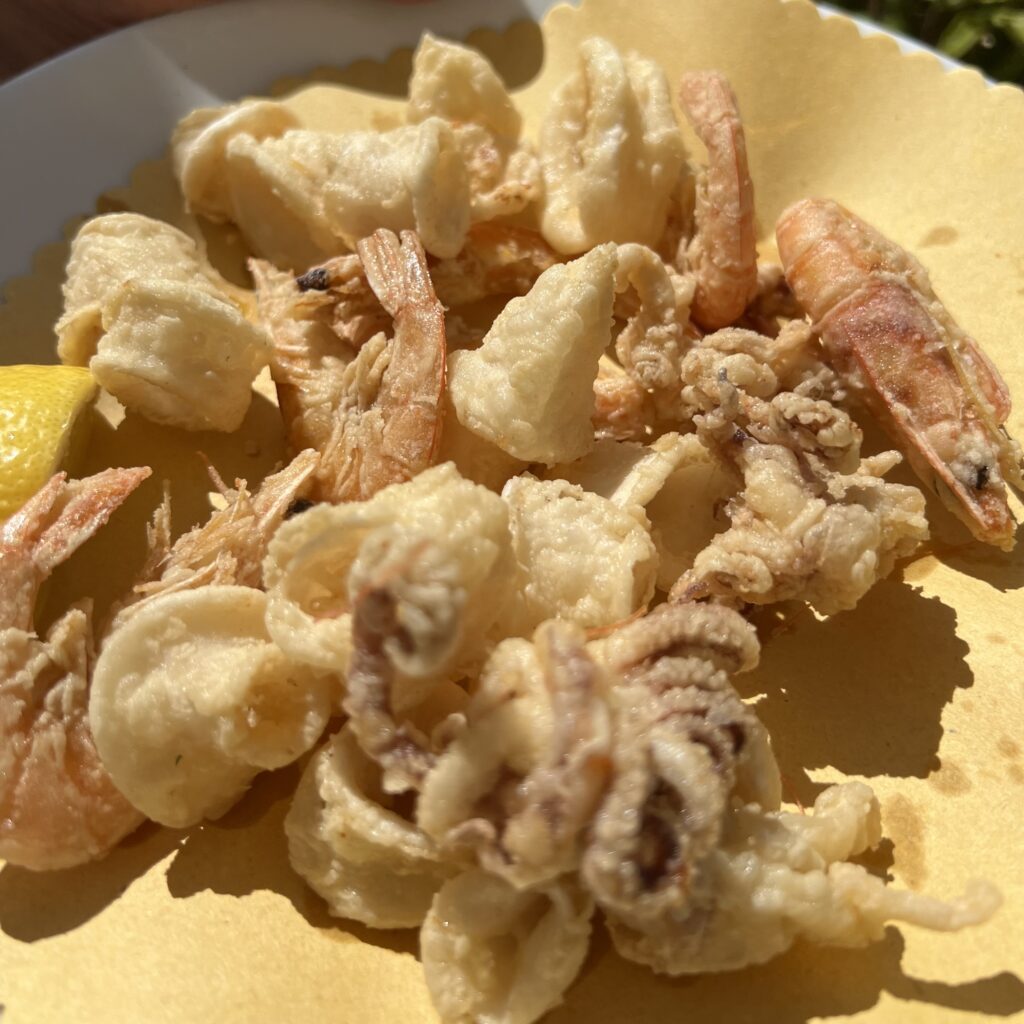
The grilled octopus is equally delicious. We usually finish our meal with the panna cotta – al caramello is our favourite topping.
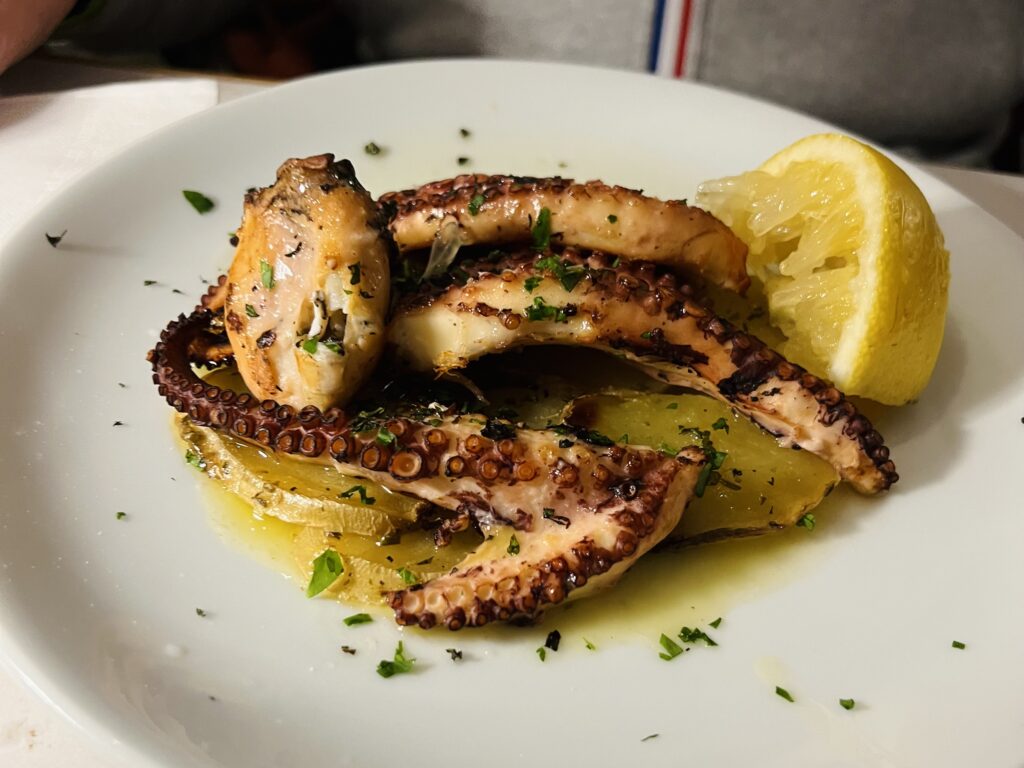
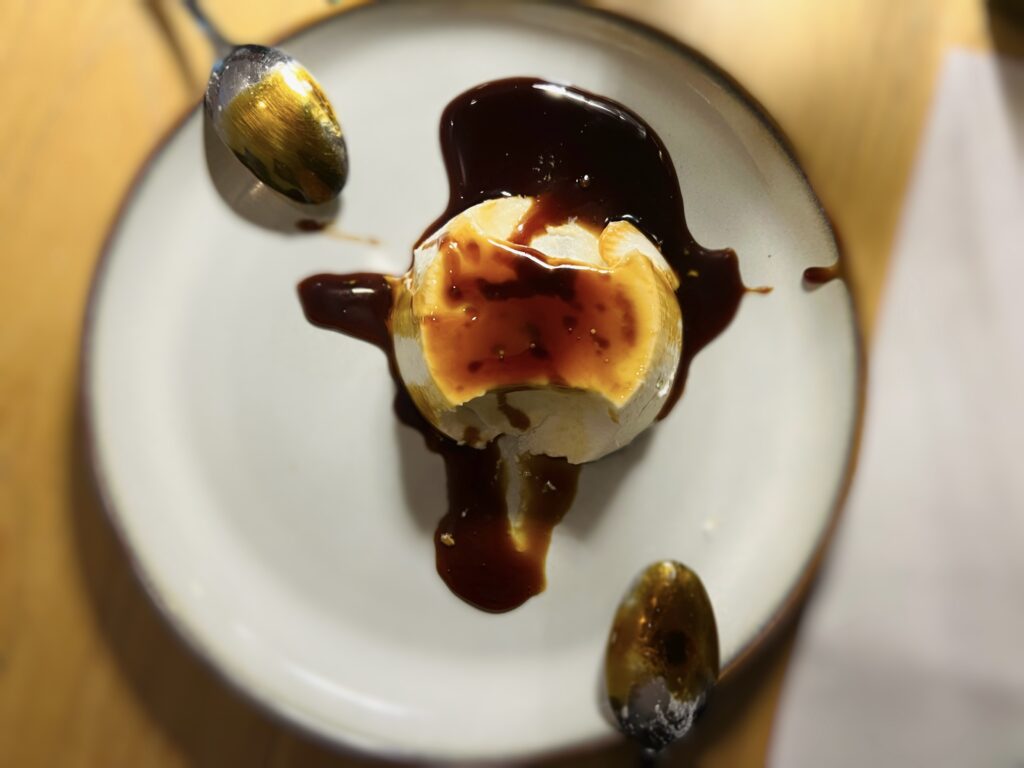
Al Solito Posto – Ristorante Pizzeria
Ostuni’s best pizza. Highly rated by locals. Andre thought the pizza base was the best he had ever had (anywhere). Great desserts. And starters… As tempted as we were by the seafood pasta at the table next to us, we didn’t try the mains (but probably will next time)!

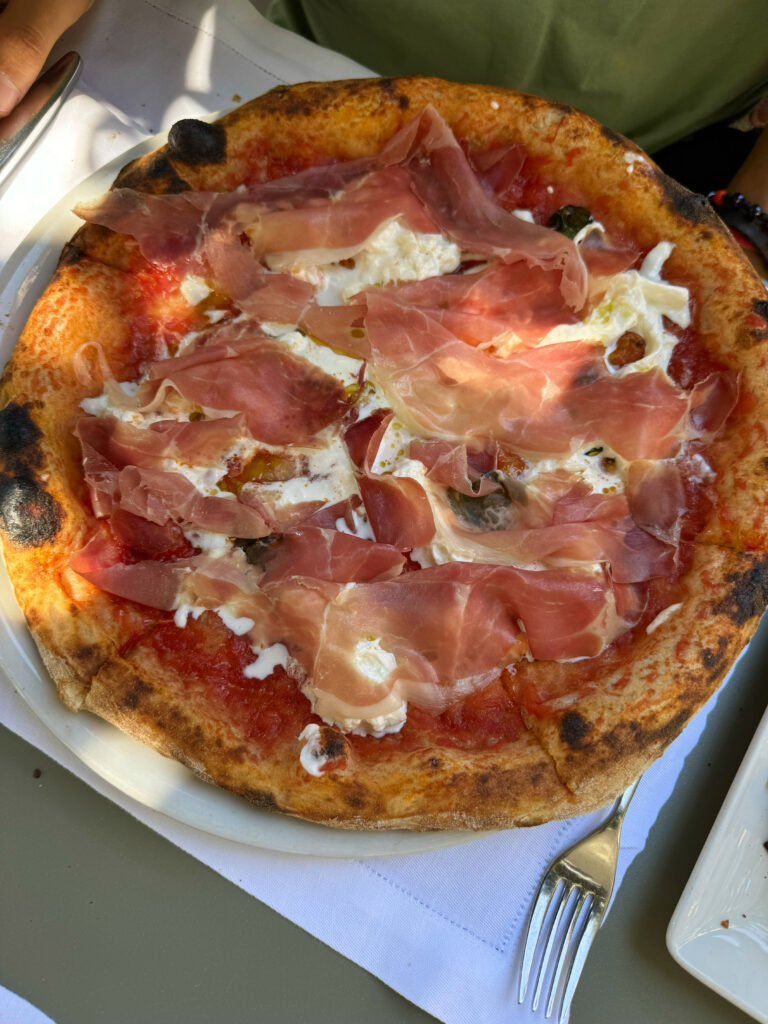
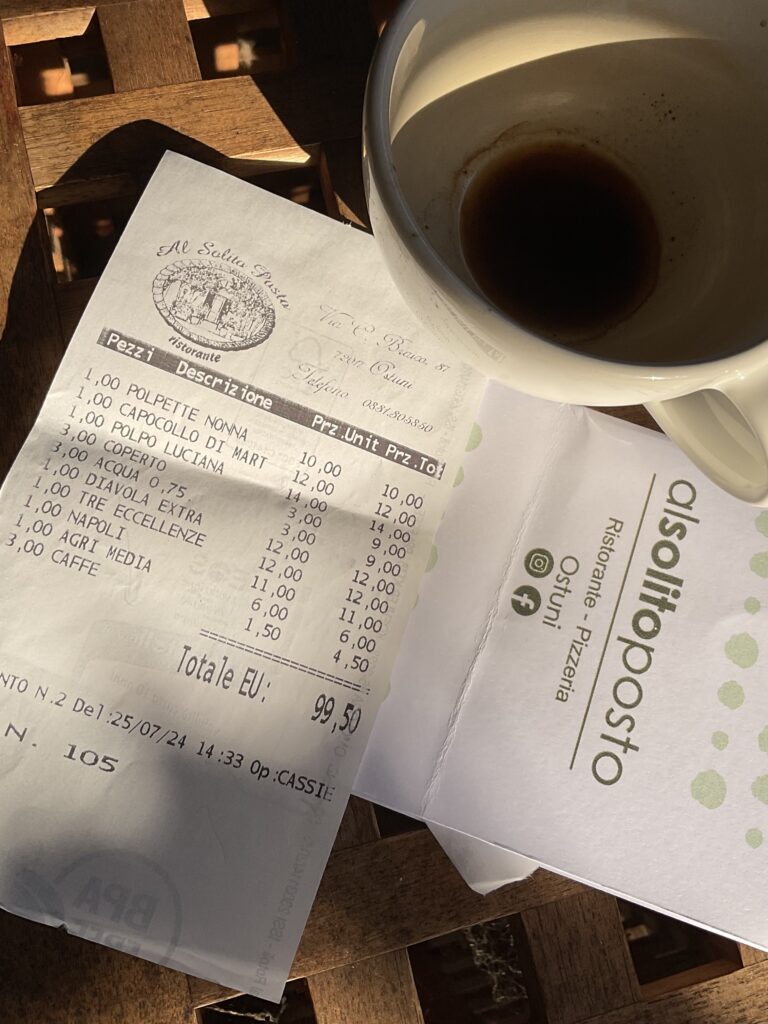
Via Cesare Braico, 37 | Al Solito Posto website
Casa San Giacomo | restaurant
Located in the heart of the centro storico, just off the main road to the duomo, about half-way up. Traditional home cooking in a typical Ostuni cellar setting with vaulted ceilings.
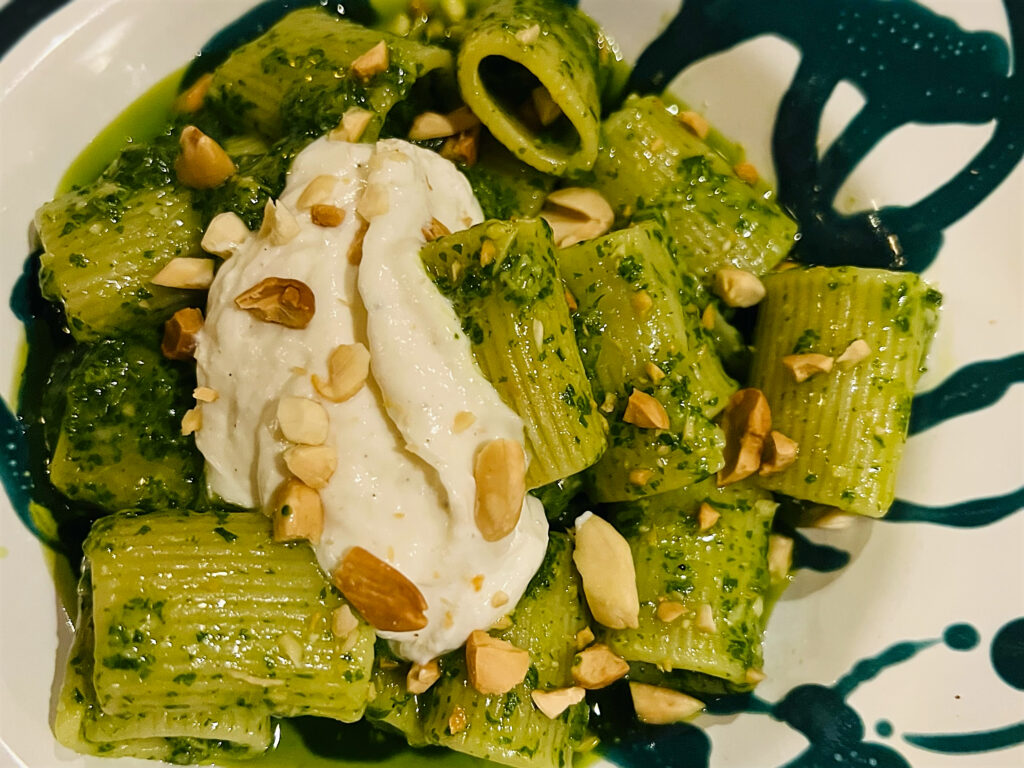
Our favourite spot for dinner, but be sure to book from June – September. Serving the recipes of Nonna Rosetta who used to cook in the kitchen with her sister. But sadly she passed a few years ago. The restaurant is now run by her grandson.
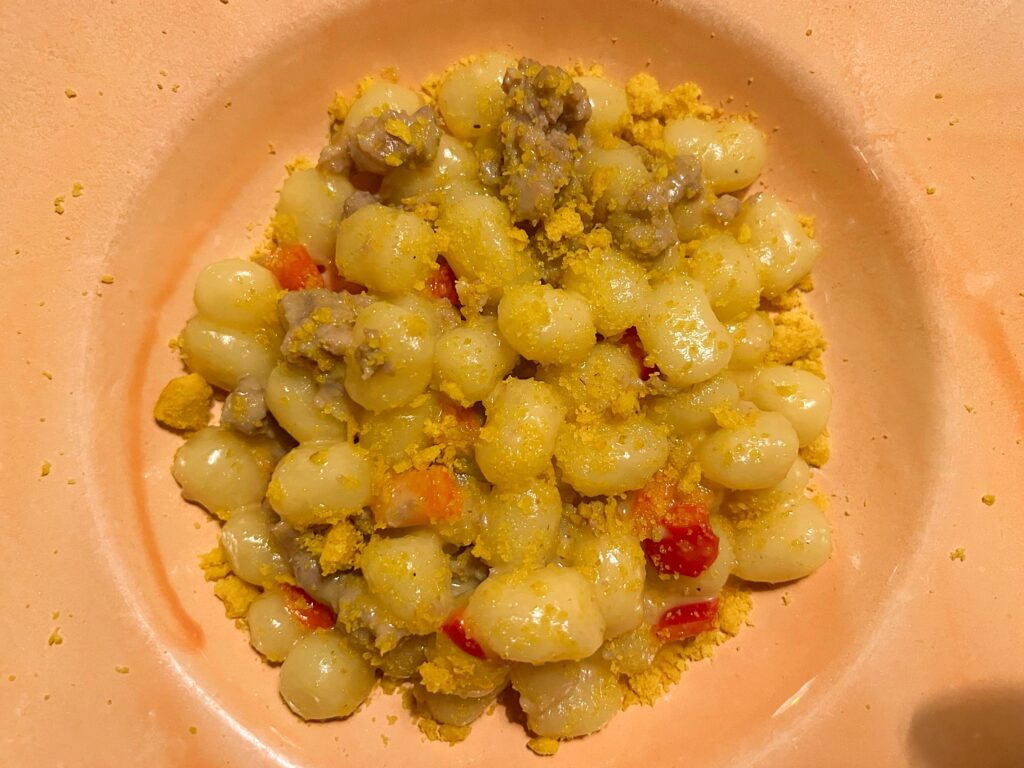
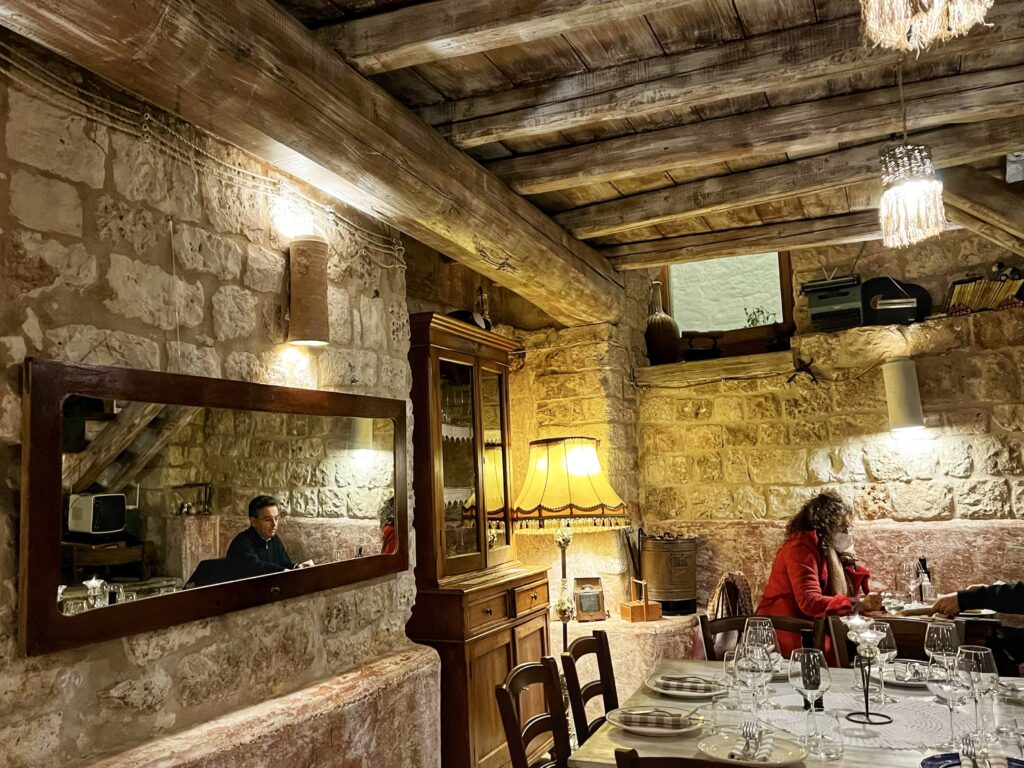
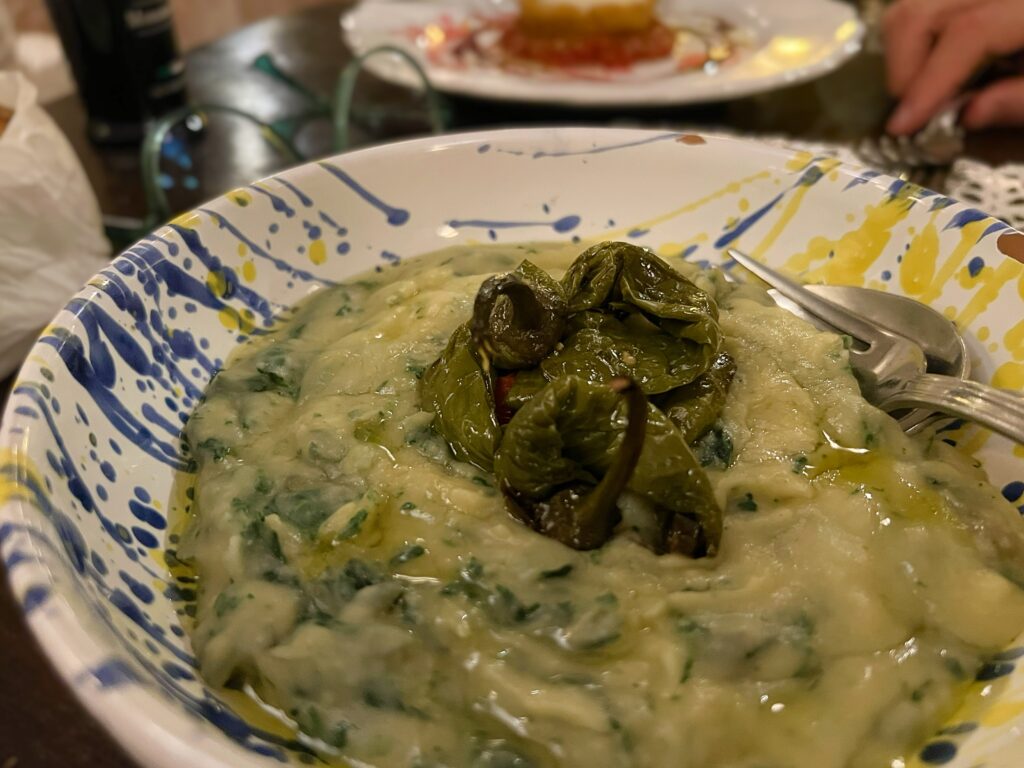
Dinner for three, including the coperto cover charge, three starters, mains and coffees, two bottles of water and two bottles of a moderately expensive wine cost us €153.
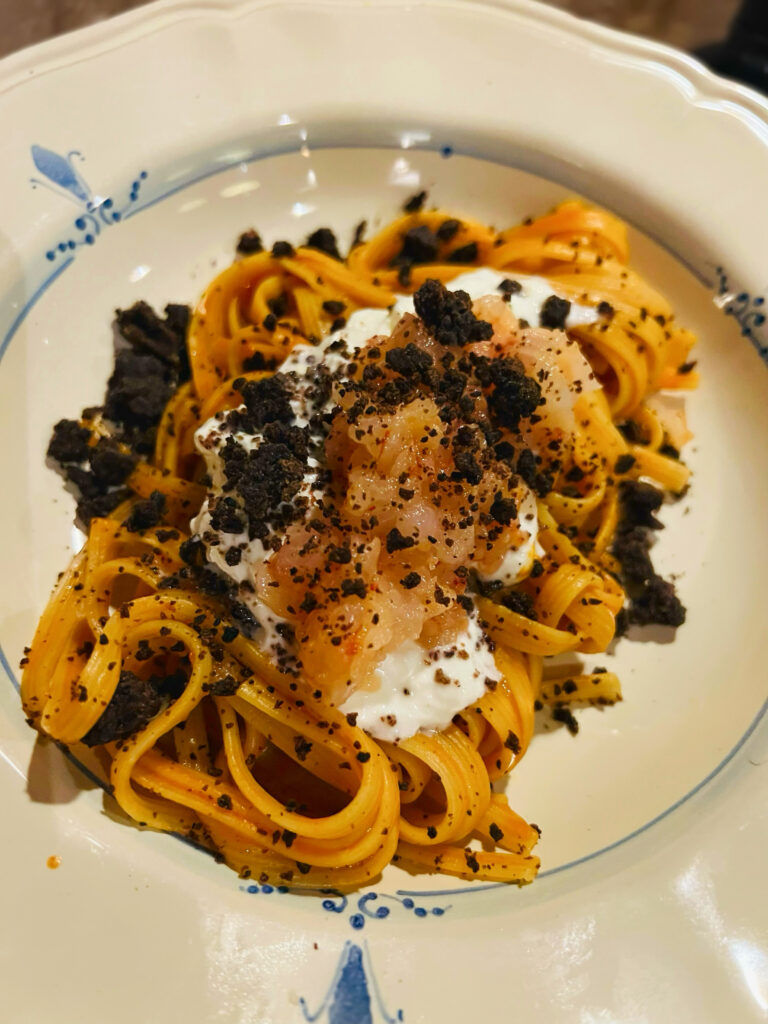
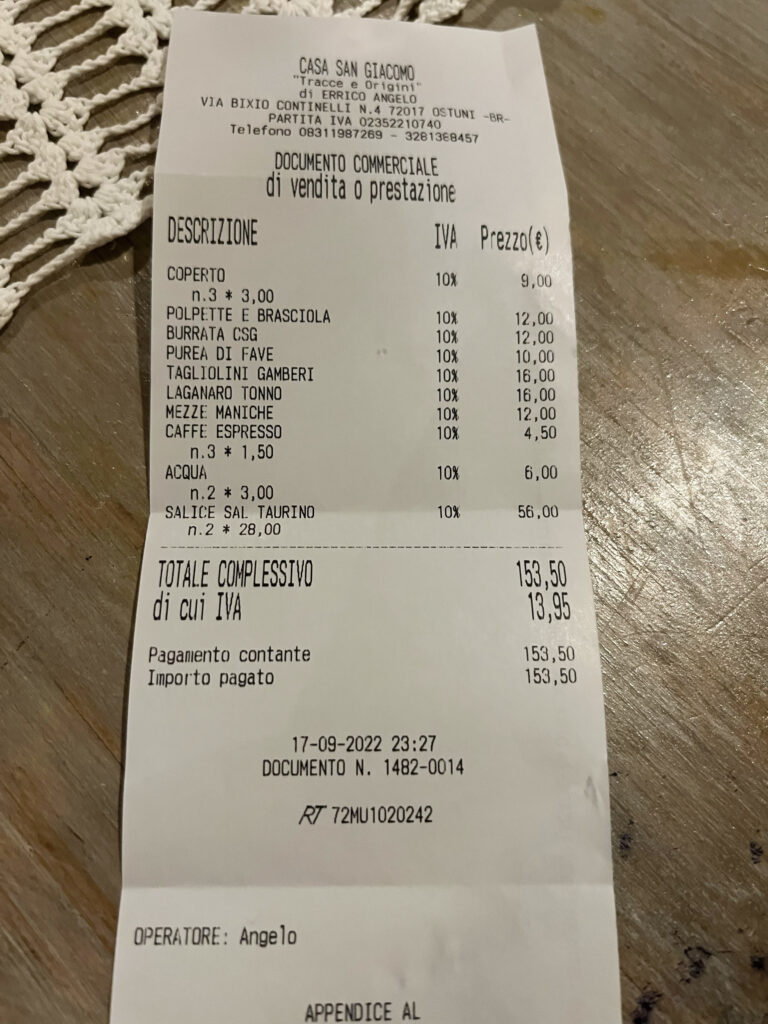
And yes, Madonna booked the whole restaurant to celebrate her 63rd birthday.
€€ – €€€
📍Via Nino Bixico, 4
+39 328 138 8457
Gabó | restaurant, lounge bar
Although it isn’t for locals (the price is relatively on the higher side, especially the coperto (cover) at 5€ per person and drinks – 5€ for 0.75l water, 7€ for 0.40cl beer, 5€ for Coke Zero, 9€ for a glass of wine), the food is excellent, the service friendly and the setting one of the nicest. Choose a seat in the cool, garden shade. On one of the panoramic terraces or inside.
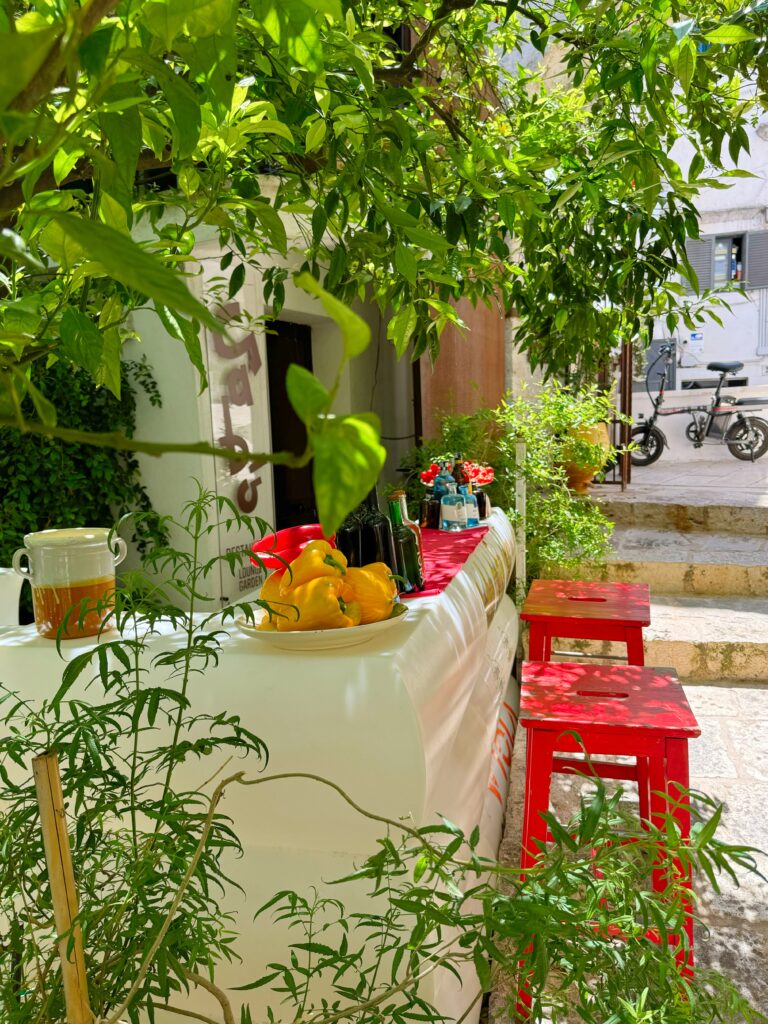
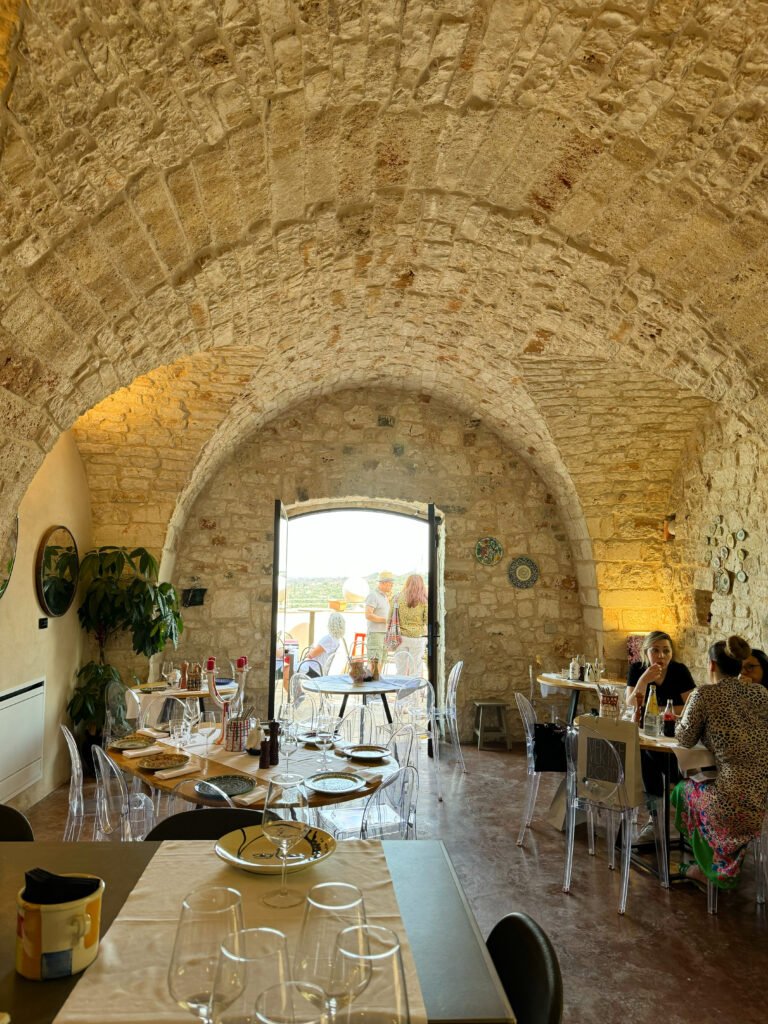
Tastefully decorated and accented with Nicola Fasano ceramics from Grottaglie (the “Coffee & More” English language branding on plates seems at odds with the location, but this is the trading name of the restaurant and the plates were commissioned).
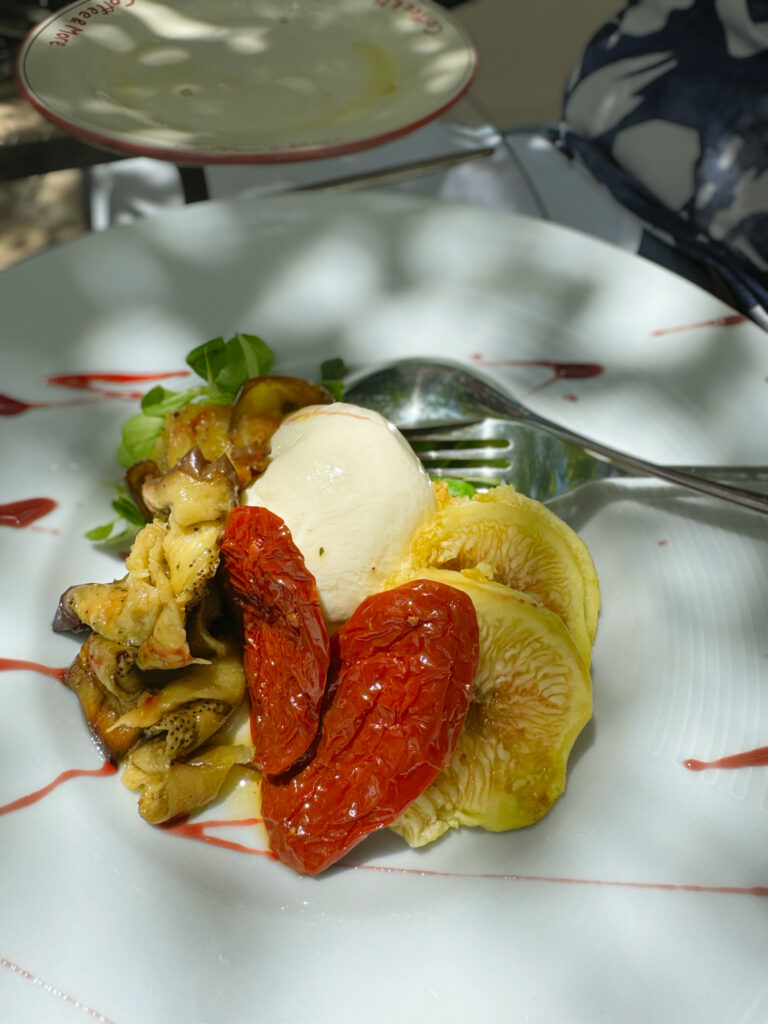
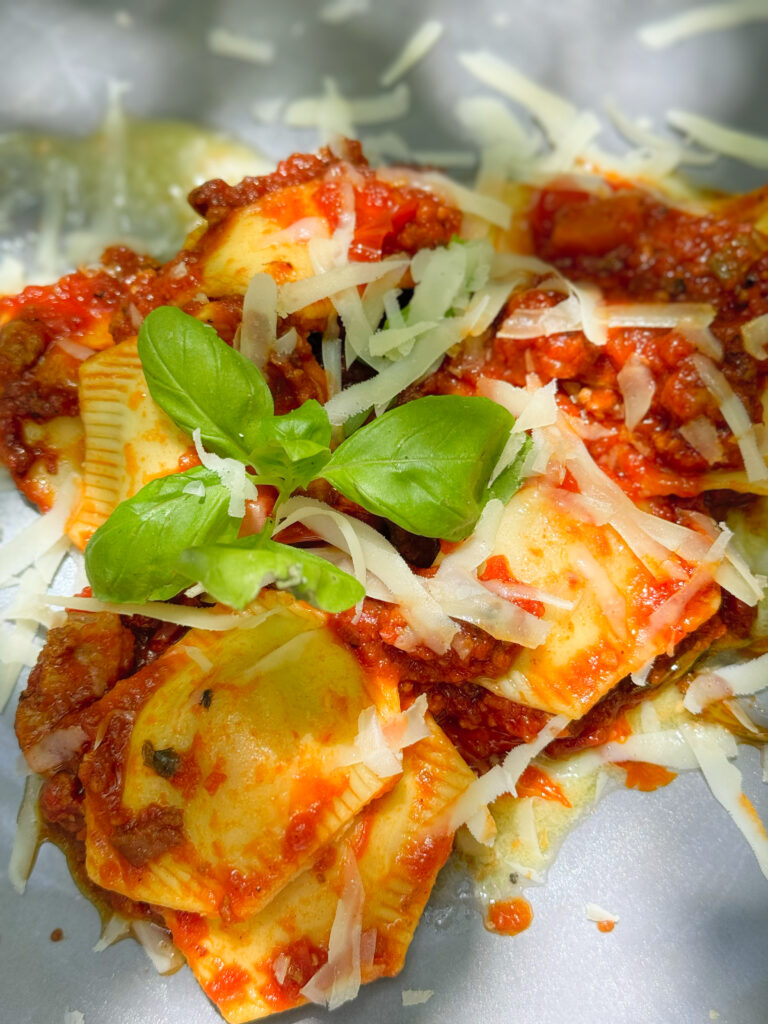
They have an excellent policy of not allowing smoking at the tables on the terrace outside, so your meal isn’t spoiled by smoke coming from a neighbouring table. There is a smoking area by the main entrance.
The food is a little more expensive that we usually pay, but the food is excellent and the portions are generous, so we consider Gabó good value when it comes to the food. The coperto is one of the most expensive in Ostuni at 5€ per person, but the olive bread we were served was freshly baked, warm and delicious. The service was unhurried and relaxed.
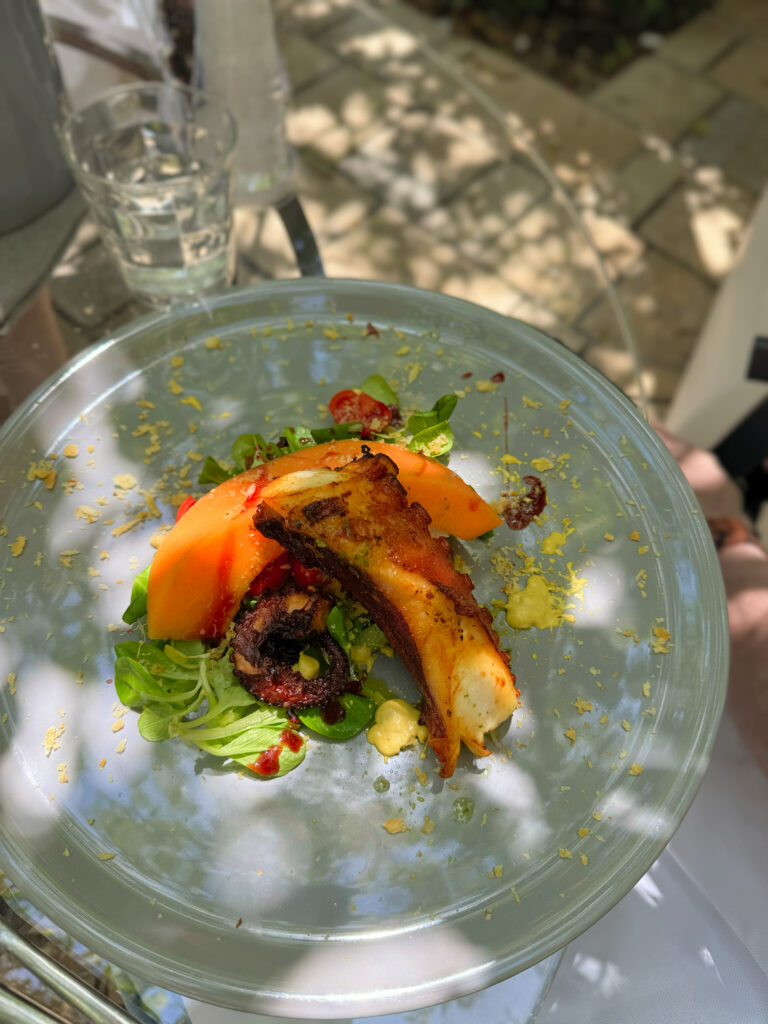
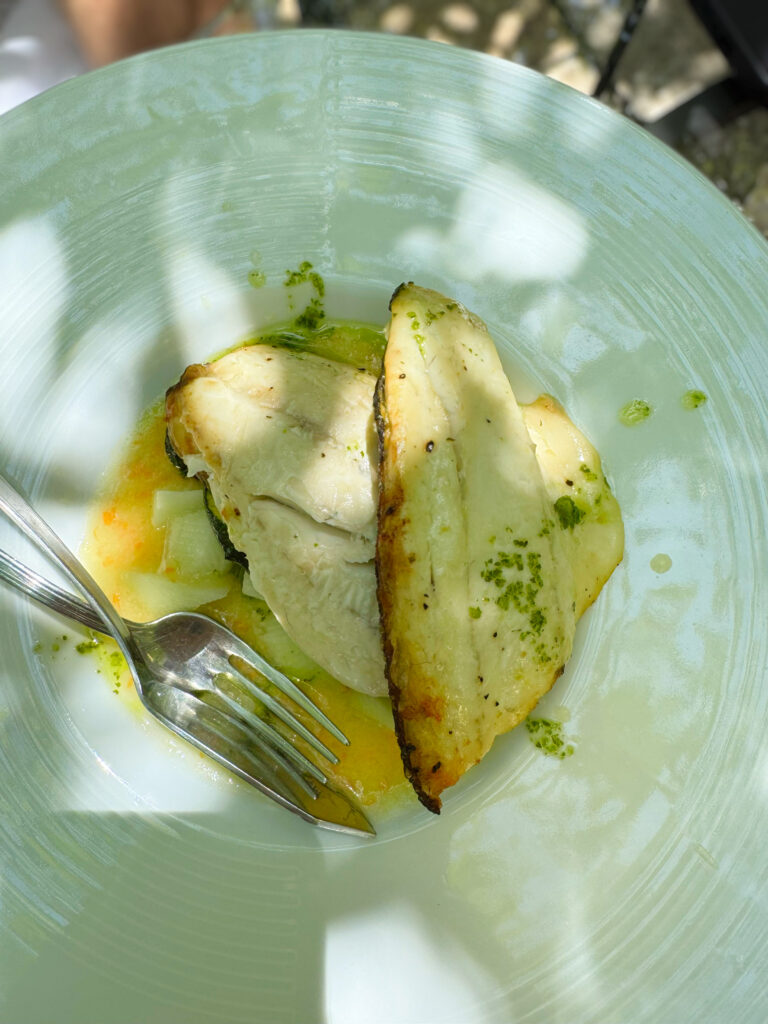
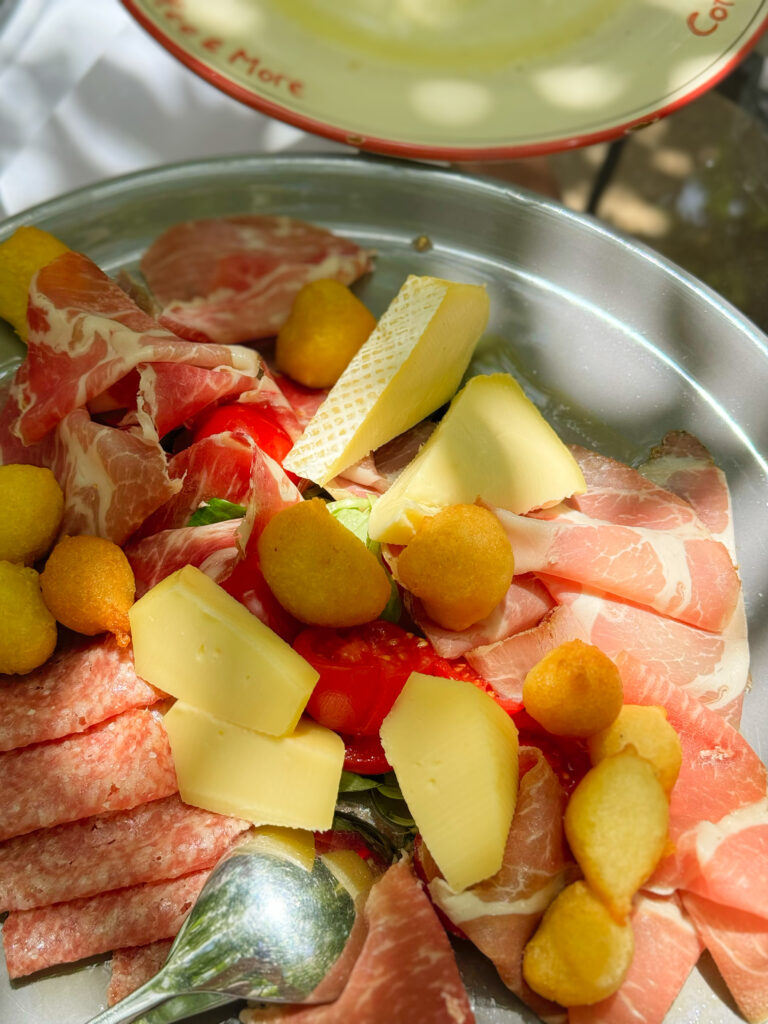
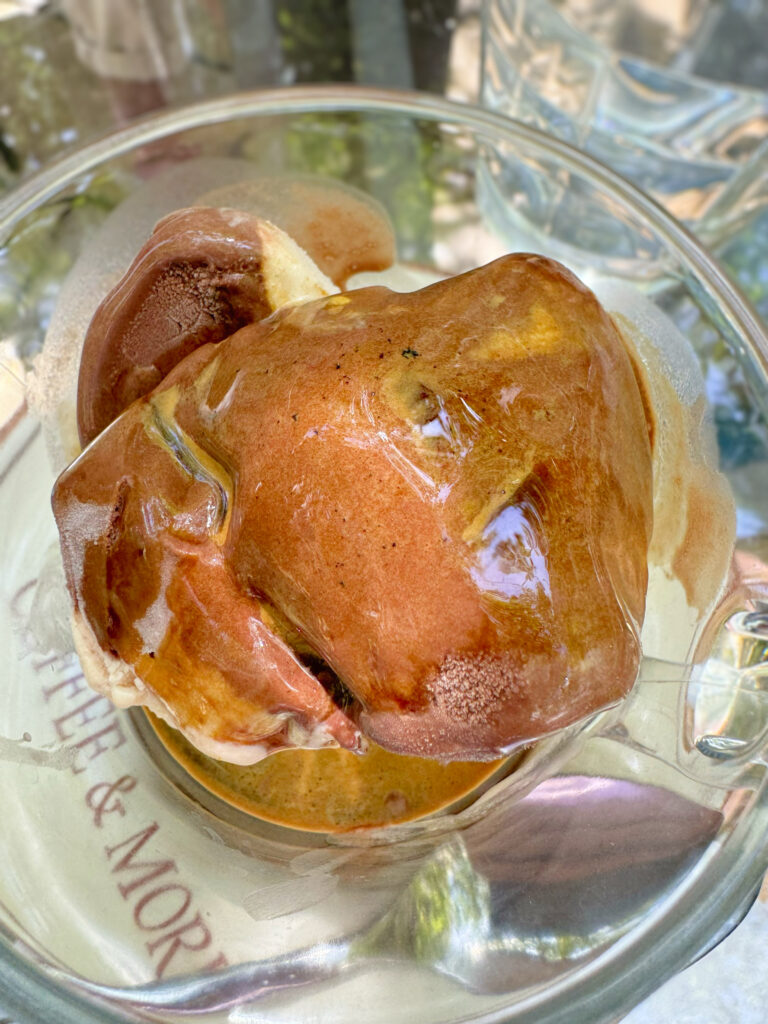
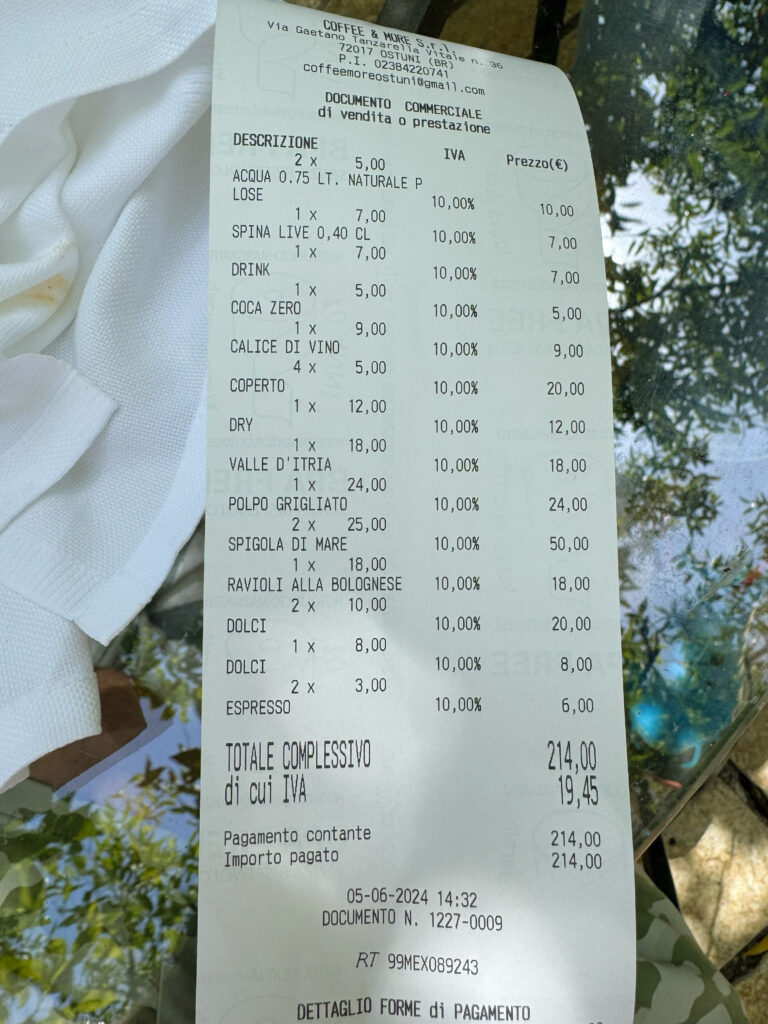
Booking for lunch, dinner or even cocktails recommended.
€€ – €€€€
📍Via Gaetano Tanzarella Vitale, 36
+39 328 271 1189
Osteria Monacelle | restaurant
Good local food in the heart of Ostuni’s old town.
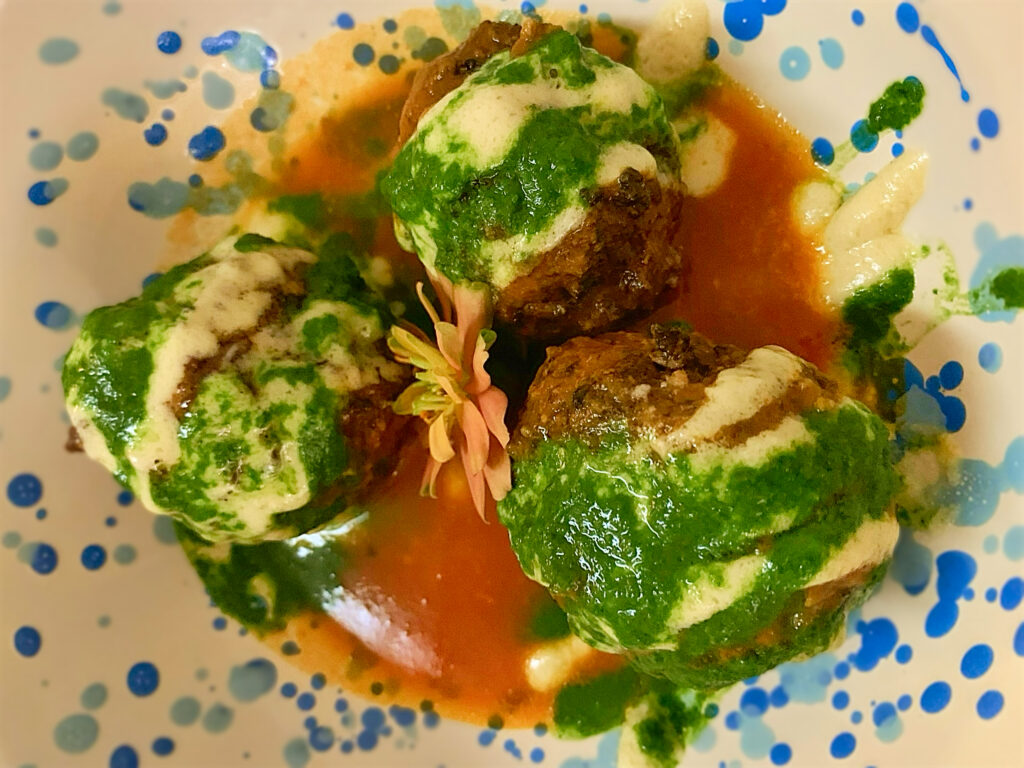
Osteria Monacelle is one of our dependable dinner choices when we eat out in Ostuni. They serve typical regional dishes consistently well.
If fave with cicoria and octopus are on the menu the chances are that they will be appearing on our table.
Monacelle has three eating areas. The narrow alleyway outside the restaurant, the main dining space which is the second door up, at street level where the outside menu is located, and the upstairs area which the first door that you come to walking up the hill.
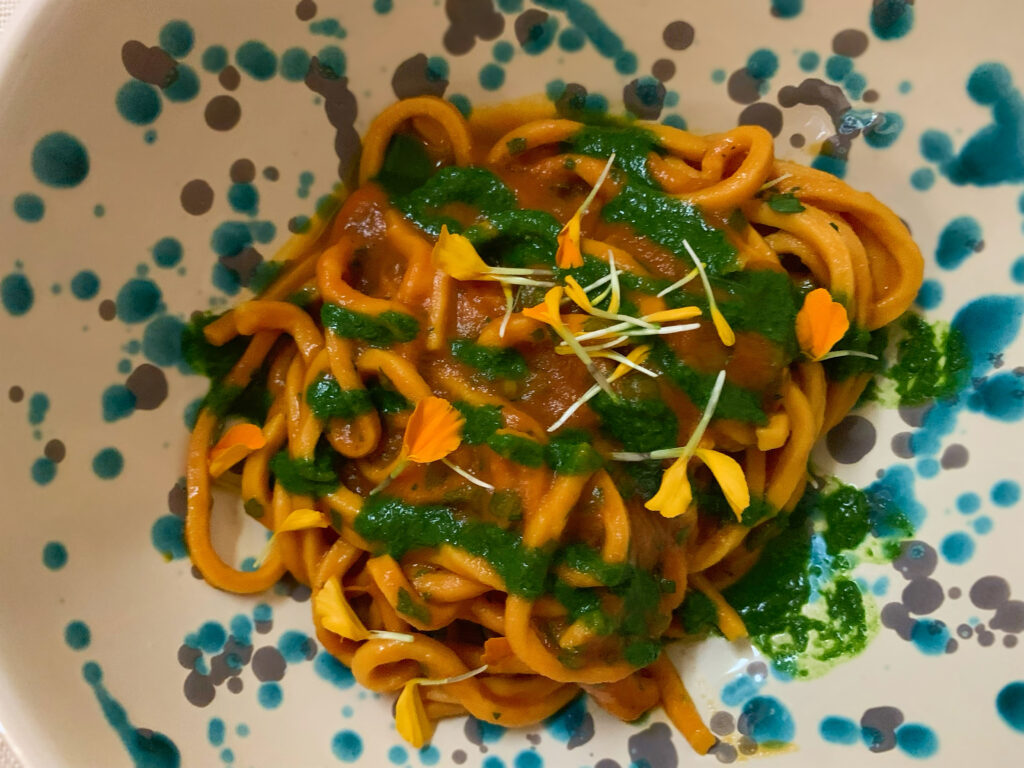
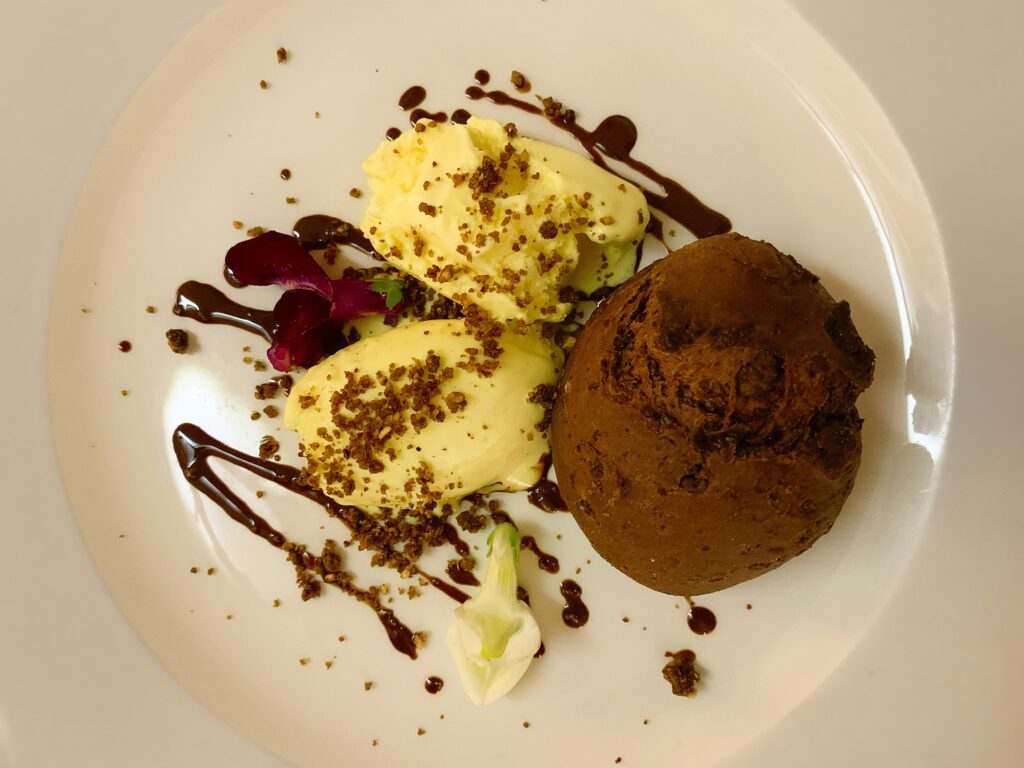
The main dining space is adjacent to the main kitchen, too hot in summer. The upstairs area is (slightly) cooler, with fewer tables. You won’t find yourself near the bathroom which sometimes happens with a table for two downstairs. We find the alleyway seating area too narrow for privacy, with many passers by on a summers evening.
From June – September booking is recommended to avoid a long wait, or being turned away.
€€ – €€€
📍Via P. Vincenti
+39 083 133 4212
Caffè Fanelli Bistrot | bar
Coffee, lunch and aperitivi. The best value Aperol Spritz on Ostuni’s main piazza.
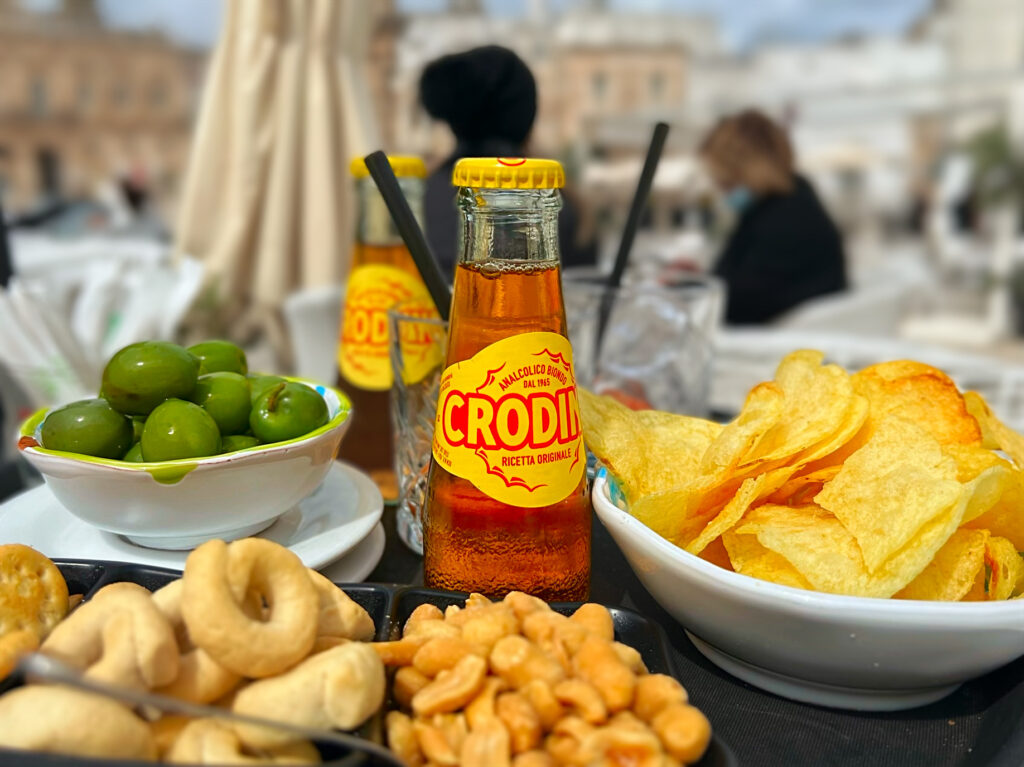
Our favourite spot for people watching, morning, anfternoon and evening. We go there for a coffee and pastry, or a later morning or afternoon/evening aperitivo. We love the crema al caffè on a summer morning.
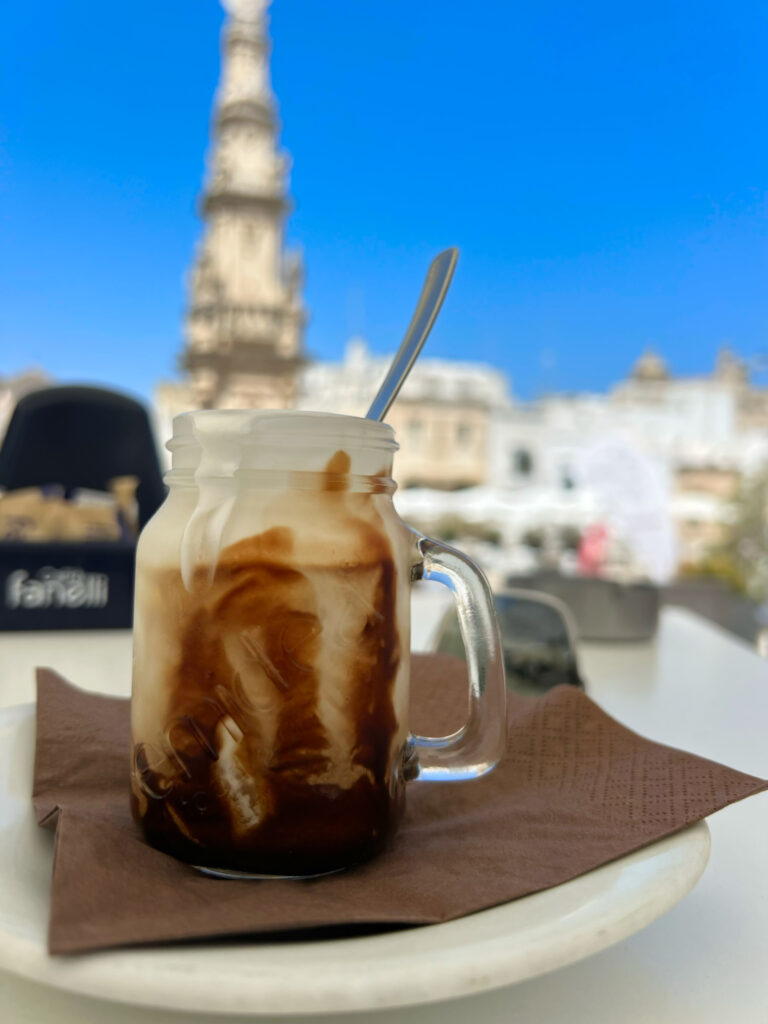
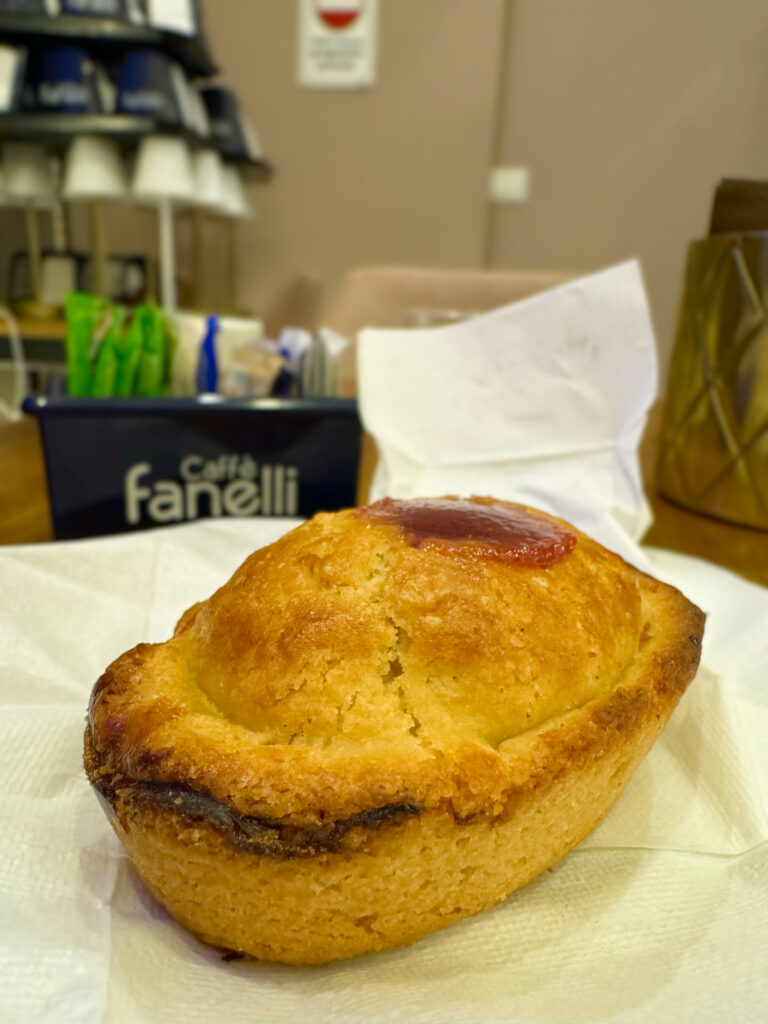
We are big fans of their home made lasagne – a must if you like your lasagne on the wet side, with plenty of sauce.
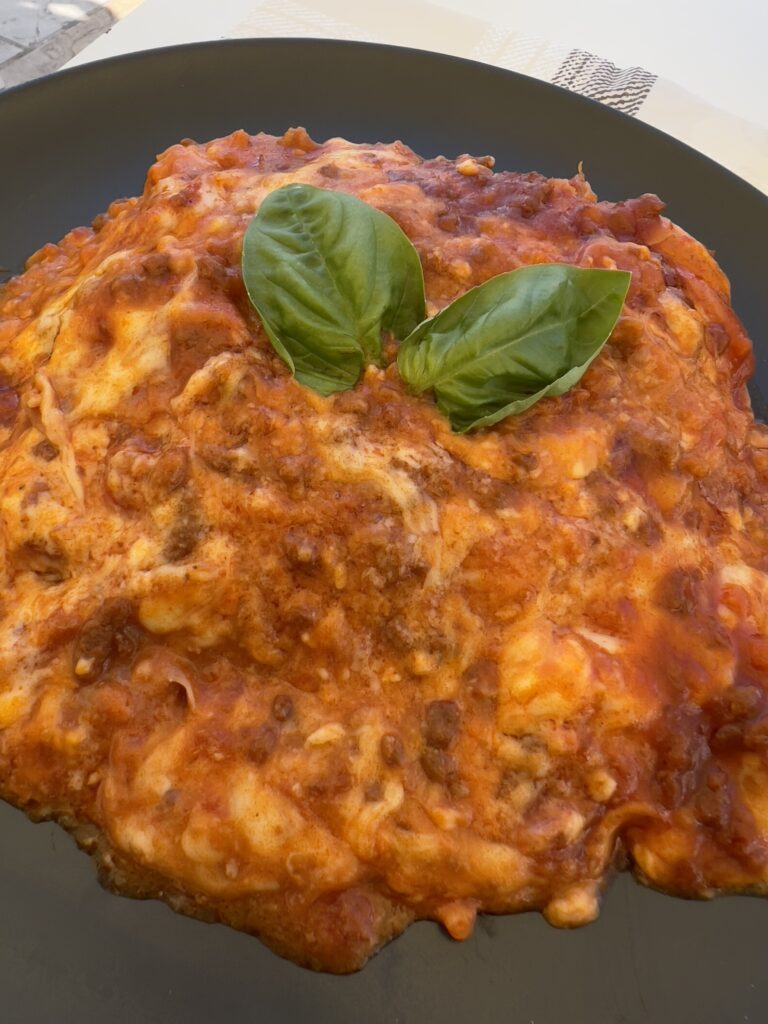
Fanelli cook their lasagne like we do – with prosciutto layered between the sheets of pasta and ragù.
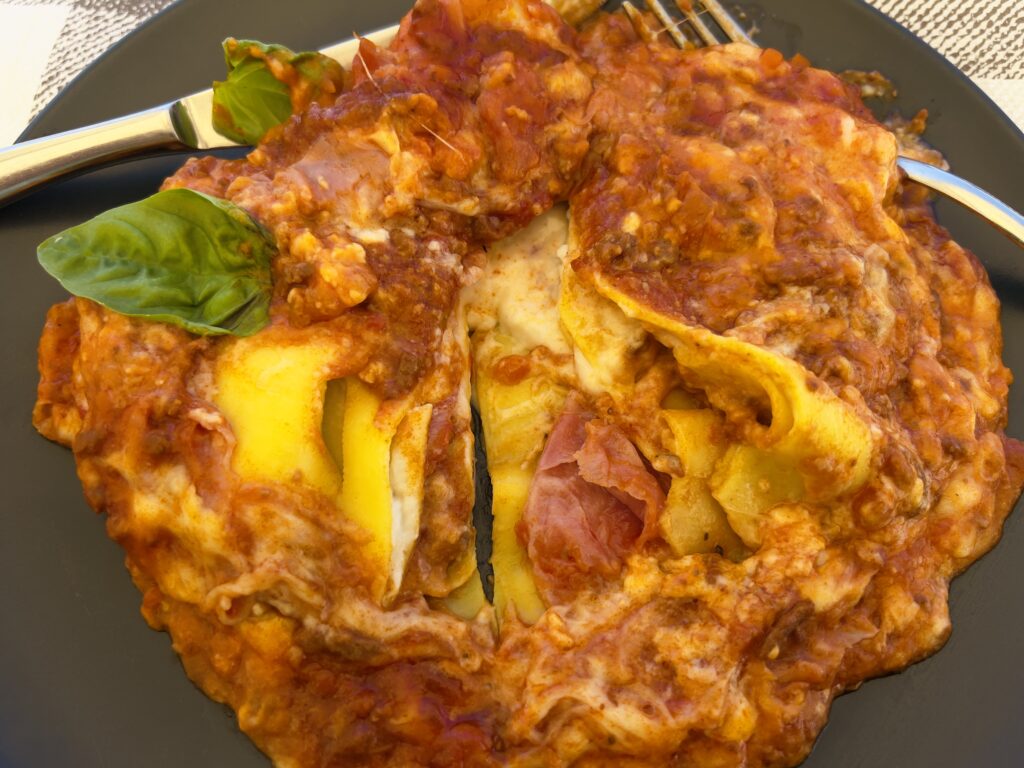
They also have a nice plate of orecchiette alla crudaiola. A lighter pasta dish with fresh tomato topped with grated cacioricotta cheese from Puglia, perfect in summer.
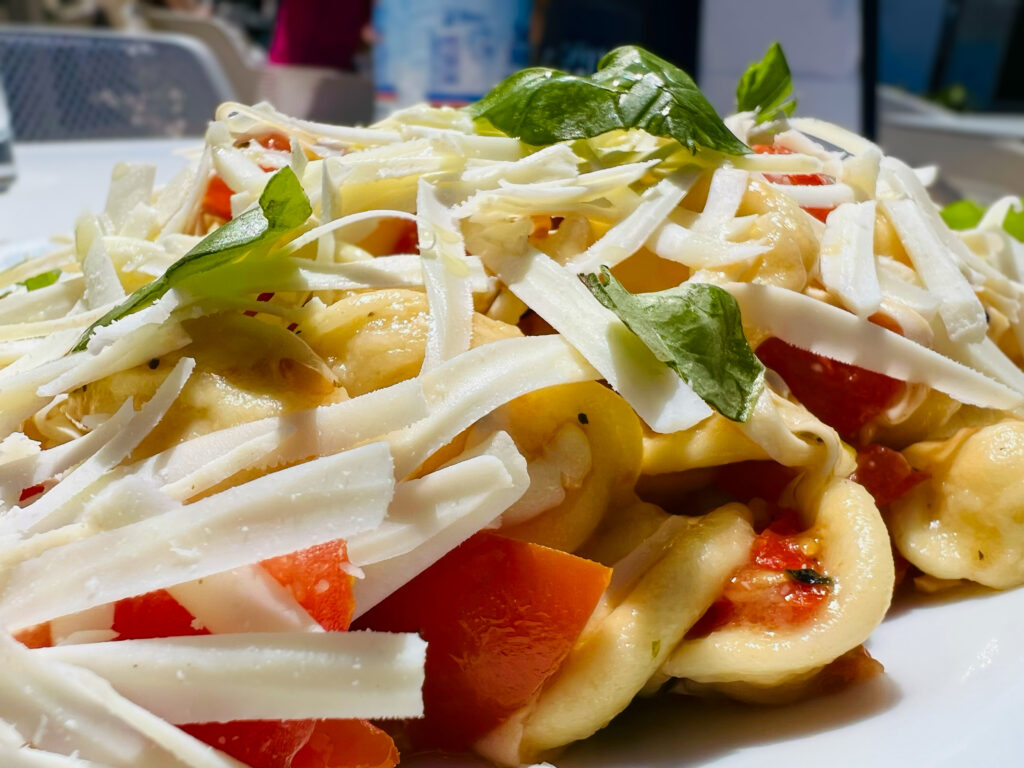
Fanelli is our preferred aperitivo spot. Their Aperol Spritz is served with a tris, a typical snack on the side. All for €5,90. The best value Aperol Spritz on Ostuni’s main piazza.
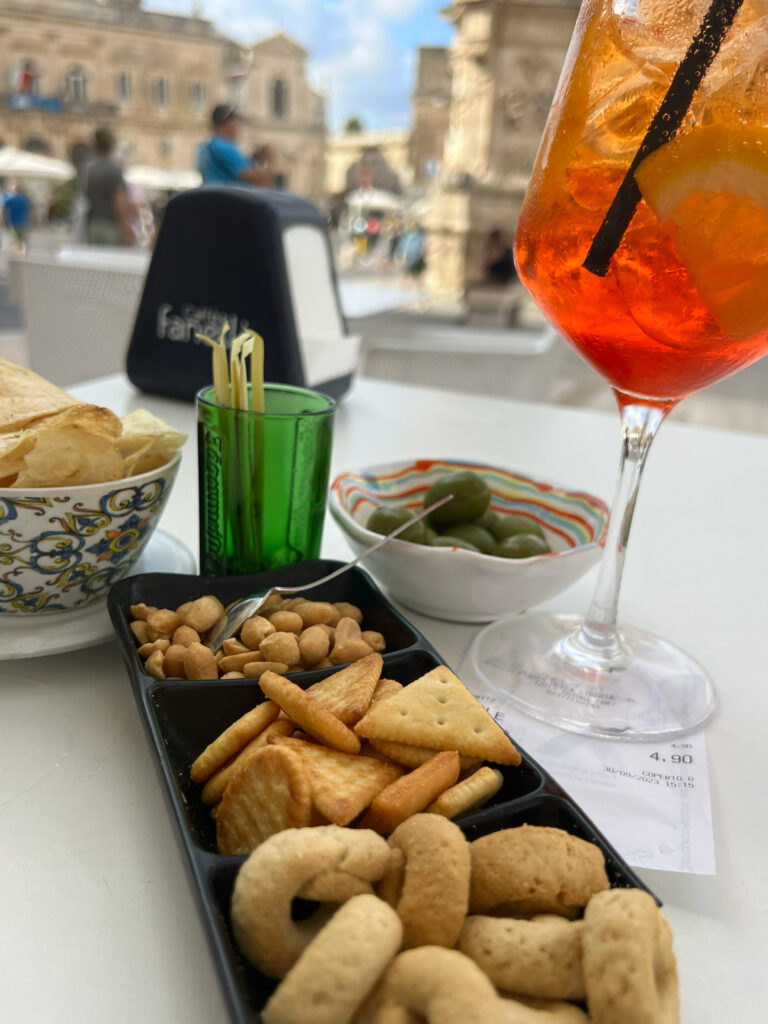
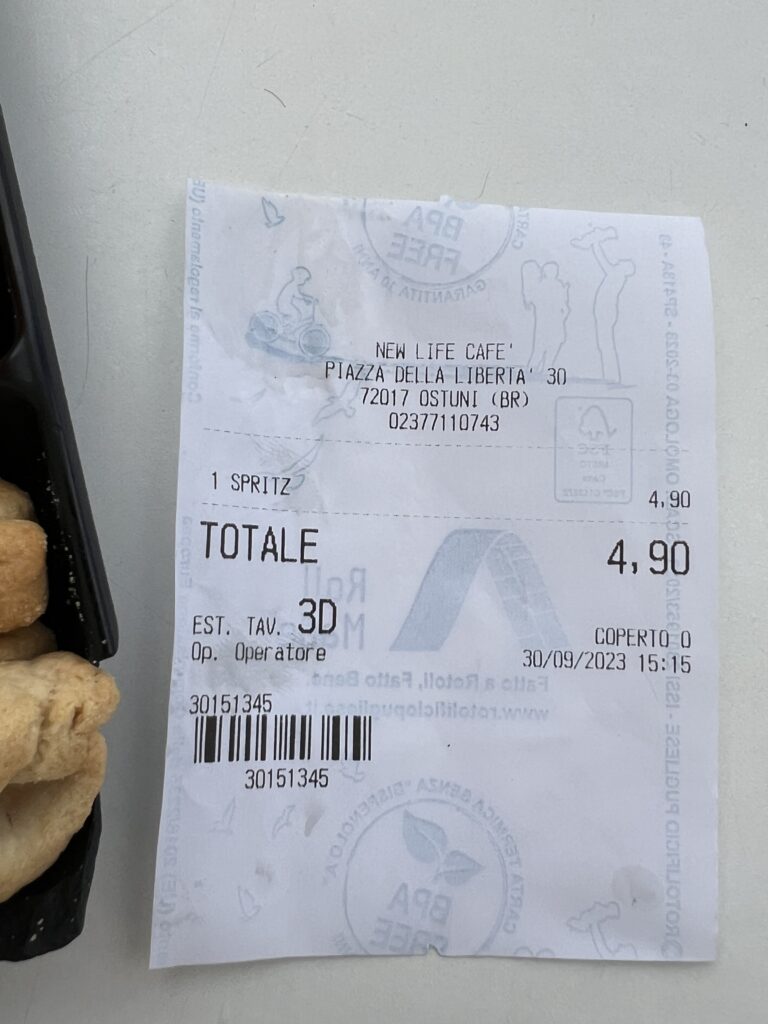
On the other side of the Sant’Oronzo column, only 10 metres away at Casbah expect to pay 15€ for the same. The only difference in price we can ascertain is for Casbah’s chic lounge bar surroundings.
📍Piazza della Libertà, (2 Corso Cavour) | €-€€
Borgo Antico Bistrot | bar
For aperitivo. Spectacular views over the olive groves to the Adriatic and a reasonably priced Aperol Spritz.
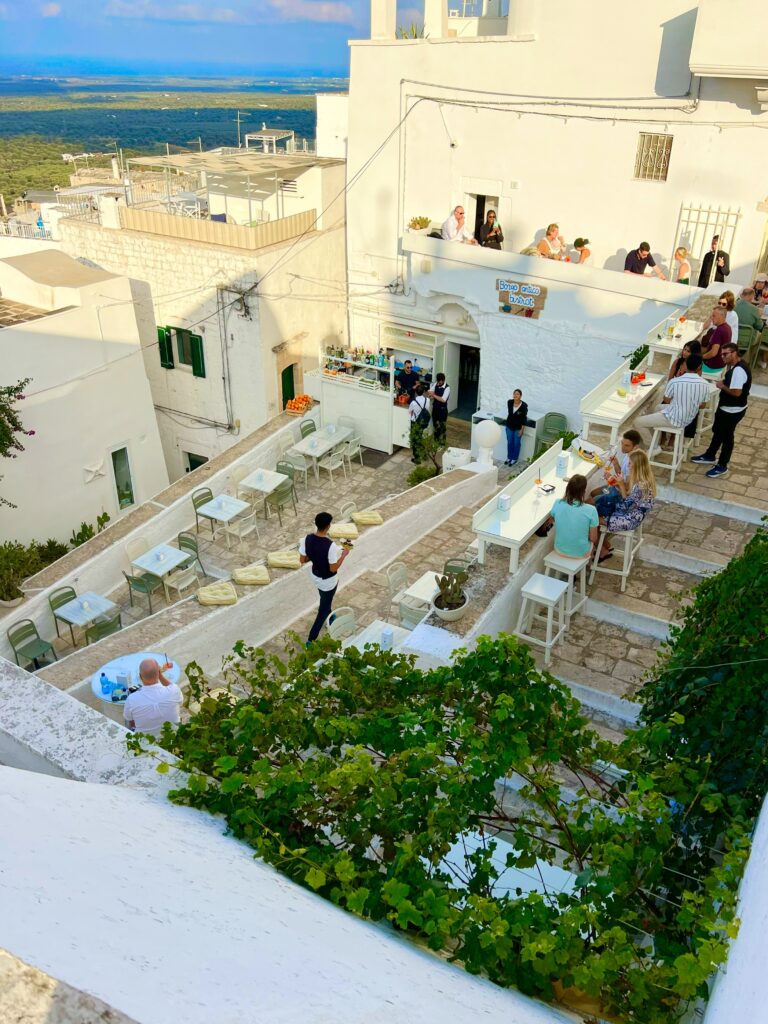
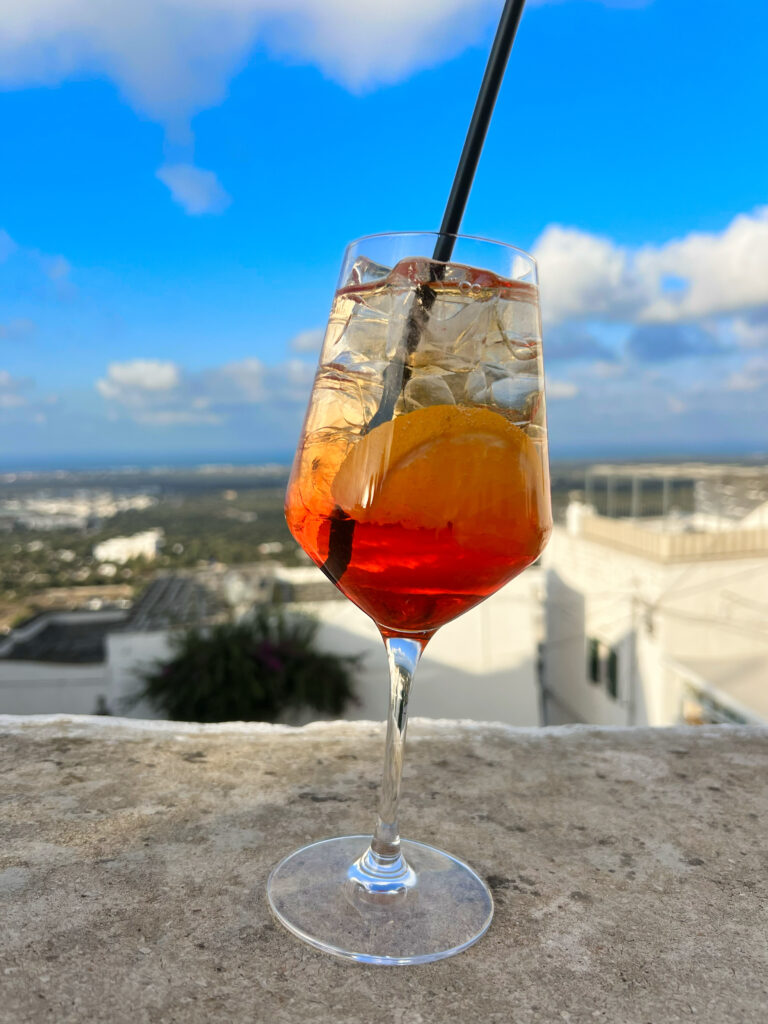
You might think given its prime location this would be an overpriced tourist trap, but fortunately not. A wonderful spot to pause after walking to the top of the old town, on the eastern side of Ostuni.
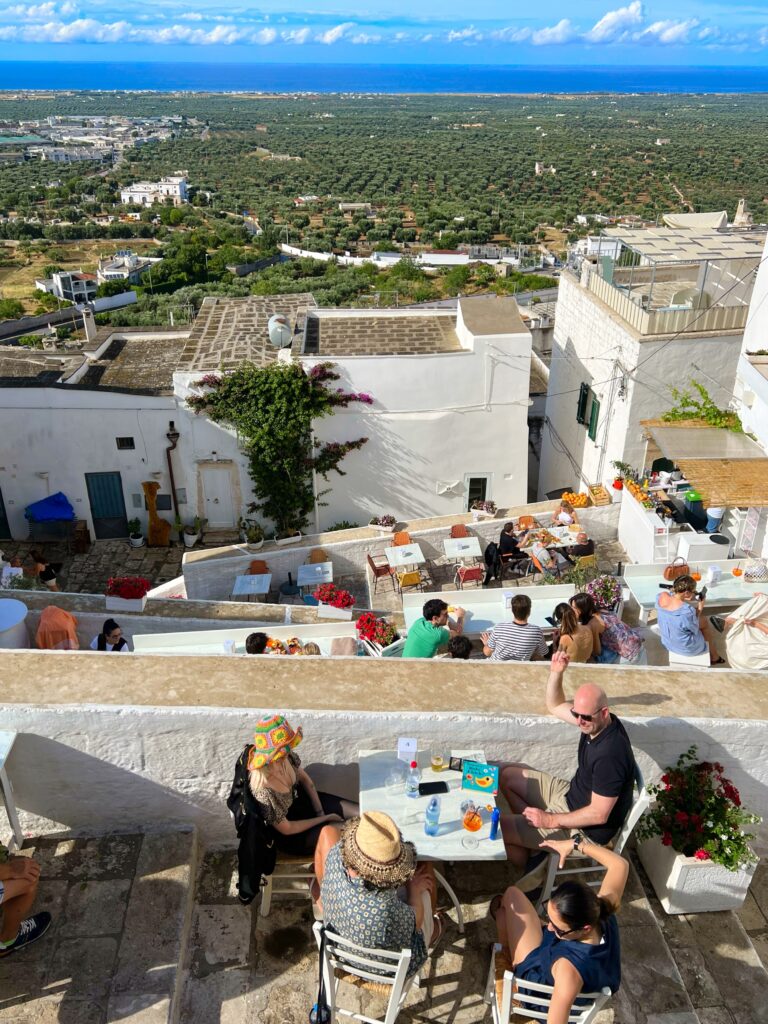
📍Via Fina, 8 | € – €€
Les cre’ fantastique | panzerotti eat in
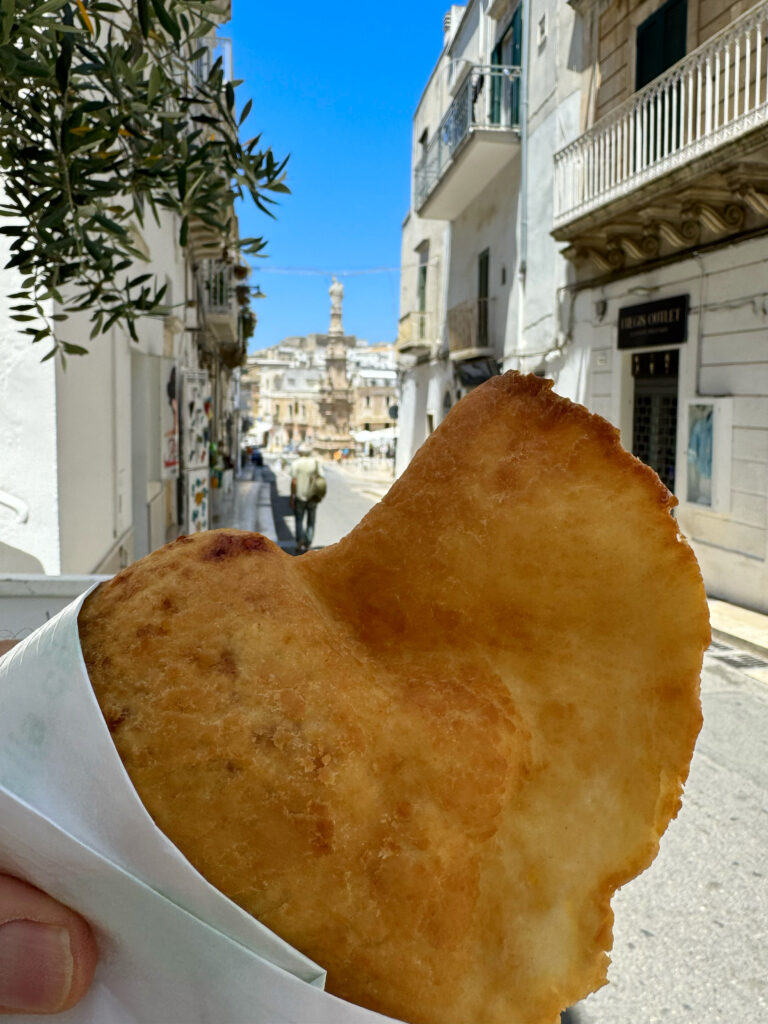
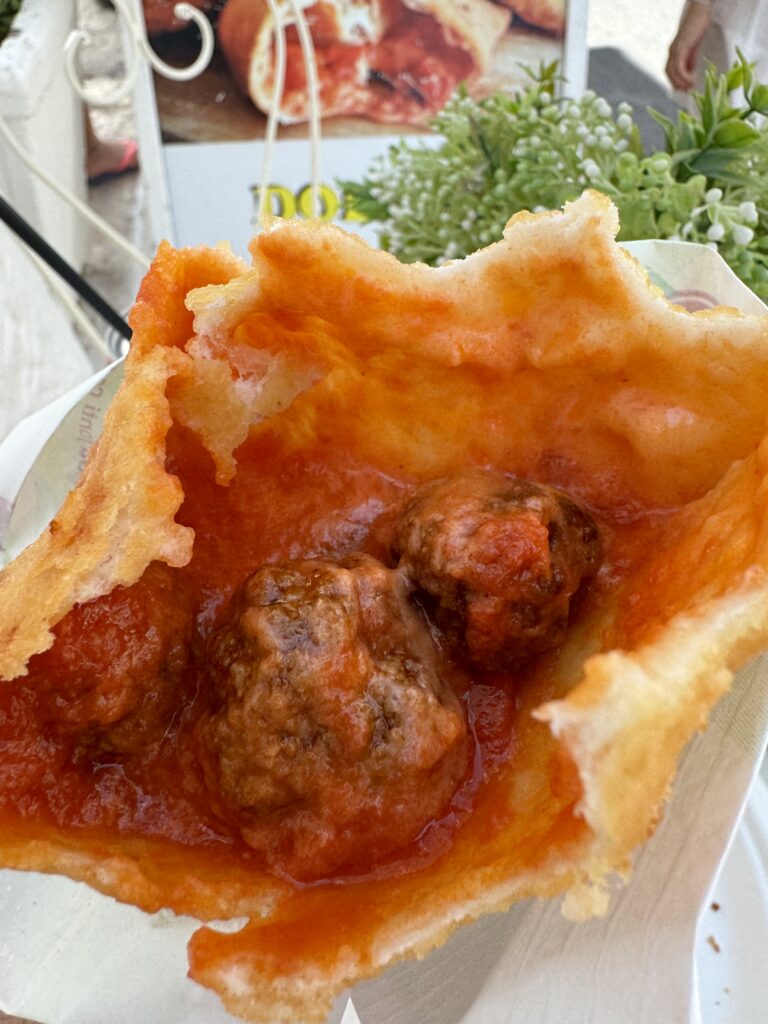
Panzerotti are one of Puglia’s epic street foods. Like a calzone pizza, only better! Les cre’ fantastique are tasty, filling and very inexpensive (classic €2,50). Watch them being made and fried in front of your eyes. Our favourites include the piccante panzerotto (with spicy salami, plus mozzarella and tomato), and the super tasty panzerotto with polpette della nonna.
📍Corso Camillo Benso Cavour, 22 | eat in, take-away | €
Asso di Spade | panzerotti to go
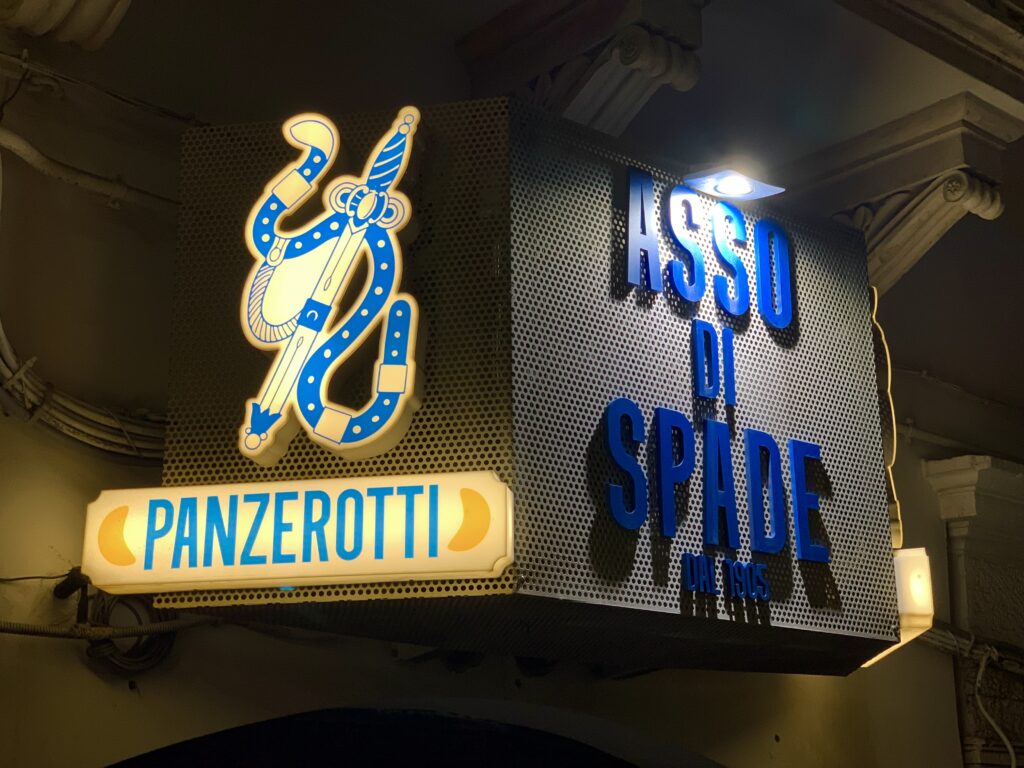
Asso di Spade has some great daily panzerotti specials including nduja, gorgonzola and guanciale as well as classic tomato and mozzarella. Hits the spot!
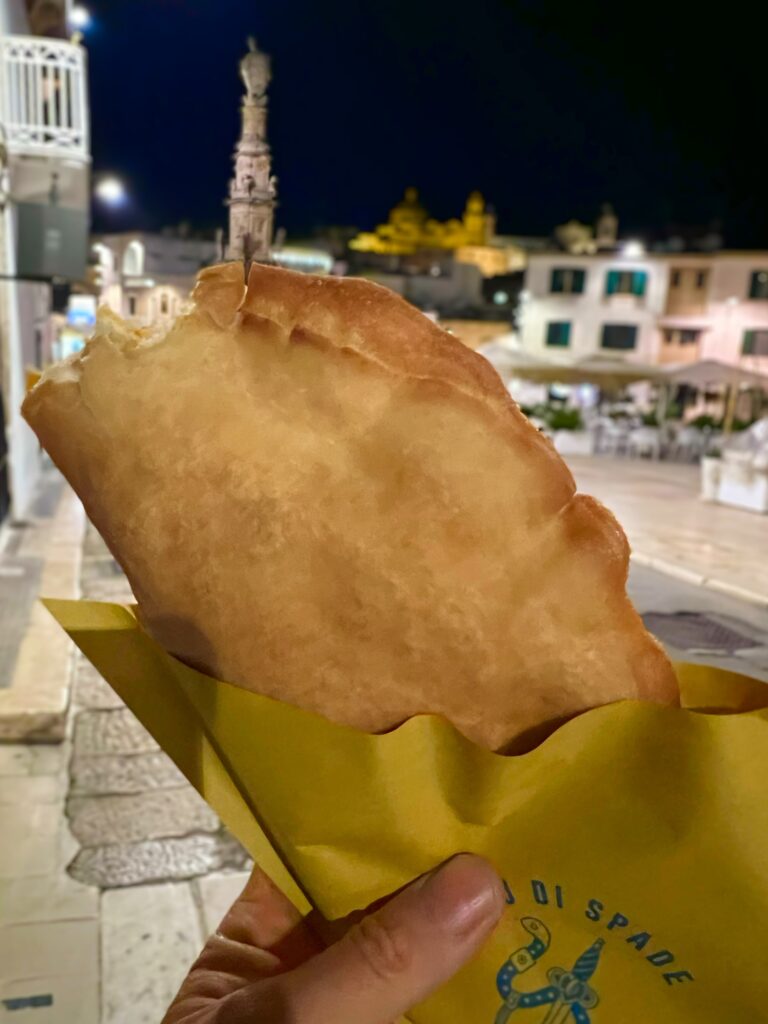
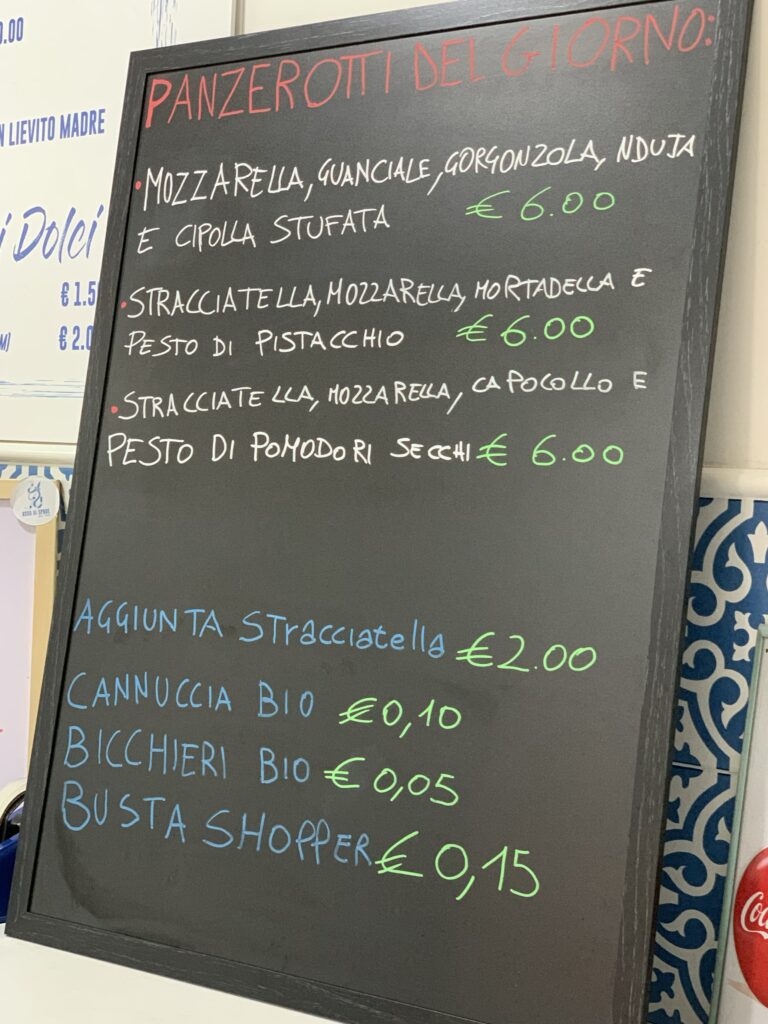
📍Via Benedetto Cairoli, 1 | take away | €
Gelaterie | for gelato artigianale
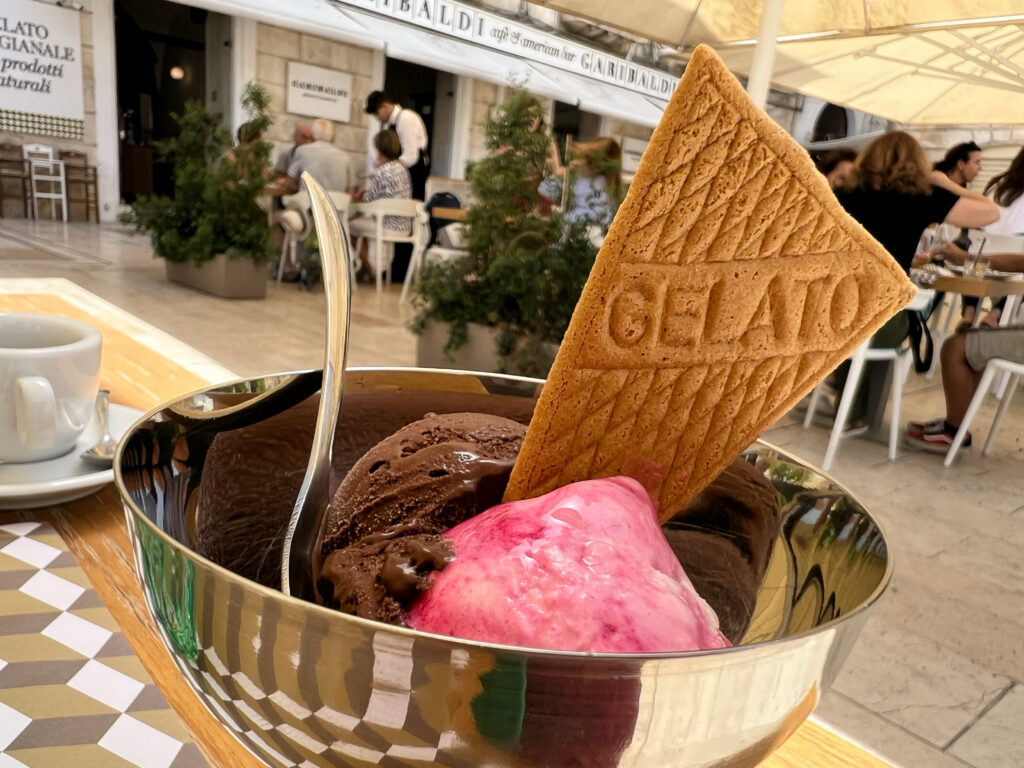
Bar Biancofiore (📍Corso Giuseppe Mazzini, 79) is a local favourite, known for its gelato. Flavours are limited to between 10-16 but that’s hardly a compromise! On the few times we have passed by and popped in, we found the gelato not to be as smooth as we usually find. There were many ice crystals as if it had part defrosted and frozen again.
However, we were in no doubt about the excellent gelato at Ciccio in Piazza Ciccio Pastigel Ostuni (📍Via Armando Diaz, 66). It’s just a little out of the way for visitors focussed on the old town. But it is certainly worth a visit, not just for the great gelato, but also its pastries.
Caffè Garibaldi on the main piazza (📍Piazza della Libertà, 52/53) has one of our favourite flavour combinations. Fondente, a deep dark chocolate, and amarena is a particularly spectacular combination. Caffè Garibaldi is our spill over lunch spot if we can’t get a table at Ostuni Bistrot. They have good pizza and they do a version of spaghetti all’assassina, but it is a variation on the classic crunchy, burnt version. Using spaghetti that is already cooked, it is more like a spaghetti all’arrabbiata.
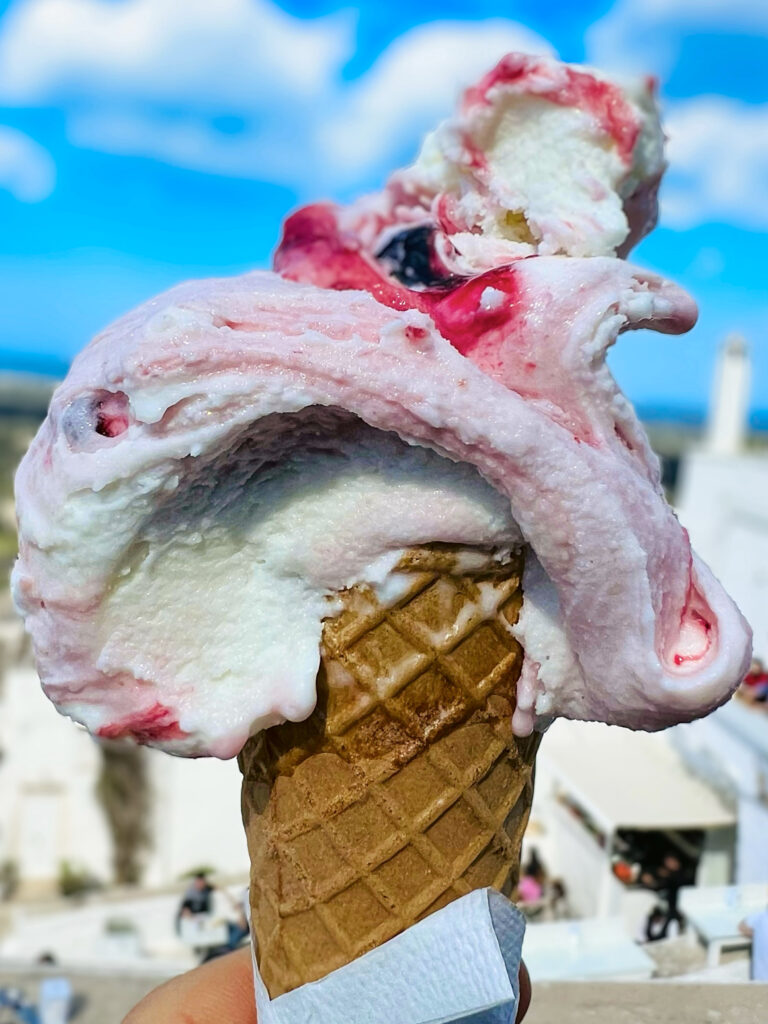
Alternatively head to the top of the centro storico. After the duomo and just beyond Arco Scoppa for the Gelateria Borgo Antico (📍Gelateria Borgo Antico).
Ostuni outskirts
Masseria Moroseta | fine dining
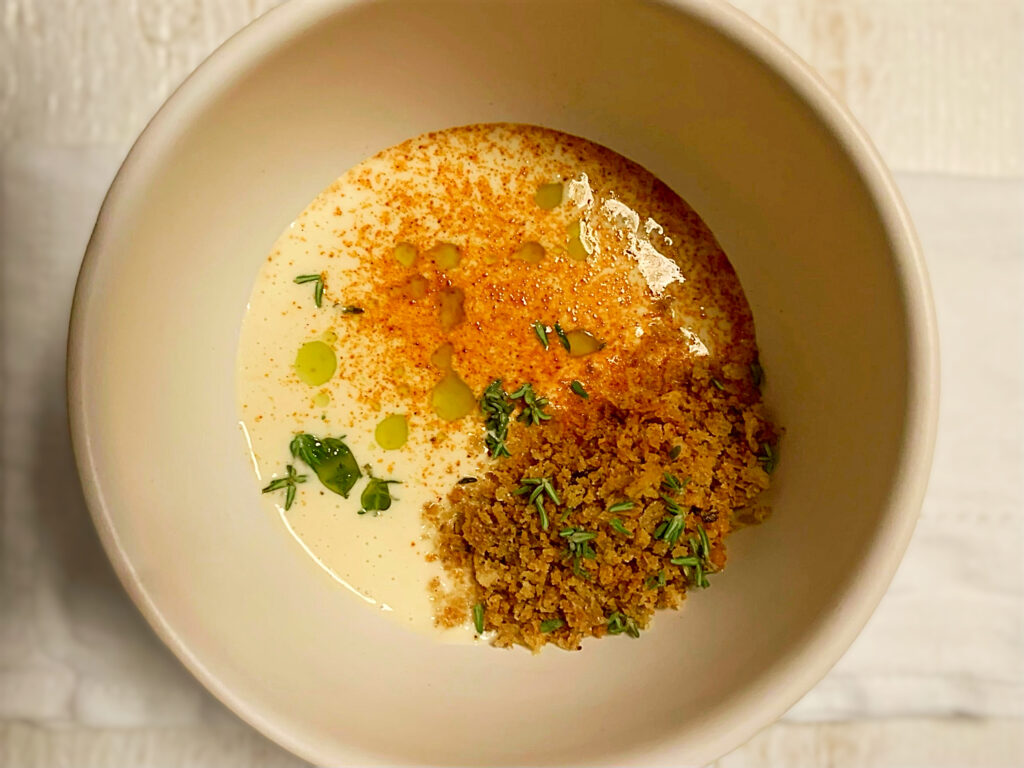
A modern take on traditional dishes in minimal surroundings. Expensive, but exceptional dining. A short drive from Ostuni en route to the main highway. Fixed menu, price on booking (booking essential, the restaurant fills up well in advance).
€€€€€
📍Contrada Lamacavallo snc, 72012 Ostuni
+39 338 18 99 199
Trattoria Il Cortiletto
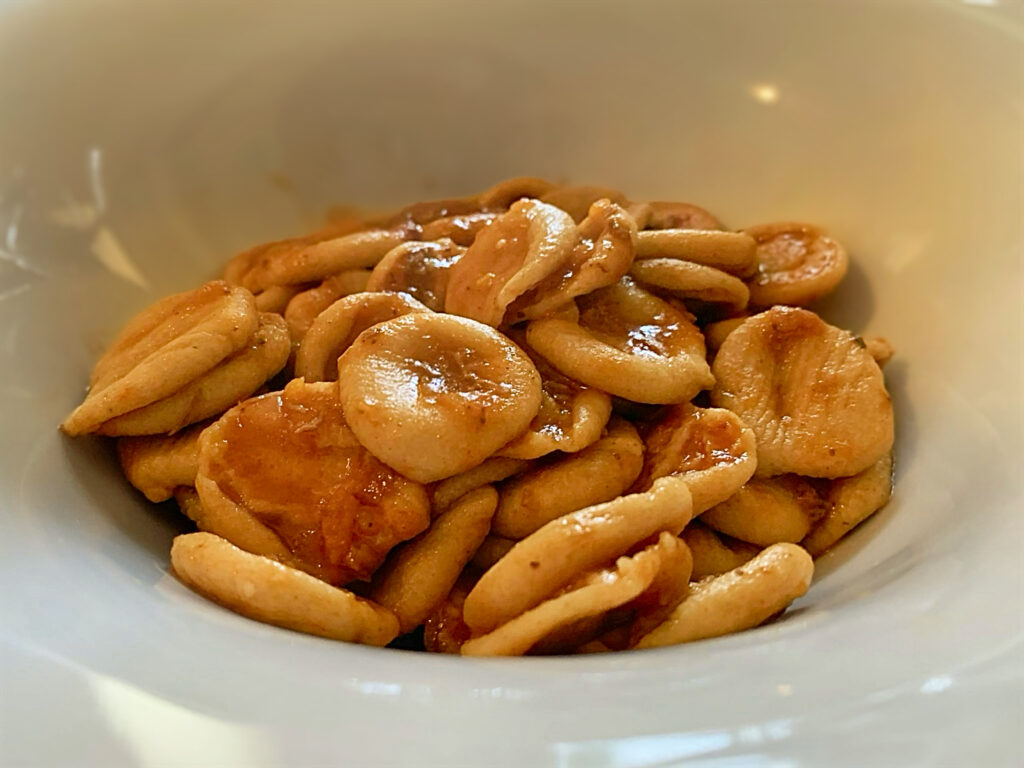
Good food in modest unassuming surroundings. A short drive from Ostuni en route to the main highway.
€€
📍Via Lecce 91, 72015 Speziale
+39 080 481 0758
Carovigno | 8km from Ostuni
Nearby neighbour Carovigno punches well above its weight with fantastic bars, restaurants and a really intimate old town. From a family run trattoria to a Michelin starred restaurant on the main piazza, and from a sizzling hot Naples pizzeria to an amazing Braceria grill restaurant (a speciality of the region), it has a top choice of places to eat at.
Where we avoid
RICCARDO caffè
You will find this on the far side of the old town, on Via Gaetano Tanzarella Vitale, 61 just along from Osteria Del Tempo Perso.
Offering aperitifs and cocktails in a cave setting with a trendy outside seating area marked by beanbags up and down the stone steps, beware of being overcharged and paying for unexpected extras. We pointed out that it was not permitted to charge more than the menu price, required to be displayed by Italian law. We were refunded but in what we considered a very aggressive, confrontational and threatening manner, we were ultimately asked to leave, and escorted off the premises.
Osteria Del Tempo Perso
When we visited we were disappointed with the quality of the food, which we found overpriced and very ordinary. This restaurant is often highly recommended by tourists for its traditional cuisine. The majority of its customers are tourists, who recommend it to other tourists. It would be unusual for locals to eat there.
Casbah Risto Café
Trendy bar just off the main Piazza adjacent to Sant’Oronzo’s column. A prime location but with matching premium pricing. At 15€ the most expensive Aperol Spritz on the piazza. Do not sit there without checking out the prices first! Just 10 metres away on the other side of the column, at Fanelli an Aperol Spritz served with snacks costs much less than half the Casbah price!
More | for reviews and thoughts on other Ostuni restaurants, bars and eateries, check out our #EatOstuni Guide.
This is our insider guide to Ostuni’s best and best value bars and restaurants for eating out in Ostuni.
2. Life’s a beach | the best beaches nearby Ostuni and beyond
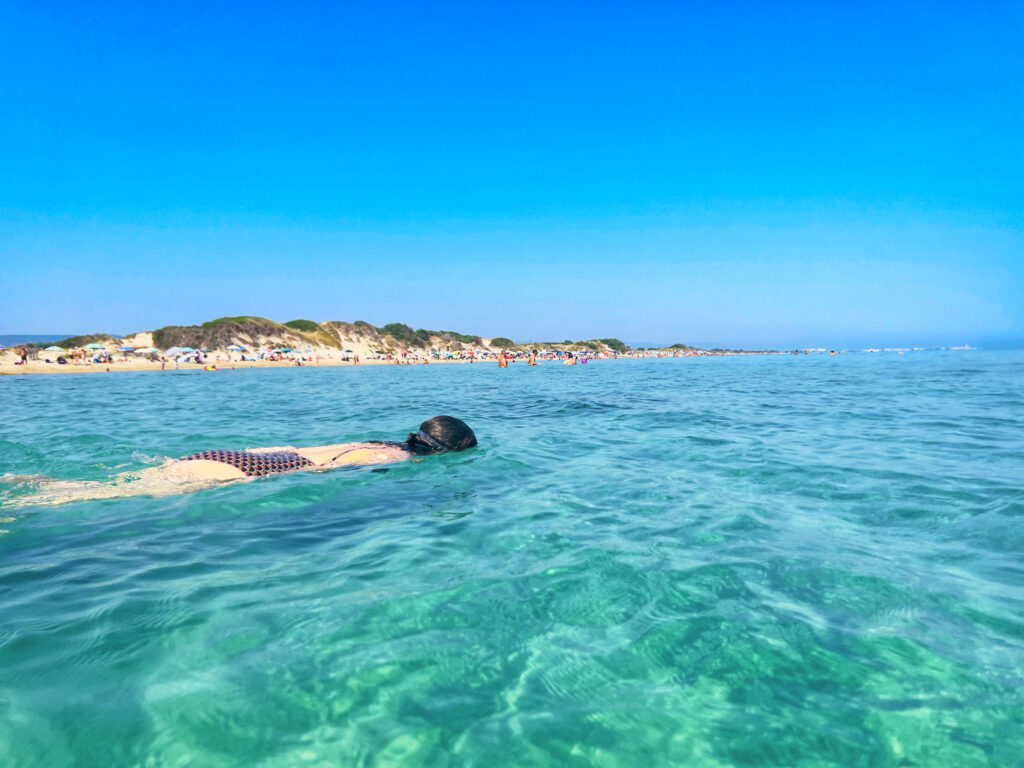
The stretch of the Adriatic coast from Bari south has more rocky coves than the endless strips of sandy beach you will find on the Ionian coast. Nevertheless there are some fine sections to enjoy, especially around Ostuni.
Savelletri
Long stretches of sandy beach. Many private lidos with loungers, umbrellas, bars and restaurants but fewer free public beaches.
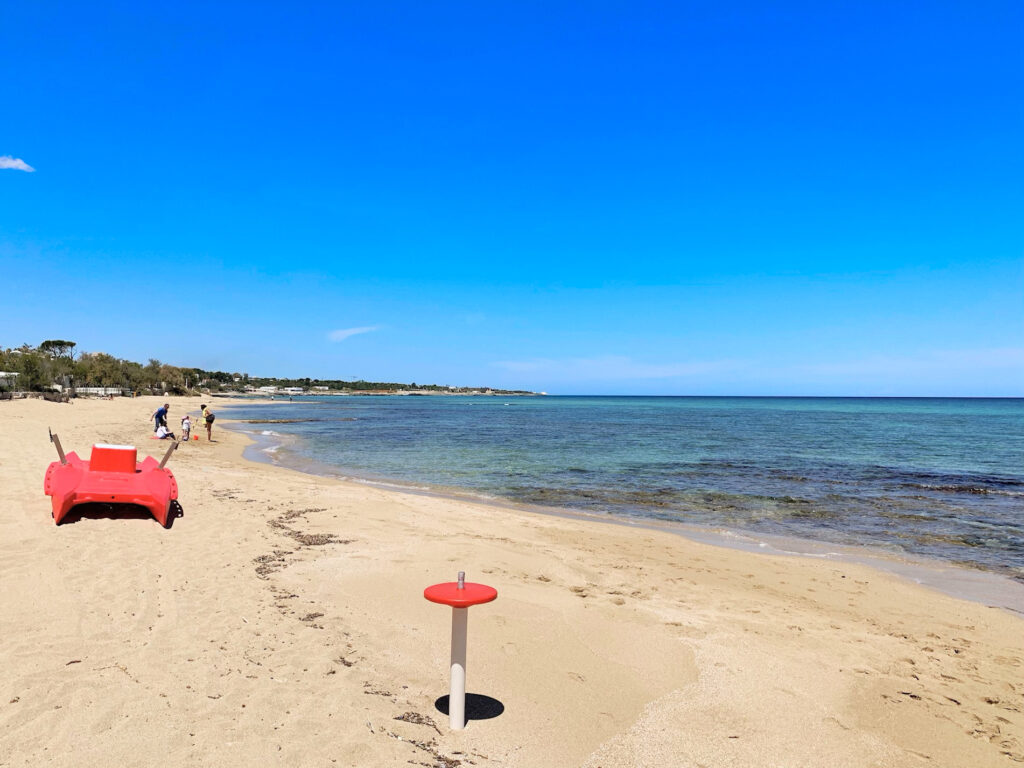
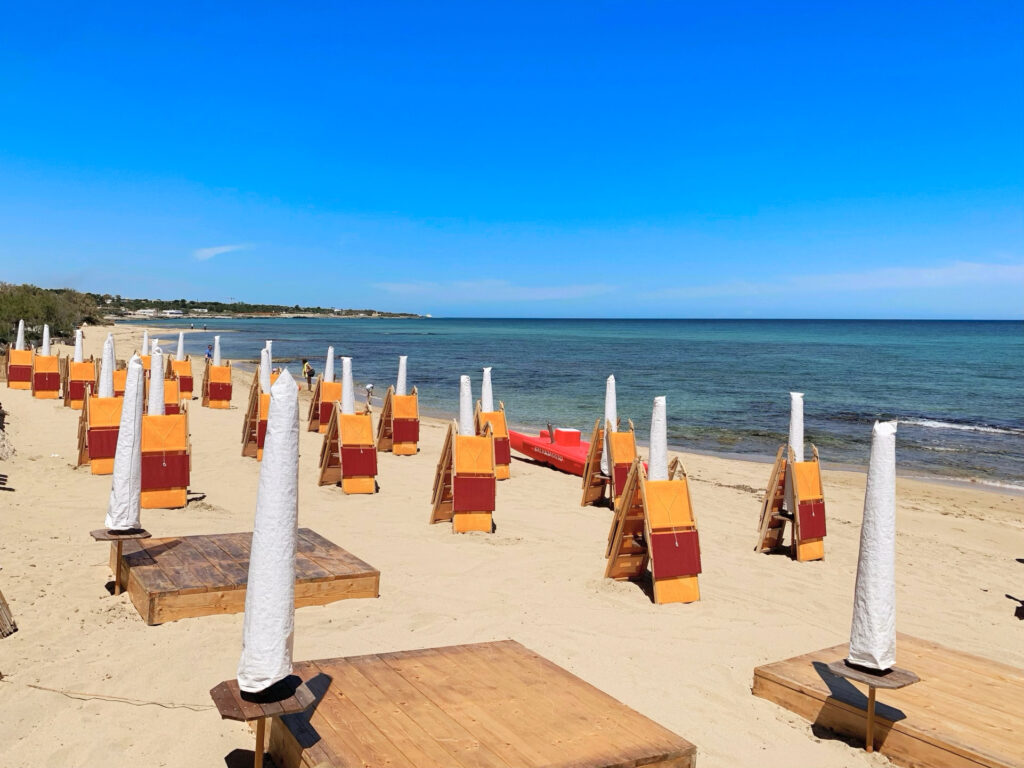
📍Savelletri Beaches SP90, 72015 Fasano (BR).
Torre Canne
Long stretches of public, sandy beaches. Popular with families and sports enthusiasts, there is canoeing and kite surfing.
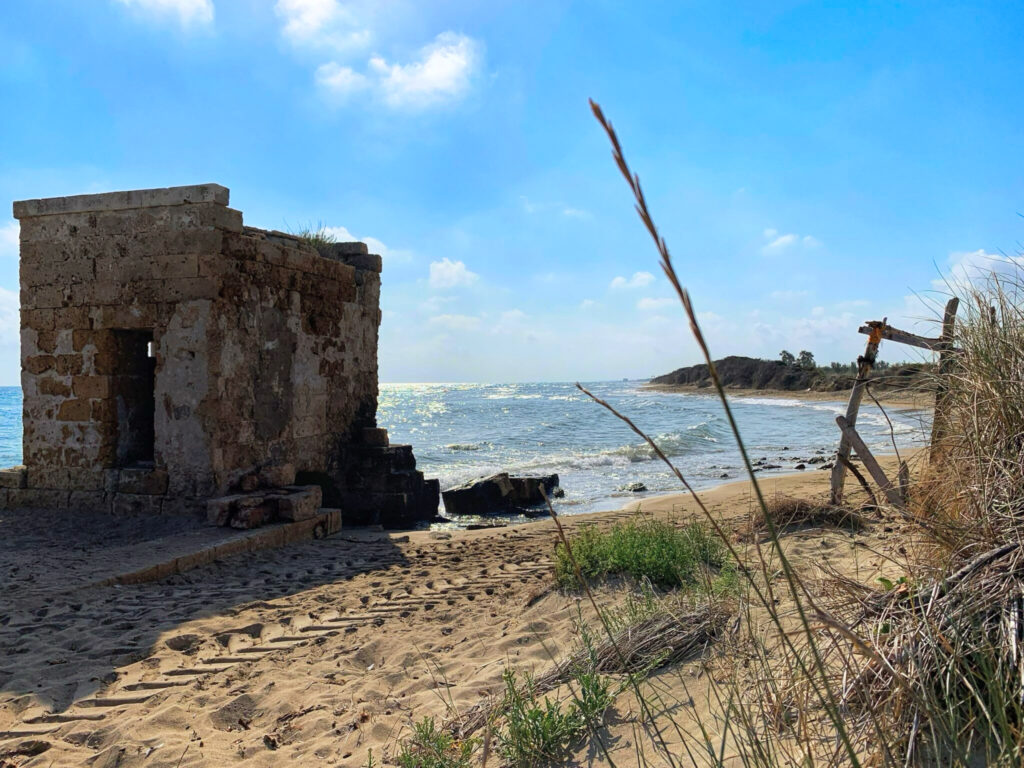
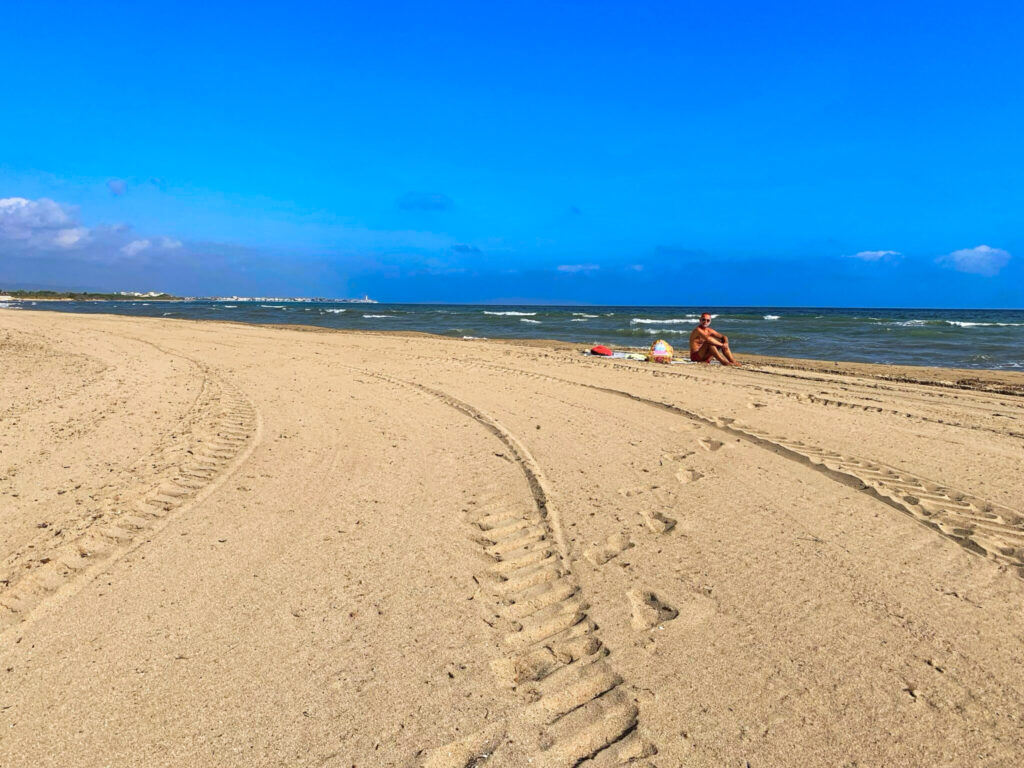
📍Spiaggia di Torre Canne, Via Eroi del Mare, 72016 Tore Canne, Fasano (BR) to Lido Morelli.
Pilone
Sandy beach, popular with residents of the camping and touristic villages nearby, who often arrange for residents’ beach club activities for kids, so it can get noisy!
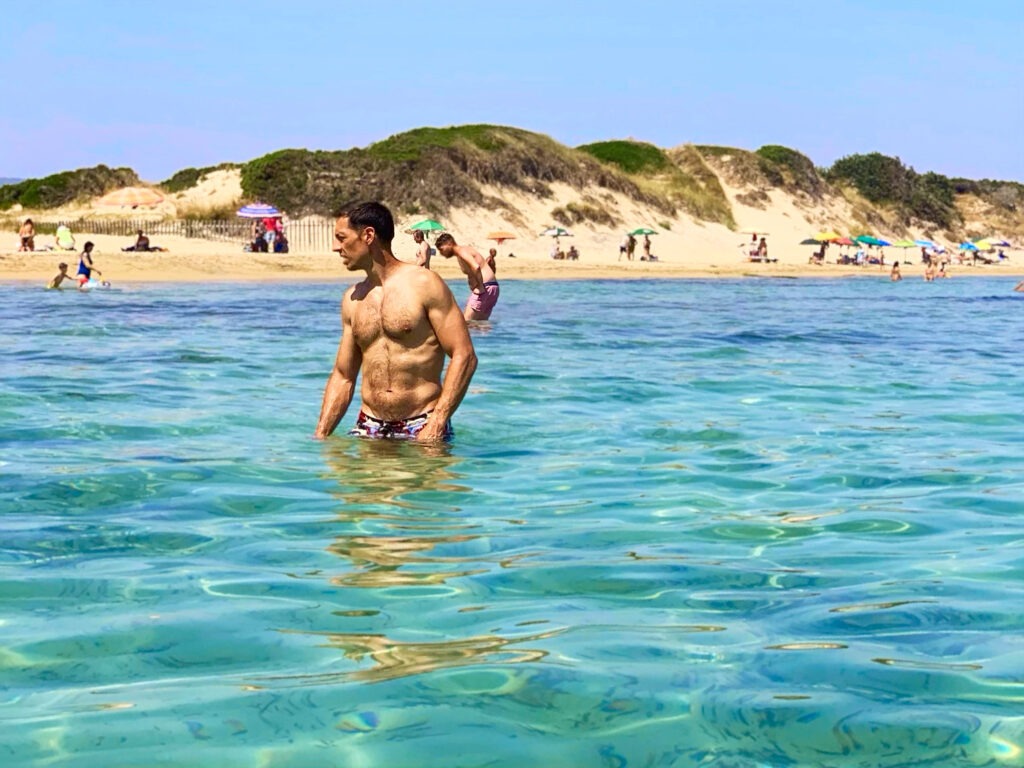
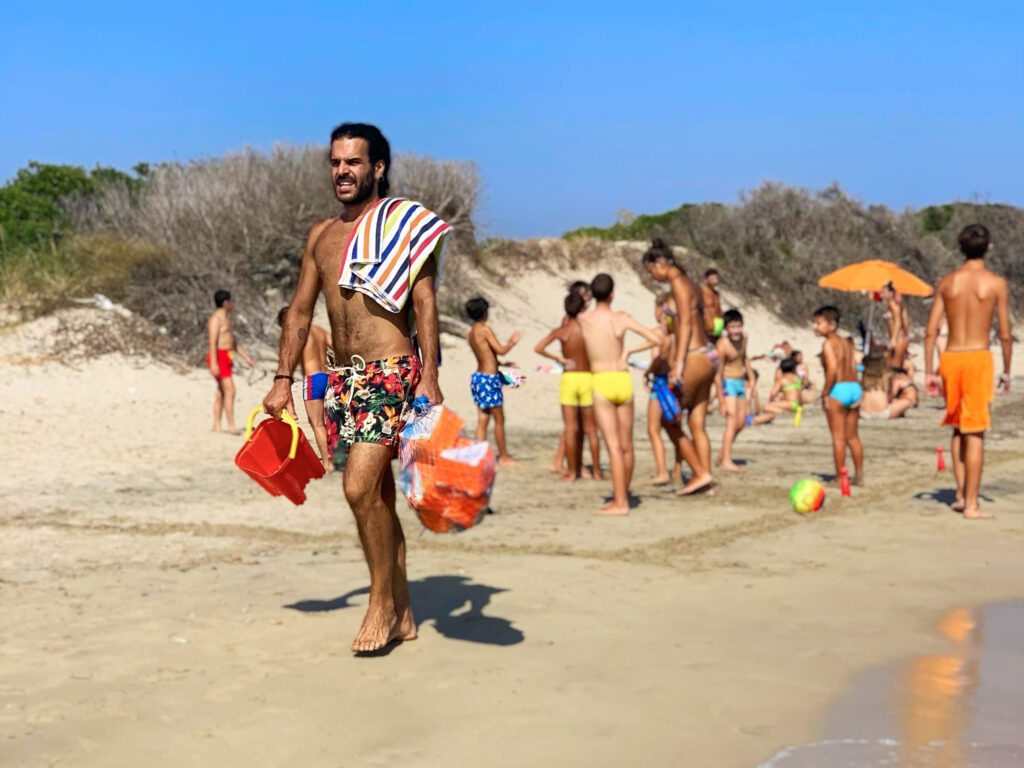
📍Spiaggia di Pilone, Torre Pilone, Ostuni, Via mare Adriatico, 72017 Ostuni (BR).
Torre Pozzelle | Lamaforca
Small sandy beaches in rocky coves, surrounded by pine forest. Both are popular with the families who stay in the nearby camping touristic villages.
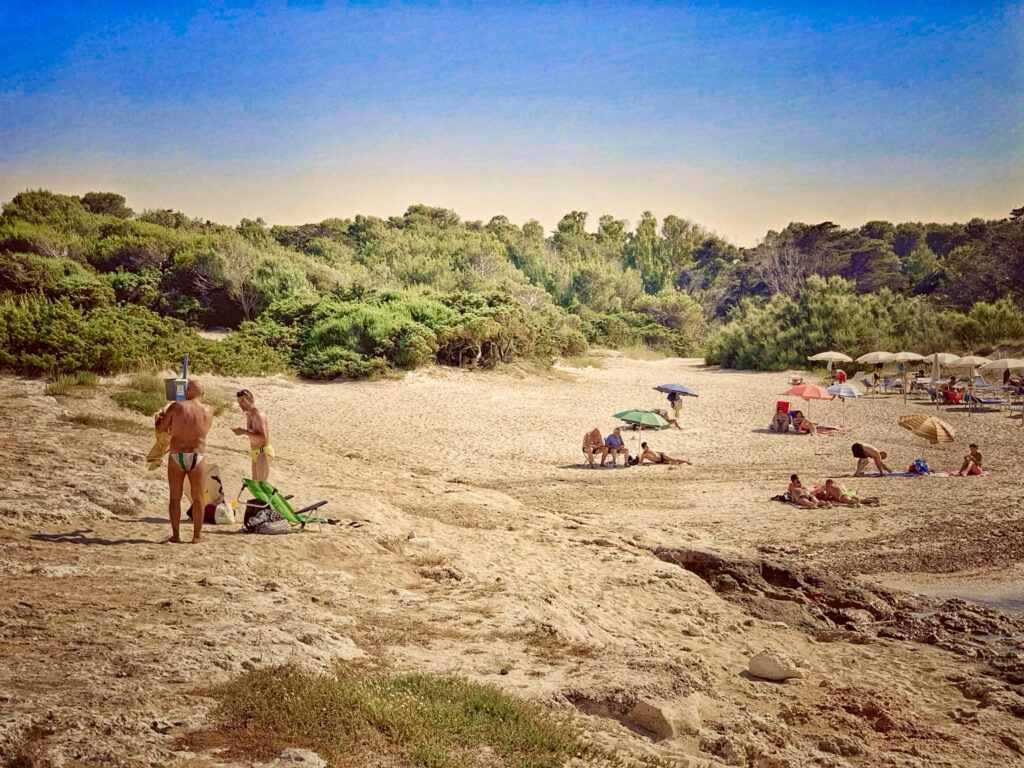
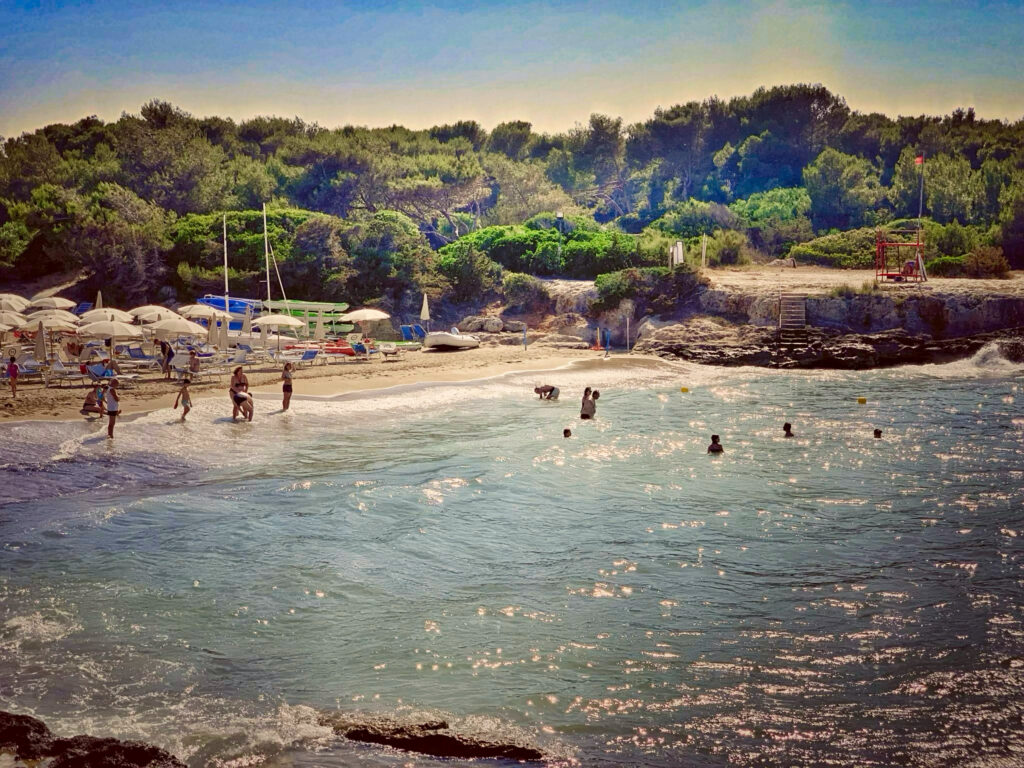
📍Spiaggia di Torre Pozzelle | 📍Spiaggia di Lamaforca, Contrada Lamaforca, Ostuni.
Specchiolla
A selection of public beaches and private lidos. Approach from the south-eastern end from the highway Specchiolla exit. Usually we can find free parking along the way, but there are pay car parks by the lidos.
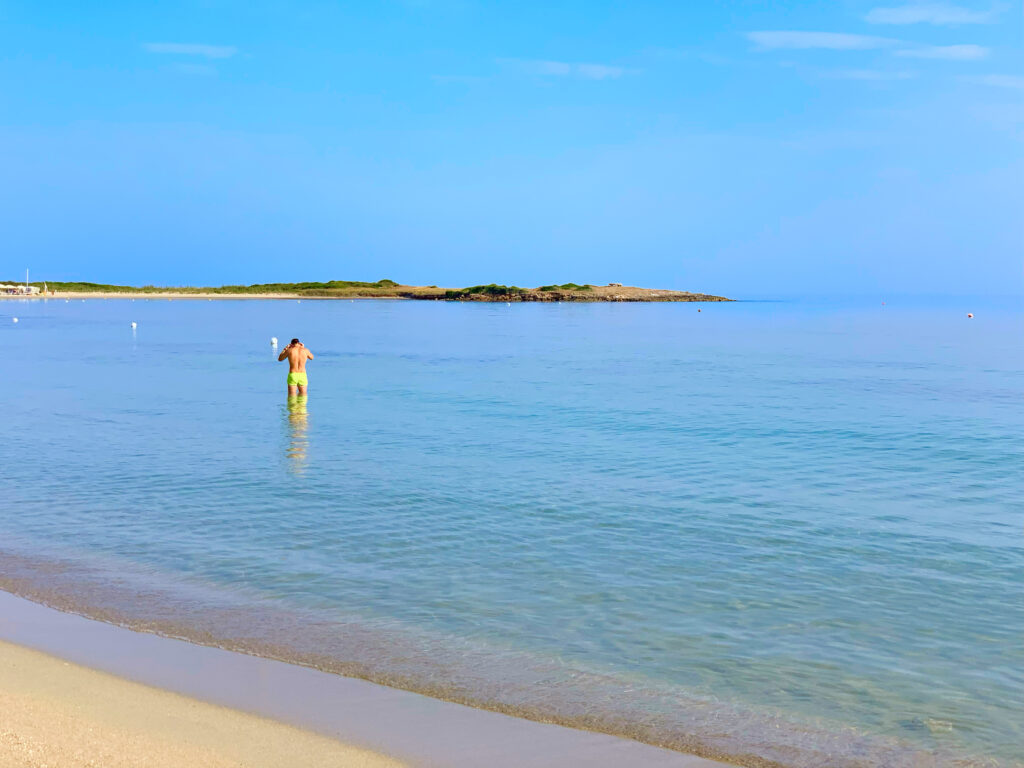
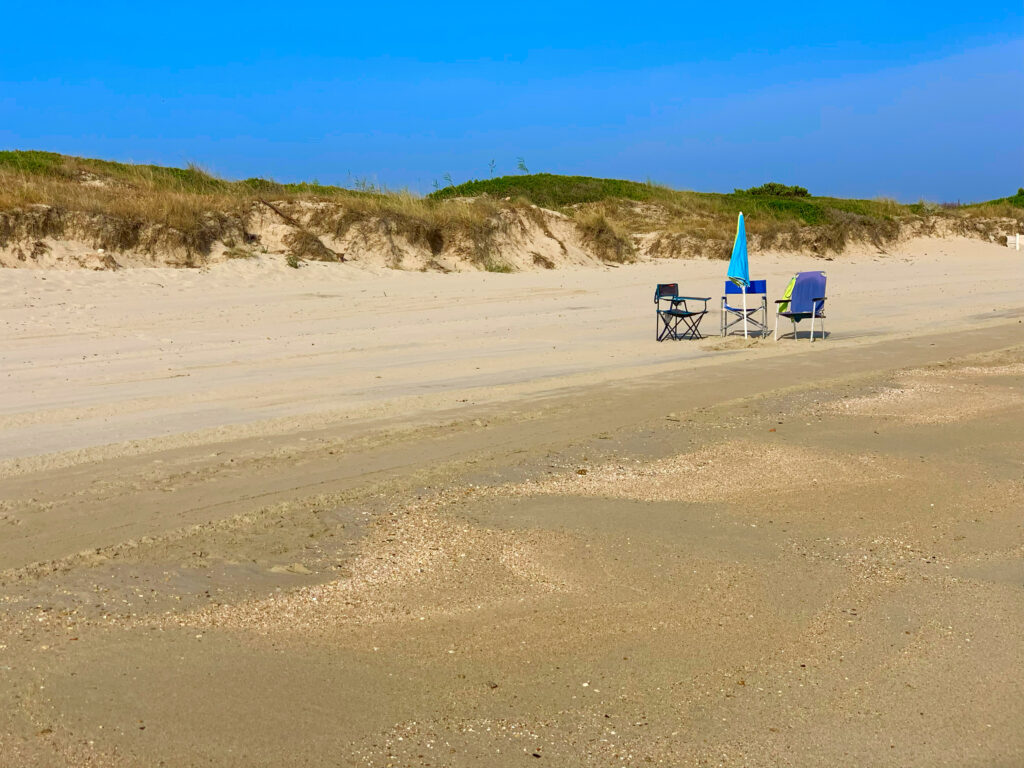
📍Specchiolla public beaches, Carovigno.
Punta Penna Grossa (Torre Guaceto)
The family friendly end of Torre Guaceto. Extremely popular, but you need to park in the not so nearby pay car park at the north entrance parking area for the Torre Guaceto nature reserve (by the Meditur Village) and take the shuttle trolly train (around 4 mins each way with waits up to 15 minutes).
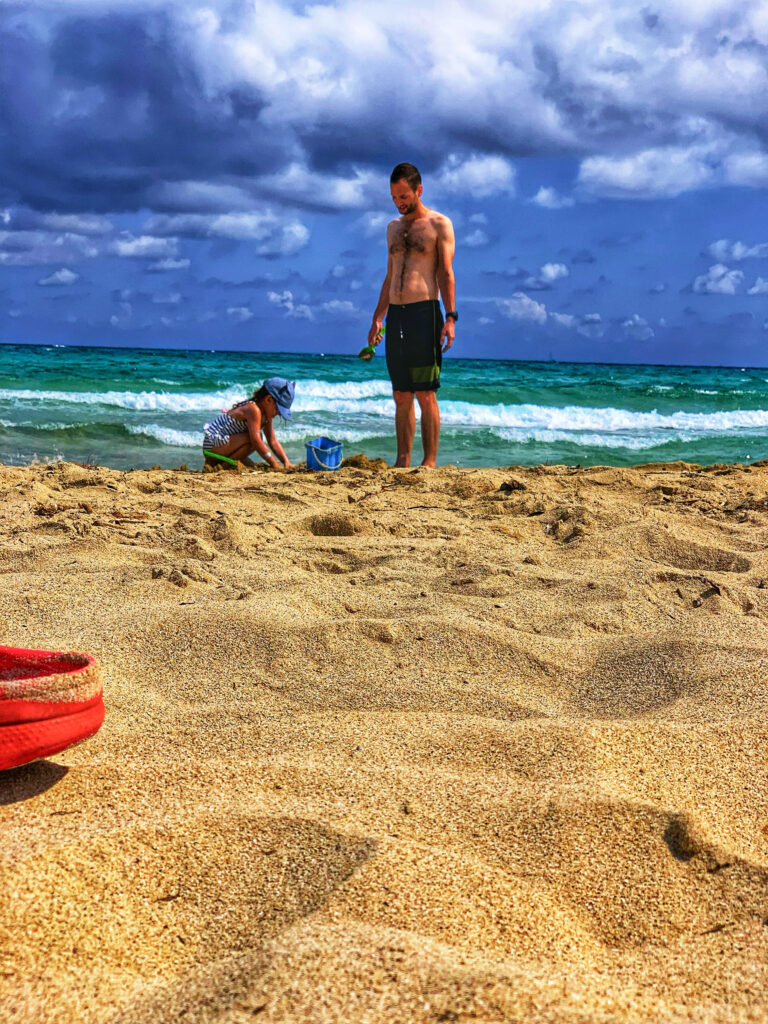
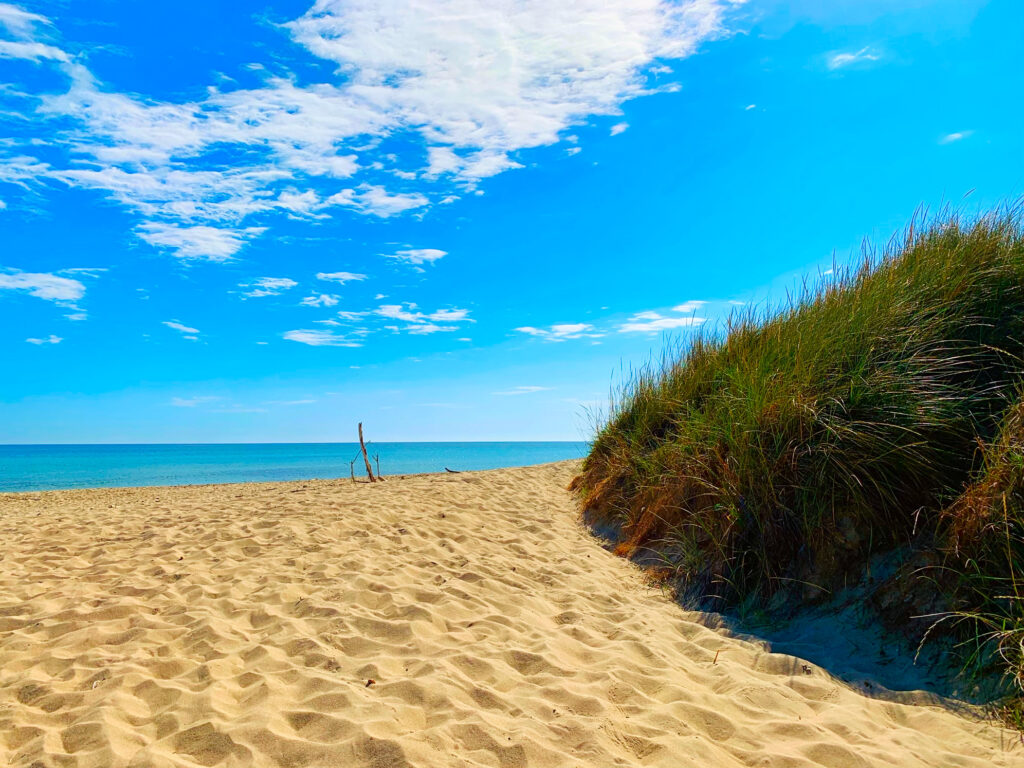
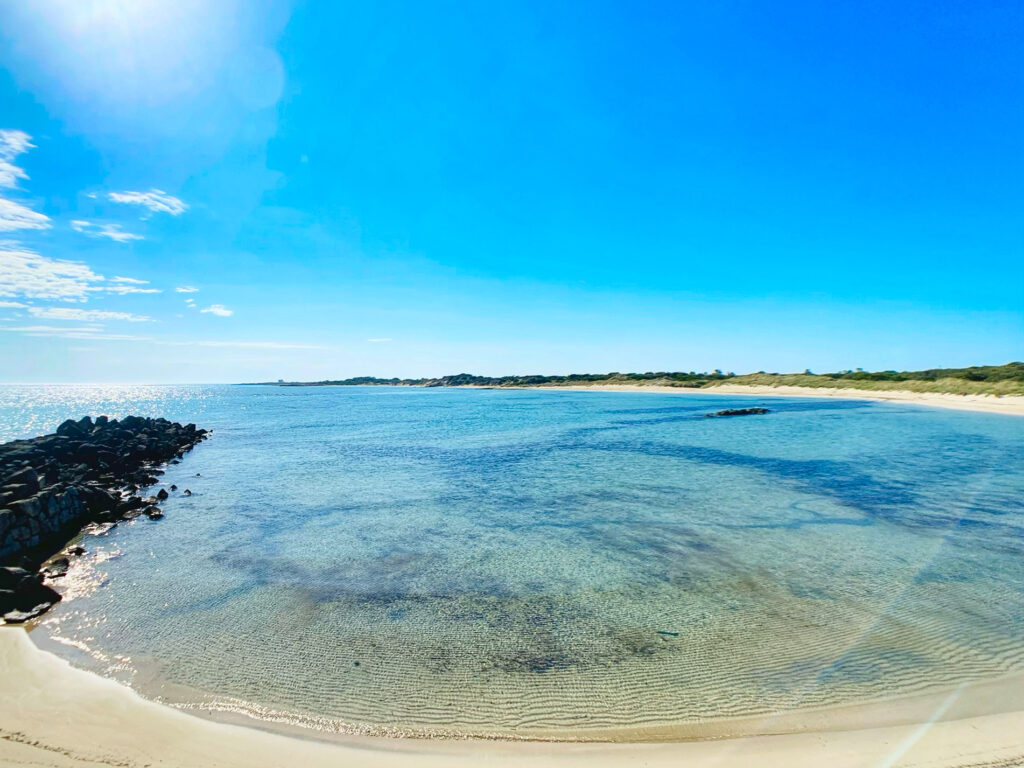
Punta Penna Grossa, Torre Guaceto.
Public Parking
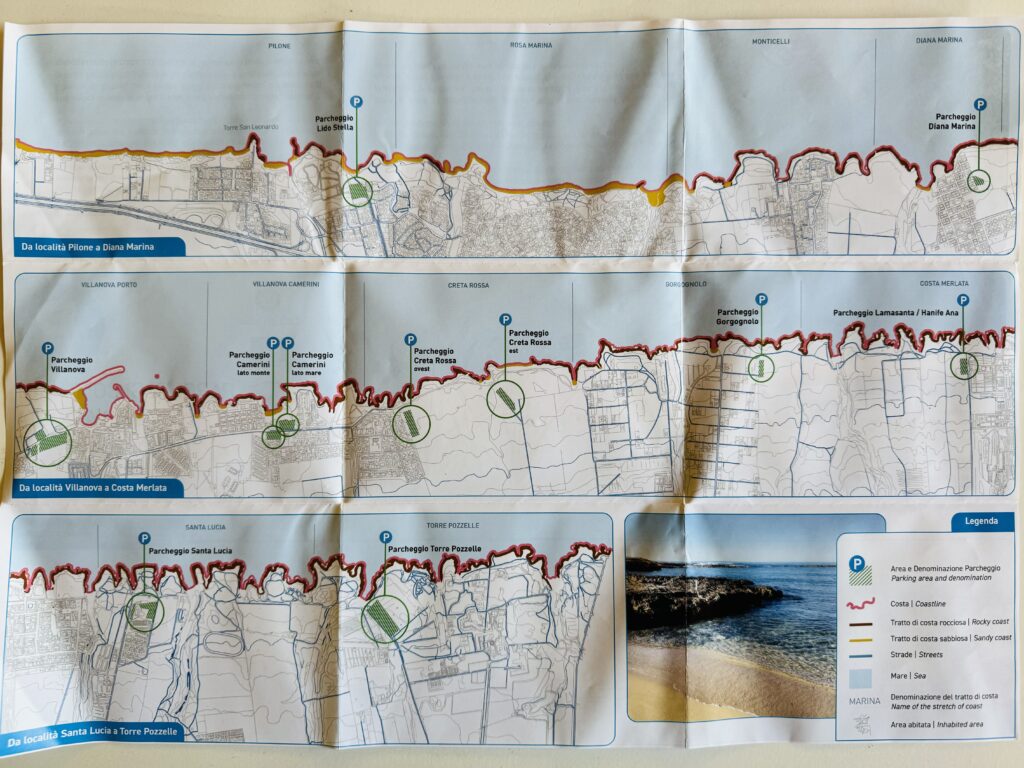
The municipality has set up free car parking spaces along the 17km stretch of coastline along Ostuni’s territory, to protect the amenity by discouraging off road parking elsewhere. Please use the car parking provided!
More beach | 50 of Puglia’s best beaches
Puglia has some of Italy’s finest coast. In 2023 it was awarded 22 bandiera blu awards for the water quality of its beaches, the most in Italy outside the Italian Riviera.
Check out our insider guide to 50 of the best beaches in Puglia.
3. La città bianca, Puglia’s White City | what to see and do
Loose yourself in its nooks and crannies as you explore the tangle of narrow streets and stairways of the centro storico.
From the Piazza della Libertà (main town square), with the baroque obelisk of Sant’ Oronzo (la colonna), along the Via Cattedrale up into the old town to the duomo, under the Arco Scoppa, to the selfie at La Porta Blu.
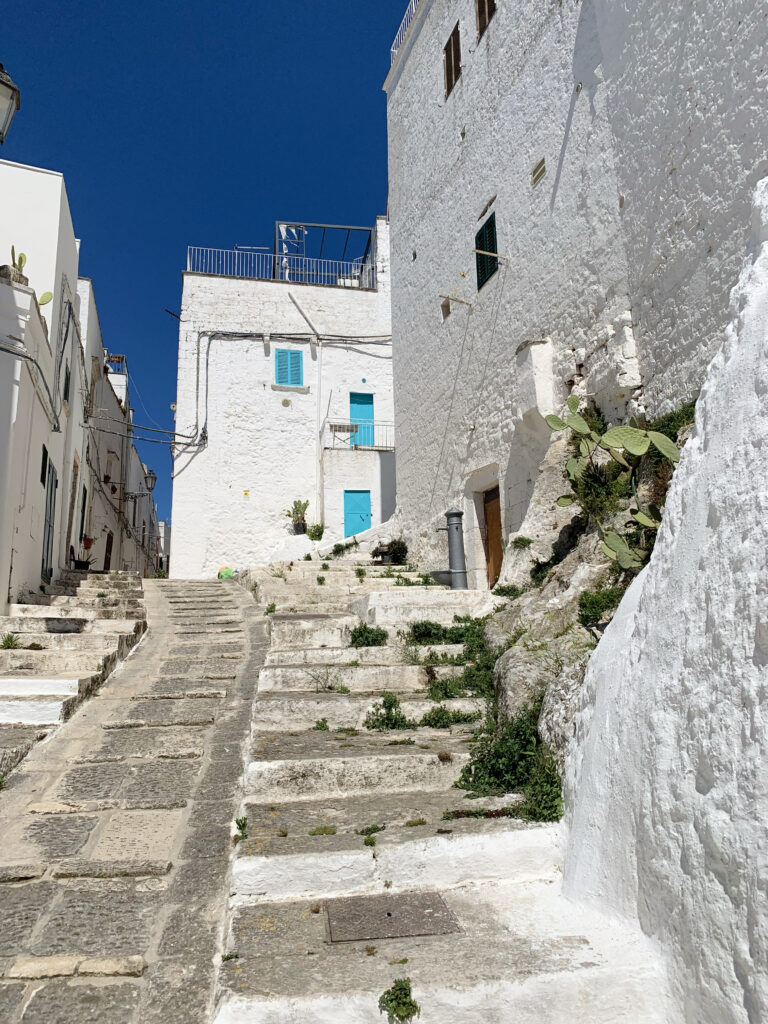
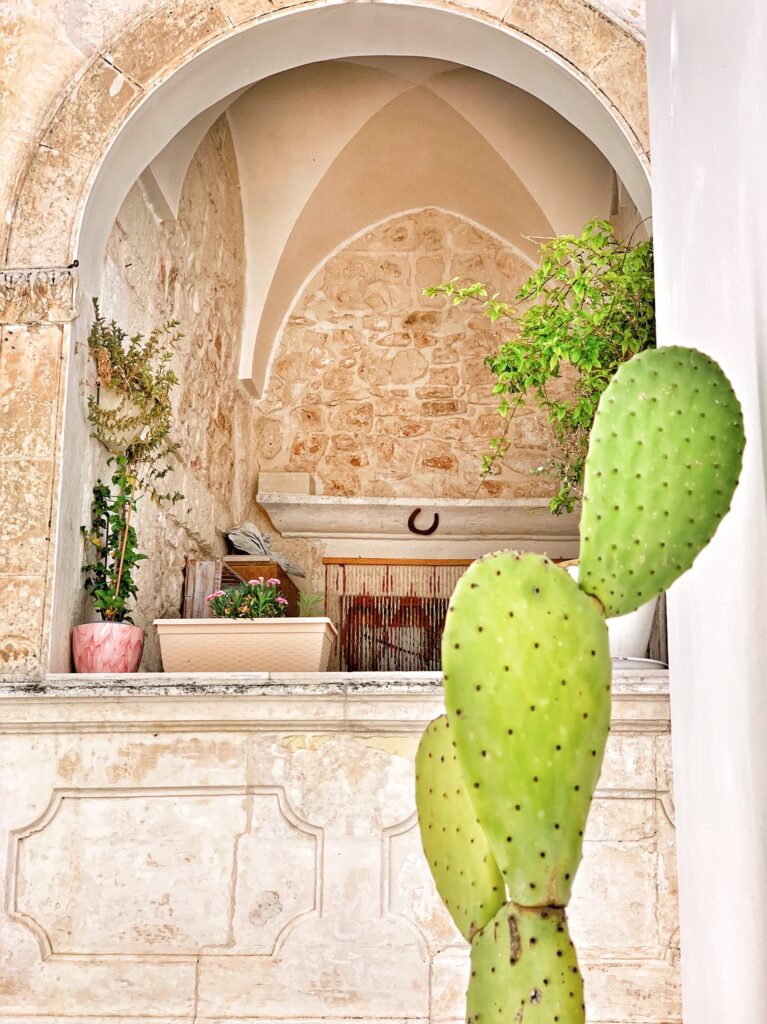
4. The best time to visit Ostuni
The city is at its most vibrant over summer when visitors swell Ostuni’s population from around 32,000 to over 100,000. We joke that in Puglia we only have two seasons: summer, and not-summer! Fortunately the ‘summer’ season is a long one. It starts in spring for Easter, and lasts through until the end of October.
From the end of October until the start of Easter, many bars and restaurants in and around the old town stay closed. During this period options for eating out – especially during the daytime – will be very limited. Although February is carnevale time, many of the bars and restaurants that are for local residents take an annual holiday, sometimes up to two weeks. After Ash Wednesday February can be particularly fallow month.
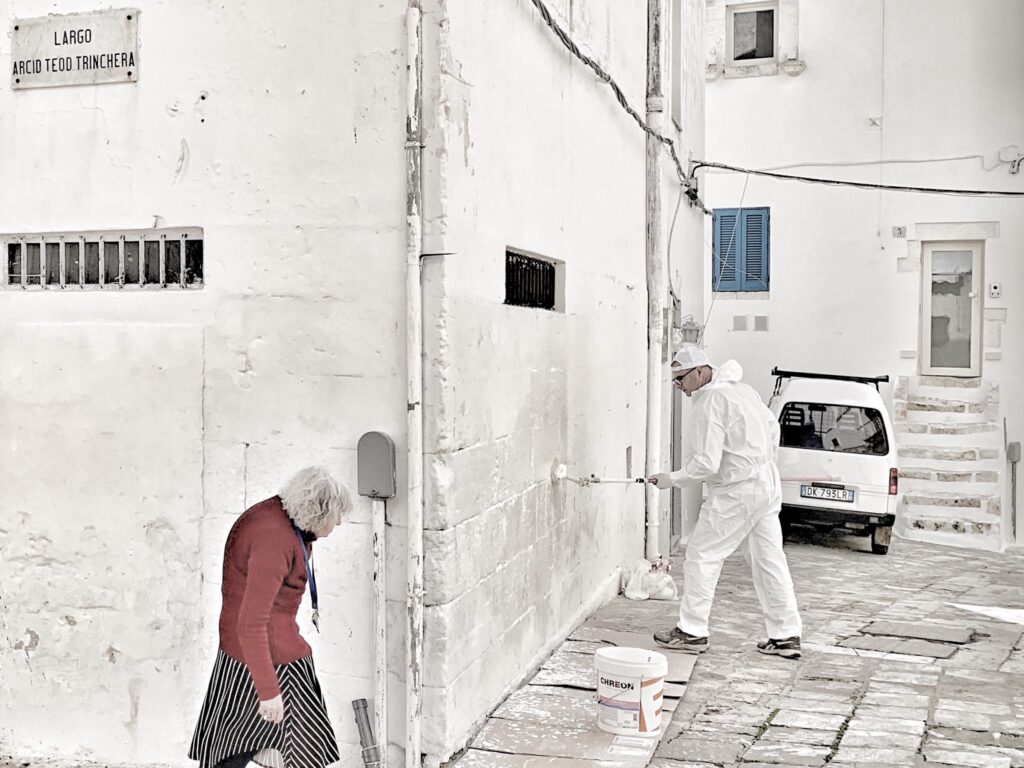
5. Aperitivo time | the best value Aperol Spritz on Ostuni’s main piazza
Ranging from 4,90€ to 15€, be careful where you choose to sit for your Aperol Spritz on Ostuni’s main piazza! Around the square Italy’s favourite aperitivo is served with a small ‘tris’ – a selection of 3+ small bowls from the following: olives, crisps (US chips), taralli, savoury crackers and peanuts.
Prices as at April 2024.
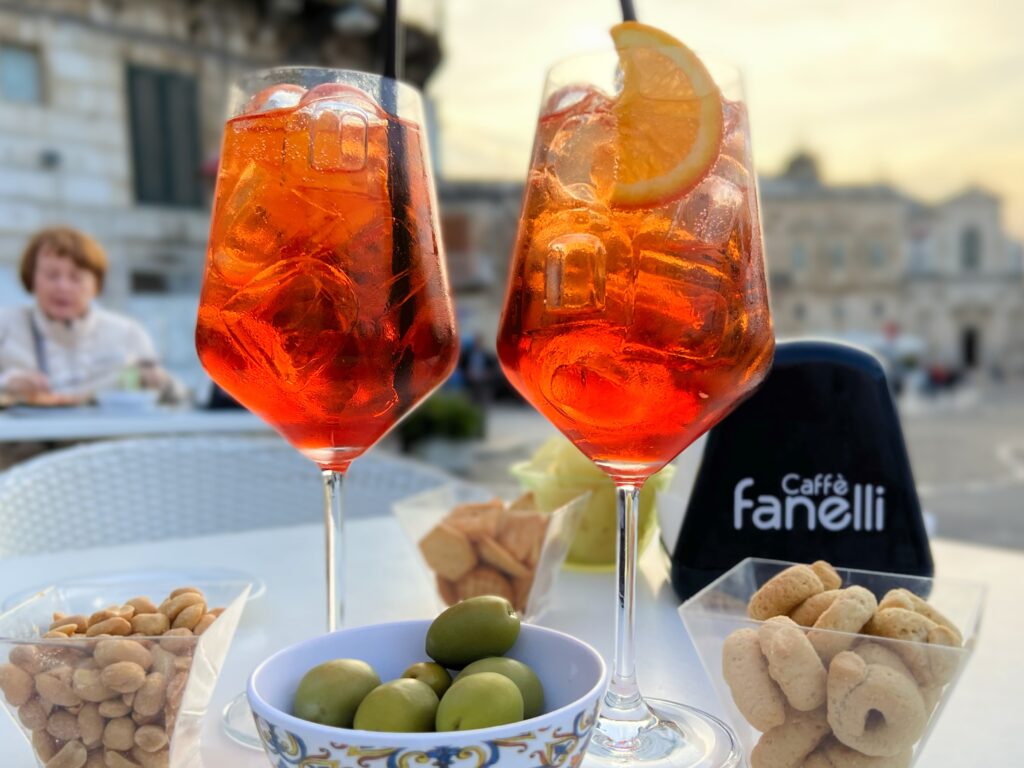
6. Day trip planning and road trips from Ostuni
Ostini is perfectly positioned as a base to explore the Valle d’Itria and beyond. From Ostuni Cisternino, Locorotondo, Alberobello, Monopoli and Polignano a Mare are all within easy distance, as also Lecce and some of Salento’s best beaches.
Check out the Puglia Guys essential Puglia day trip and road trip guide to plan your schedule from an Ostuni base.
7. Adding value to your Ostuni vacation
Experience a local pizzica night, in-villa home cooking, and ‘stray’ local to avoid overly touristy areas, for a slower pace of life that is typically Puglian.
8. Eating in | food and wine shopping
Delicatessen and supermarket
For small scale shopping, try the charming and friendly Chjanga de L’ora Bottega & Bistrot, run by Kattia. It is newly opened. They have a small selection of fresh fruit and veg, some wines and other essentials. They also have a small deli counter for cold cuts, cheese and bread. They also have hot and cold food to go. They can make a delicious panino, fresh to order (choose your meats, and filling). They also offer hot food, pasta to take away. In the morning they have a selection of breakfast pastries.
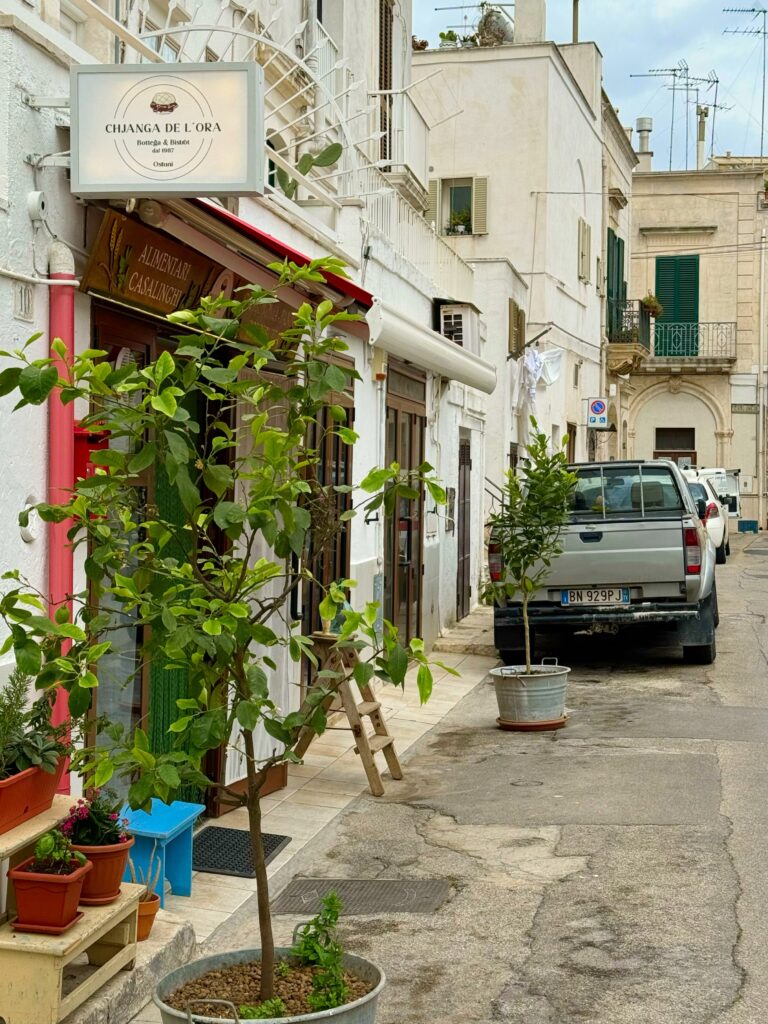
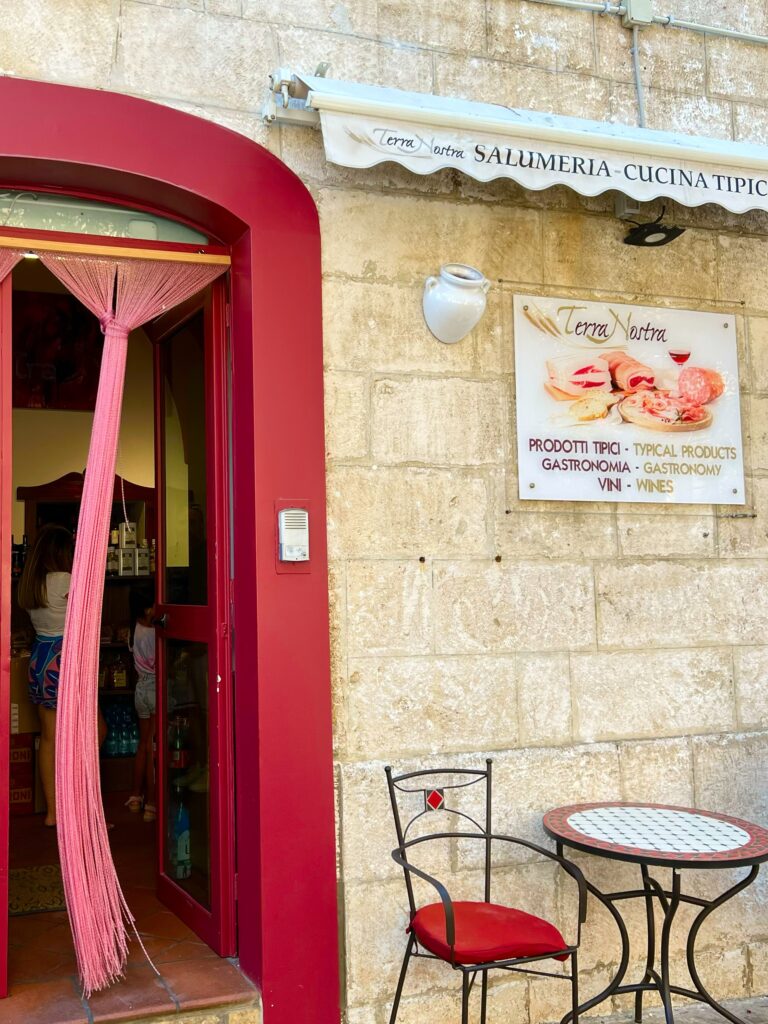
Along Corso Giuseppe Mazzini you will find Terra Nostra Salumeria e asporto Ostuni in similar style.
A local Despar supermarket is located at Via Armando Diaz, 17. Usually open between 08.00 – 13.30 and 17.00 – 21.00 (Sunday 08.30 -14.00).
If you want to stock up on food we recommend supermercato Famila, Via Pietro de Laurentis (on the main Ostuni ringroad). This is Ostuni’s largest supermarket, and a favourite with locals and summer visitors. They have great fresh fruit and vegetable, bread, cheese, fish and meat counters, as well as regular supermarket goods. They stay open during the afternoon.
Forno 31 is a fantastic nearby baker, perfect (especially in the morning) for fresh baked bread, focaccia and other daily oven baked treats. Vicolo G. Ferrari, 6.
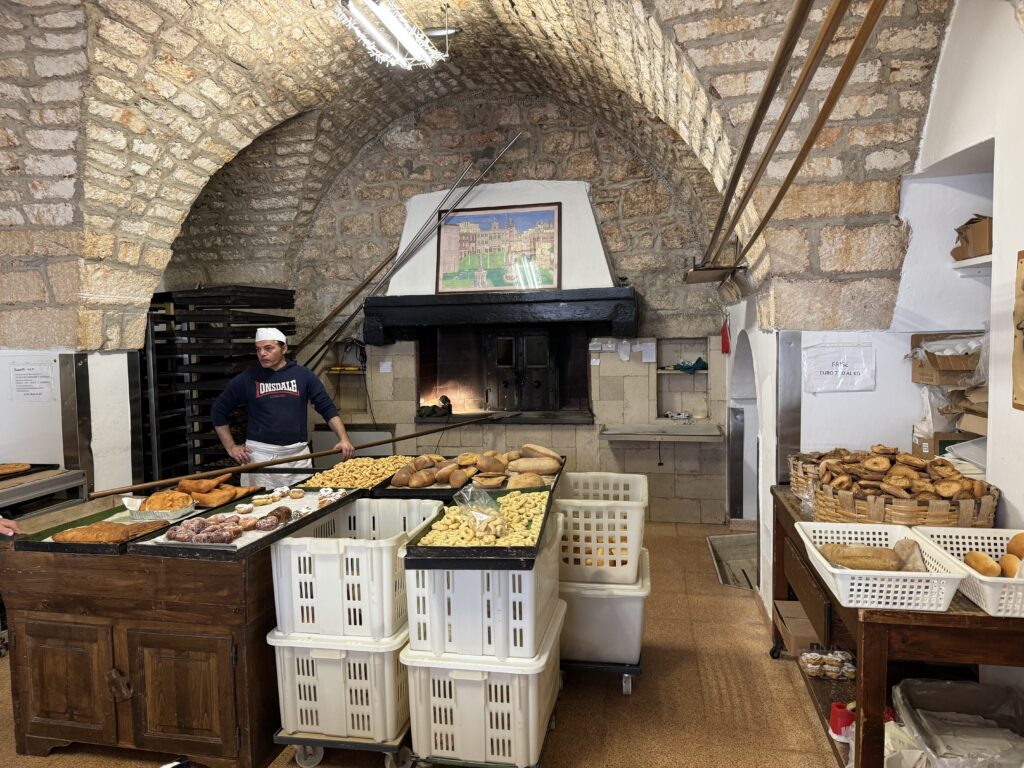
Wine
An exceptional range of Puglia wines at reasonable prices can be found at Enoteca Vini di Puglia wine store adjacent to the Famila supermarket. It’s where we shop for almost all our wines. They are closed during the afternoon pausa. Because they only stock wines from Puglia they don’t have Prosecco. Moinetto bio suits us well (around 9€). You will need to get this from Famila.
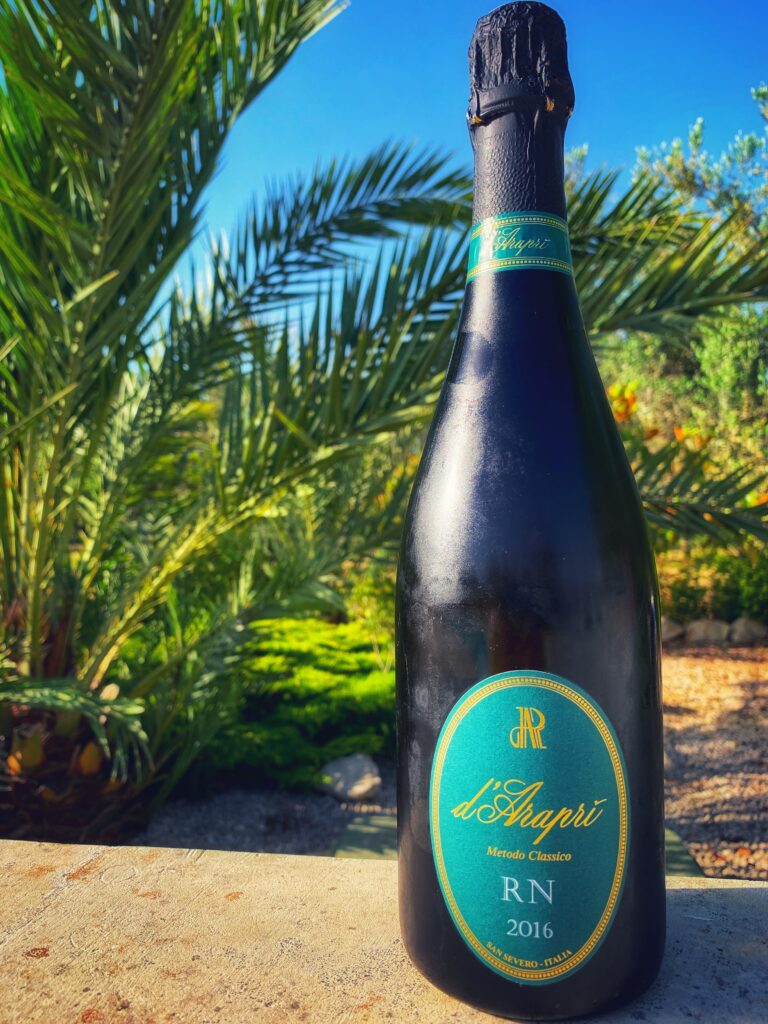
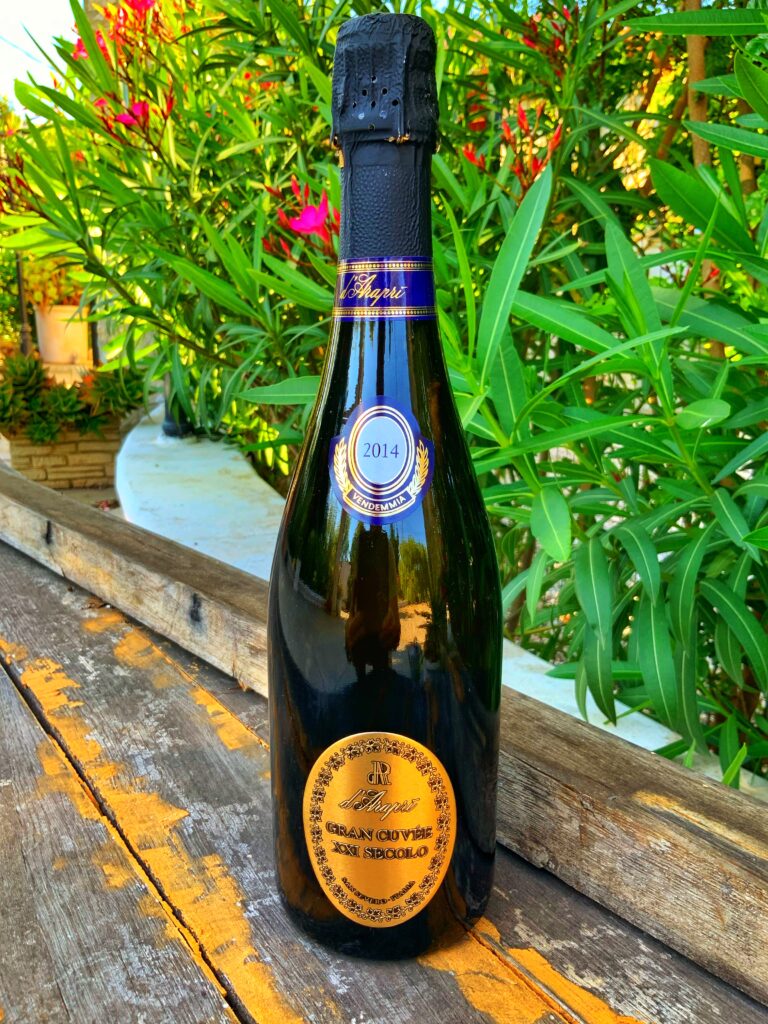
However we recommend d’Arapri spumante from San Severo in Gargano (around 18€). On special occasions we but the Gran Cuvée (28€).
Other wines we regularly buy from there include:
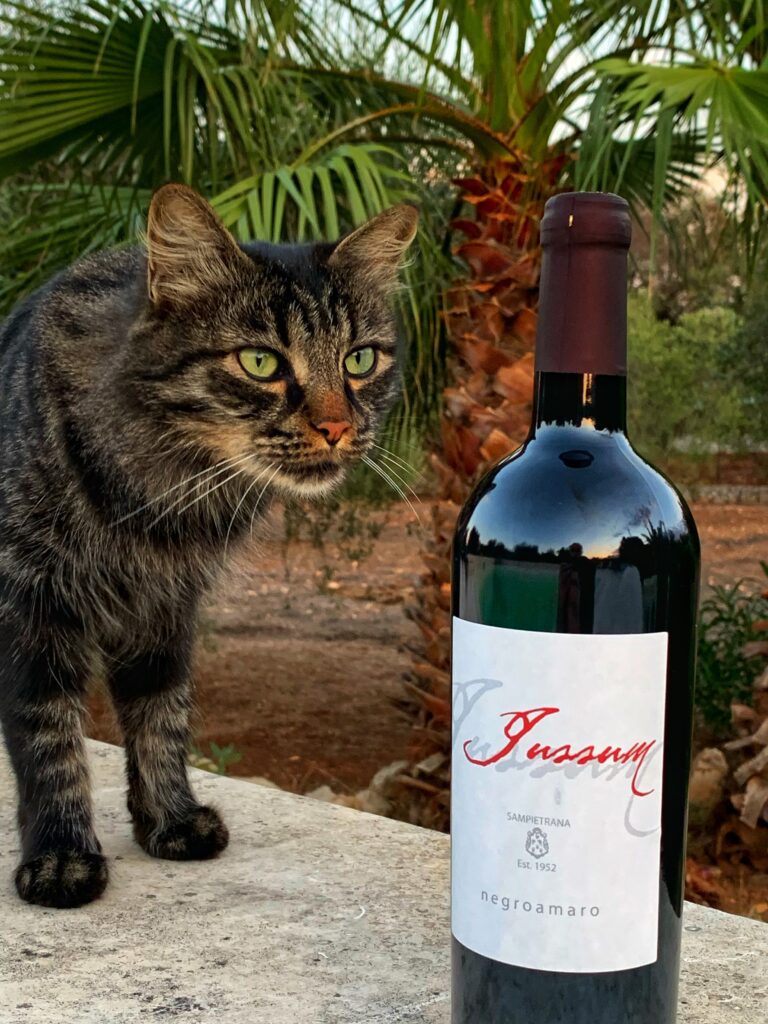
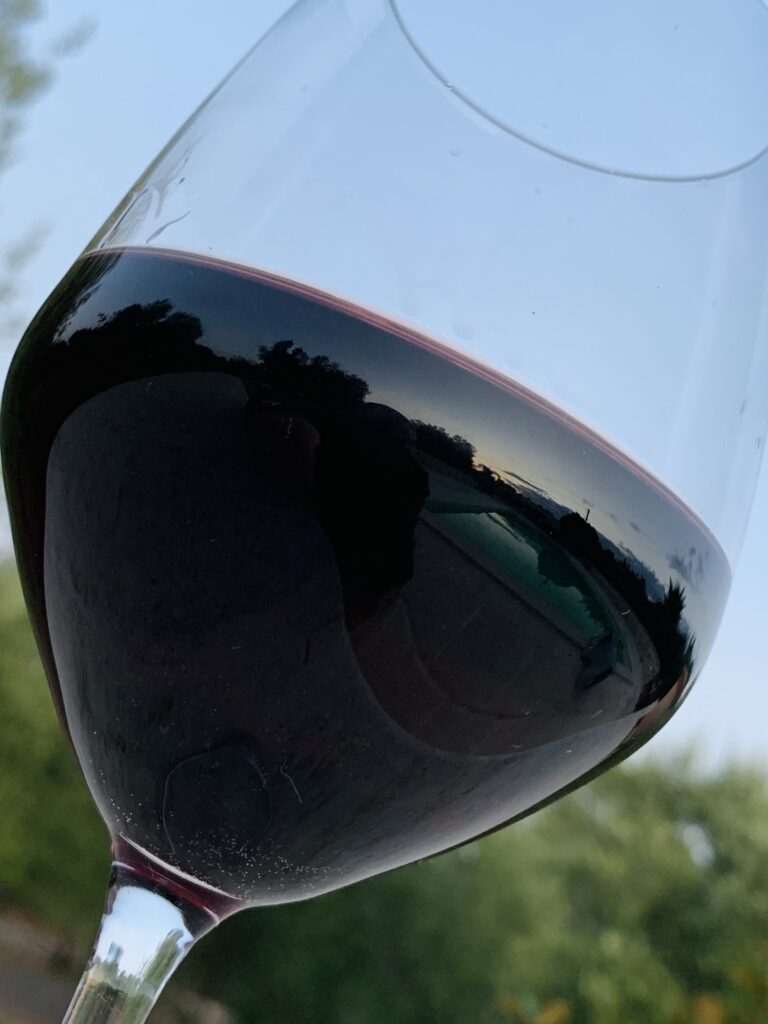
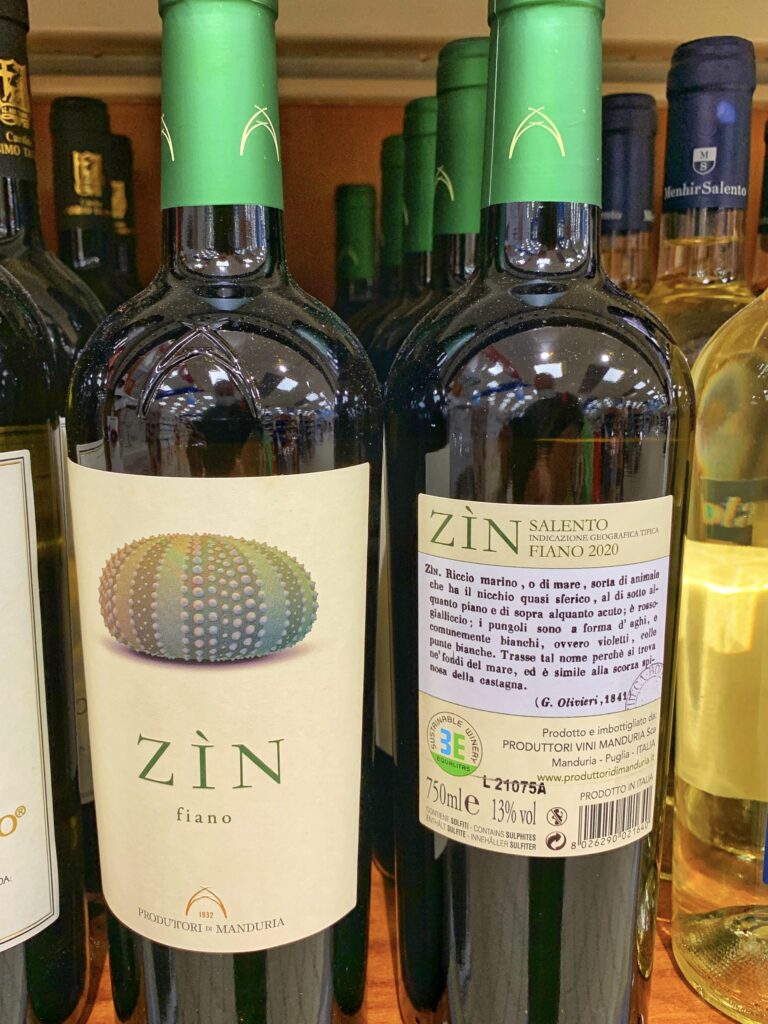
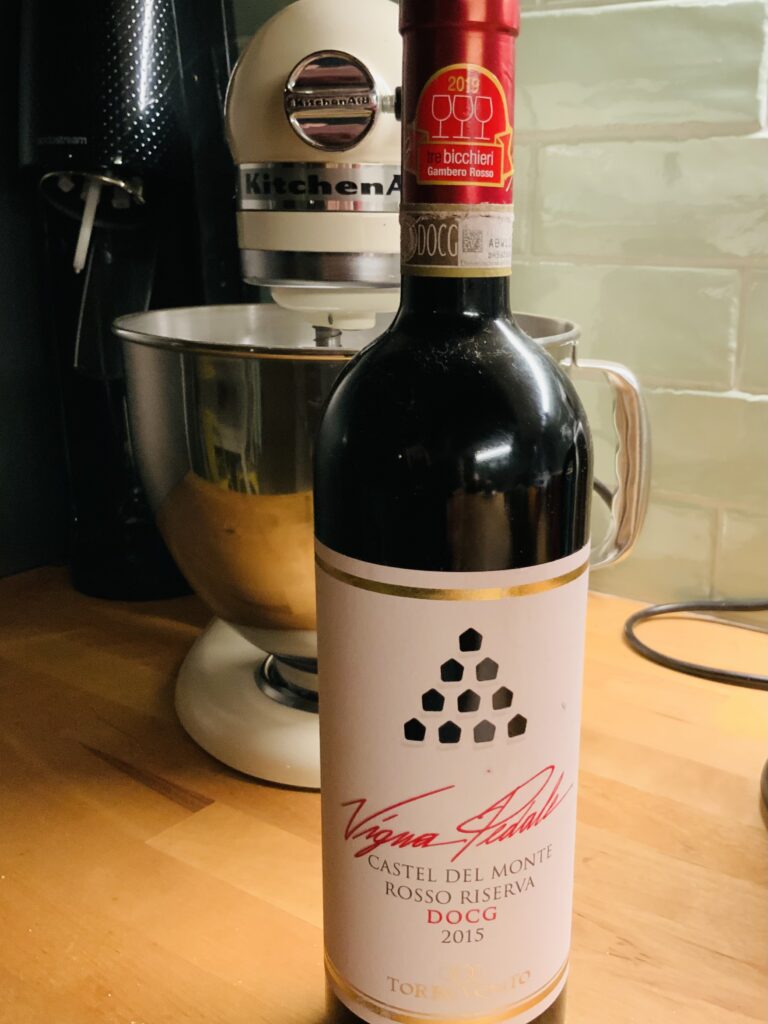
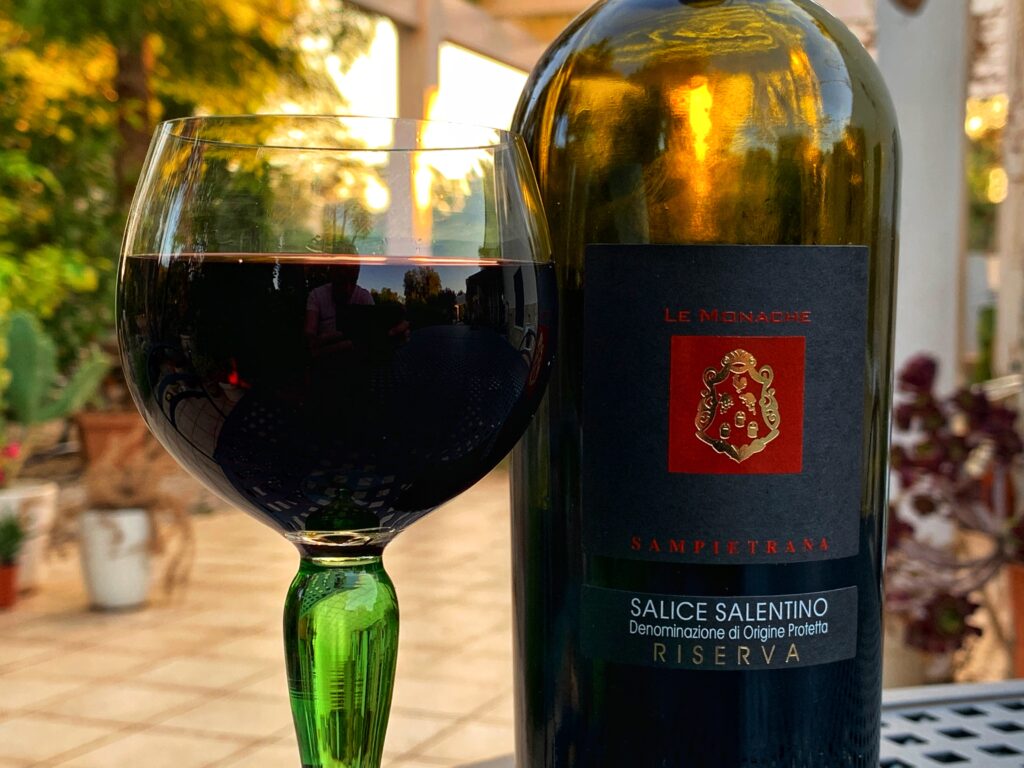
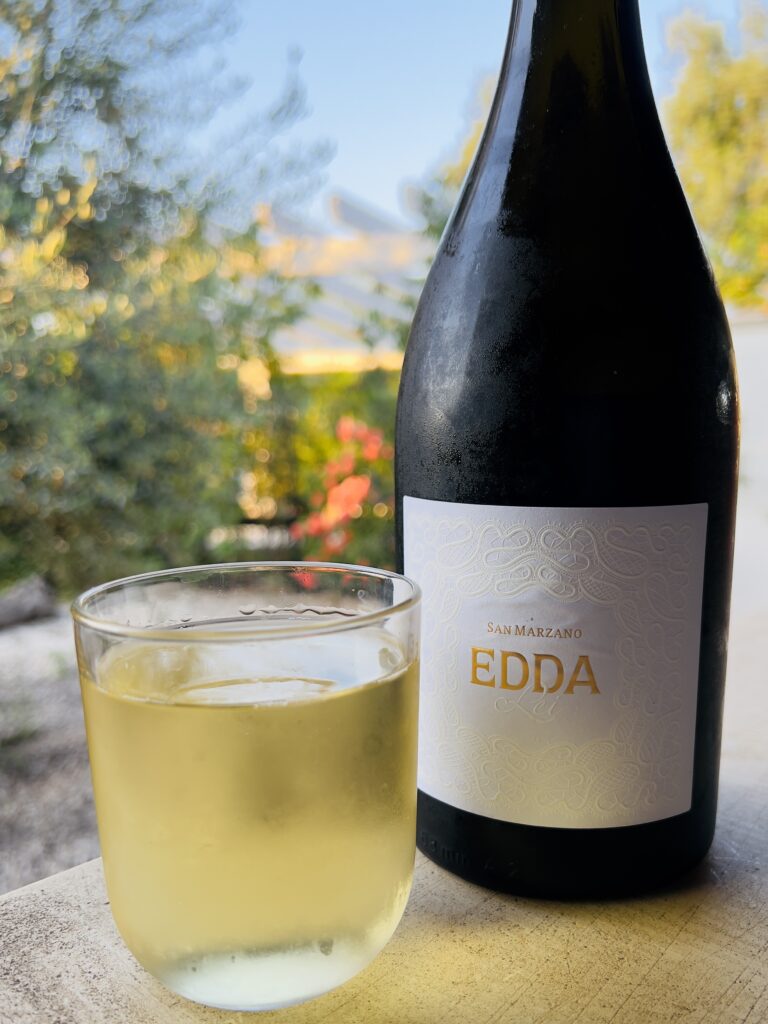
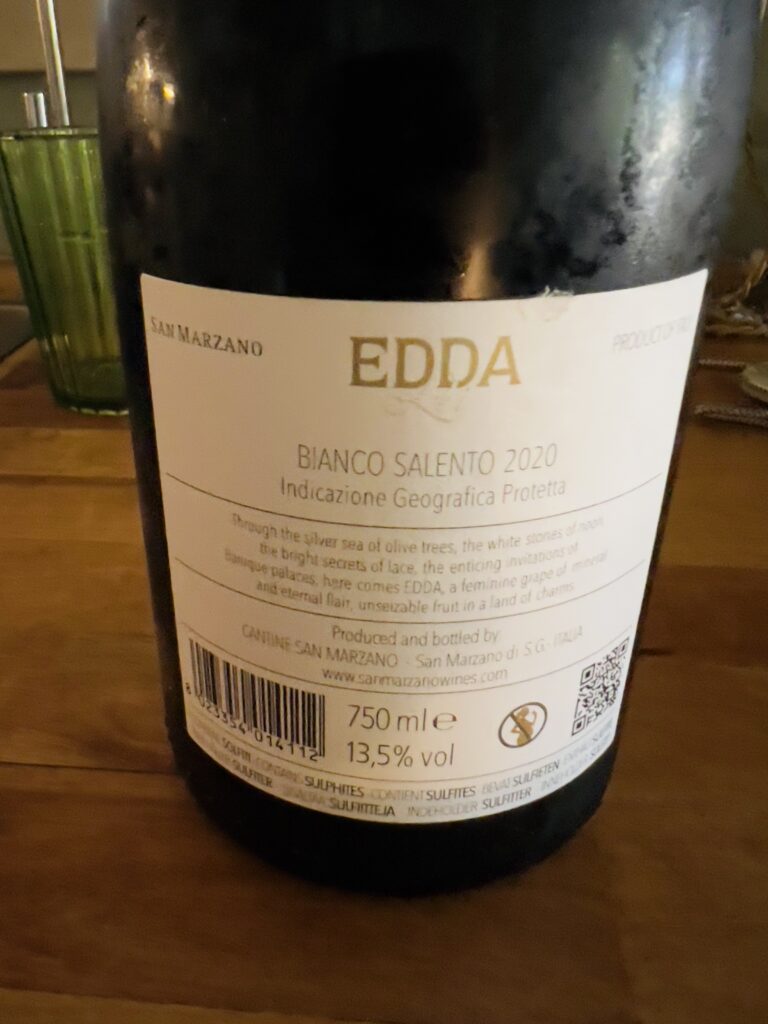
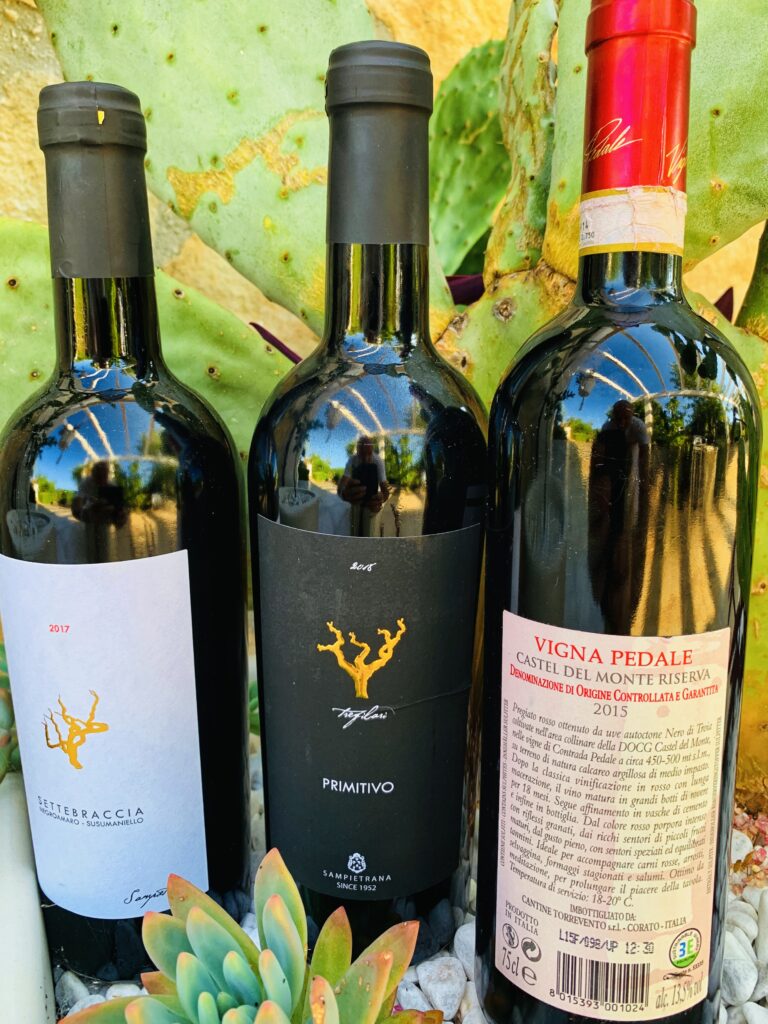
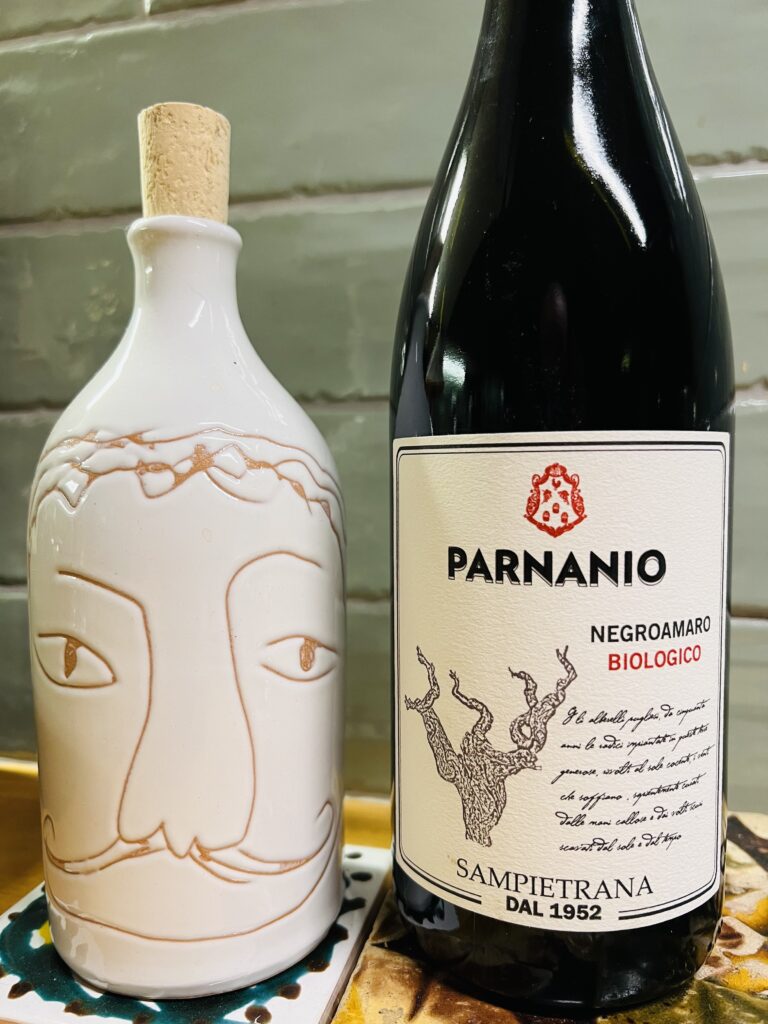
The prices referenced are from Enoteca Vini di Puglia, as at March 2023. All of these wines are very good, and are the wines we have at home. We have never been disappointed.
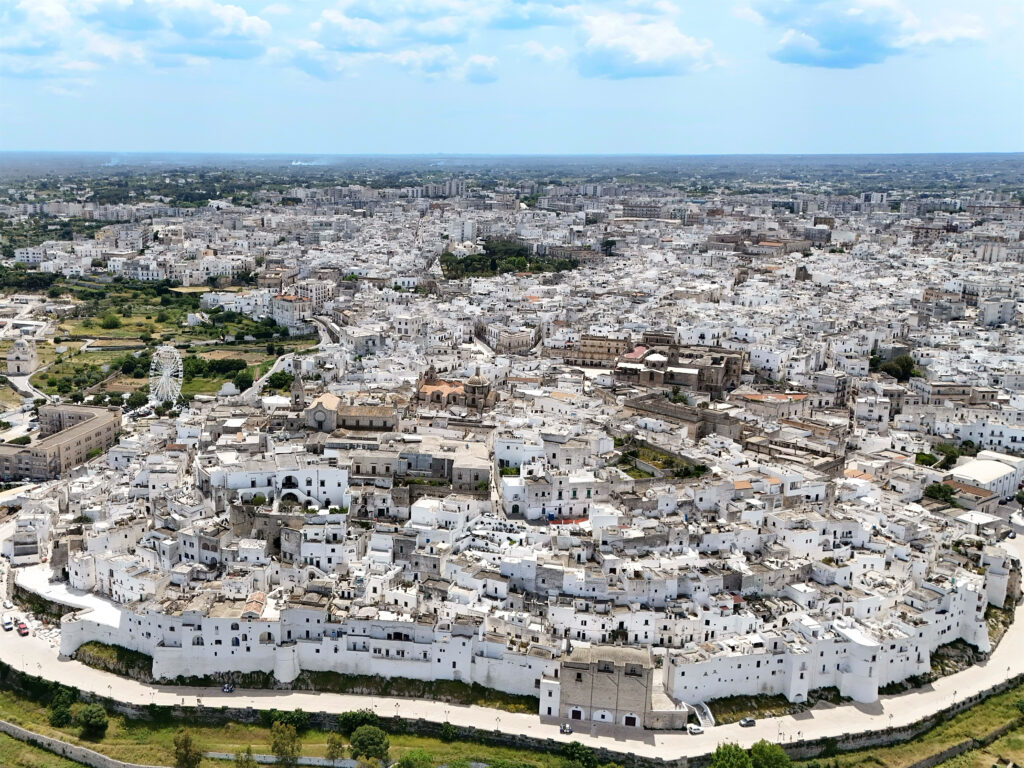



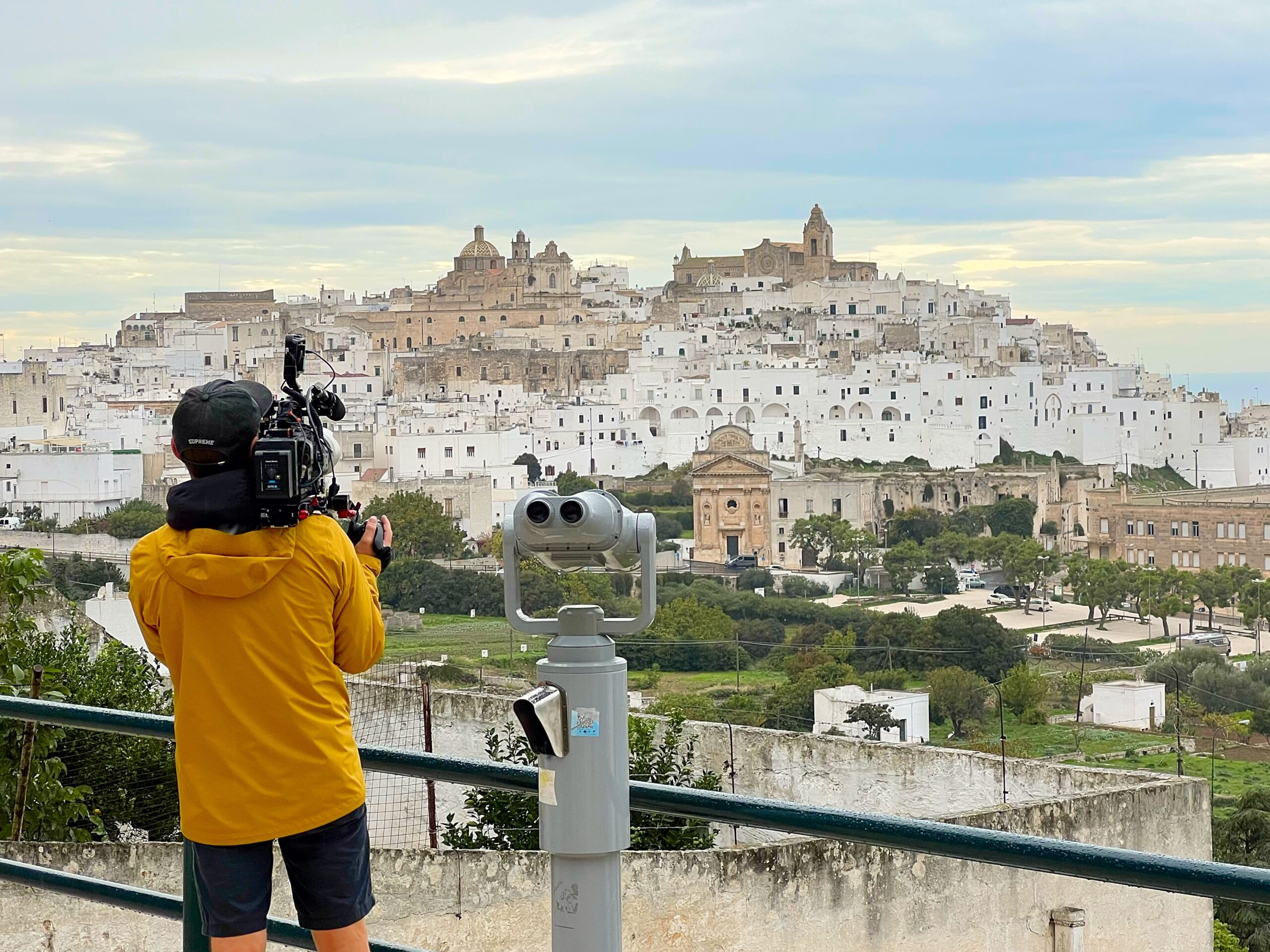
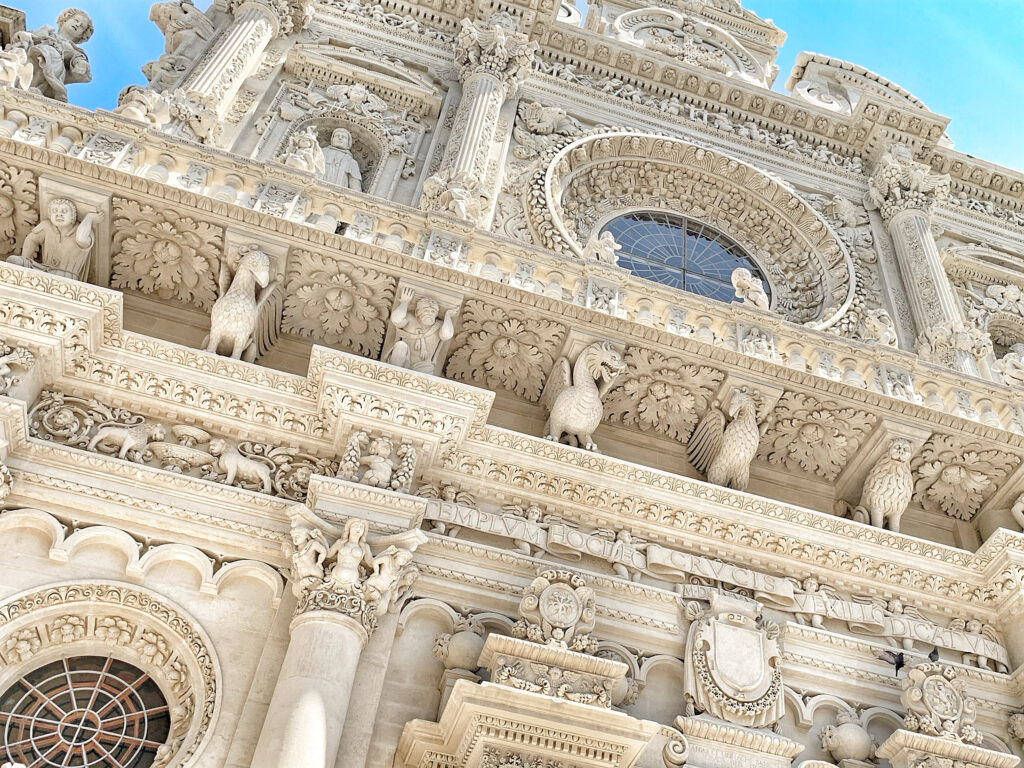
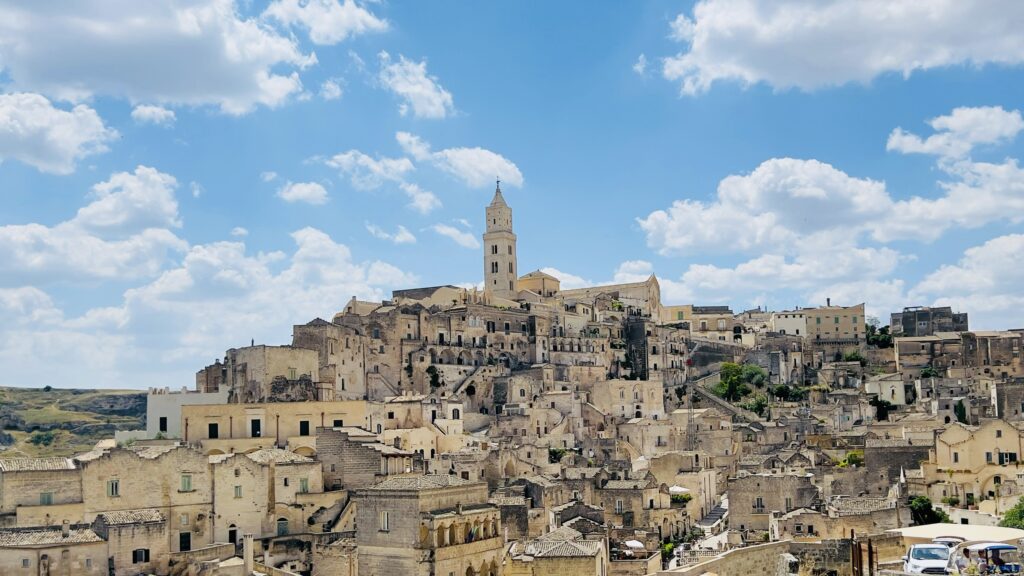
Buongiorno,
Vorrei il vostro consiglio per favore. Vogliamo venire in Puglia per 10 giorni ad Aprile. Pensiamo di stare in due posti. Cerciamo due belli alberghi, uno vicino il mare. Grazie per il vostro aiuto.
Ciao. This guide has all our thoughts on where to base yourself depending on your requirements (sea, city, countryside and whether you have a car or rely on public transport).
Ciao. In questa guida sono raccolte tutte le nostre riflessioni su dove alloggiare a seconda delle vostre esigenze (mare, città, campagna e se avete un’auto o vi affidate ai mezzi pubblici).
Enjoy!
https://www.pugliaguys.com/where-to-base-yourself/
Hello
Do you know of any festivals during the month of July , in Puglia ?
All summer long the various towns and cities have their Patron Saint festivals. The most impressive and famous is Scorrano known for its light and sound show. This is part of the civil celebrations, which includes a food festival. Side by side there are religious parades and celebrations. People visit from all over the world for Scorrano.
https://www.hdsalento.com/luminarie-del-salento/
As we said, these take place across Puglia all summer long. As do the sagre food festivals. We explain what they are in this article:
https://www.gaypugliapodcast.com/mainguides/foodfestivals/
In July there will be:
Patronal Feast of Santa Domenica in Scorrano (LE) in Puglia
Feast of San Vito in San Vito dei Normanni (BR) in Puglia
Festa Madonna del Carmine in Tuglie (LE) in Puglia
Feast of the Madonna del Carminein Apricena (FG) in Puglia
Patronal feast in honor of the patron saints Vito and Vincenzo in San Vito dei Normanni (BR) in Puglia
Historical parade of S. Margherita in Latiano (BR) in Puglia
Sagra te lu ranu in Merine (LE) in Puglia
Sagra ta Turre in Ugento (LE) in Puglia
Country festival Maria SS. Di Mellitto with floral floats parade in Grumo Apulla (BA) in Puglia
Among the other events held in July in Puglia are:
Palio dei capatosta – the challenge between the districts in Mola di Bari (BA) in Puglia
Tango Festival in Trani (BA) in Puglia
Pizzica in festa in Sternatia (LE) in Puglia
Assaprà Festival in Corato (BA) in Puglia
Festival Music Mundi in Grottaglie (TA) in Puglia
Summer Massafra Carnival in Massafra (TA) in Puglia
Wine is Music in Grottaglie (TA) in Puglia
Festa te la uliata in Caprarica di Lecce (LE) in Puglia
Festival of Lecce pasticciotto and Mediterranean flavors in Surano (LE) in Puglia
Summer Putignano Carnival in Putignano (BA) in Puglia
Troia Teatro Festival in Troia (FG) in Puglia
One of our favourites is the Coreutica festival, which is a celebration of pizzica, the music and dance of Salento. Again, combined with food, there are dance and music workshops, and free exhibitions and performances. It also includes street dancing for the public:
https://youtu.be/omnCyTiyFNQ?si=bquCOo9uV3OPnrYE
In due course info for 2024 will be added to their website:
https://www.worldmusicacademy.it/coreutica-2023/
Hope that helps.
LuigiMax